Tim Notier's Blog, page 6
May 15, 2021
Reflecting on Africa in America
The Notier Notes Our Sunday Scoop  Please note that this week we've switched our email subscription service provider. We would love to hear your feedback on how it looks on your device! If you see any problems or glitches (screen width / color / font readability) please let us know at notiersfrontiers@outlook.com. One thing is for certain - traveling is not just a physical journey, but a mental one too. We've been on the road for years on end, but it still never ceases to amaze me how sometimes my worldview of what I thought was true can be shattered to pieces in a matter of moments. Or I realize that I had once been so naïve to think a certain way, and now a new place has taught me differently.
Please note that this week we've switched our email subscription service provider. We would love to hear your feedback on how it looks on your device! If you see any problems or glitches (screen width / color / font readability) please let us know at notiersfrontiers@outlook.com. One thing is for certain - traveling is not just a physical journey, but a mental one too. We've been on the road for years on end, but it still never ceases to amaze me how sometimes my worldview of what I thought was true can be shattered to pieces in a matter of moments. Or I realize that I had once been so naïve to think a certain way, and now a new place has taught me differently.
But perhaps the strangest of all these epiphanies are the ones that happen when I come back home. This is our first week back in Chicago after having been in Africa for more than a year and a half, and not only are things here strange due to the changes from the pandemic, but some completely ordinary things seem very weird to me now. For example, after successfully picking up our bike at the airport a few days ago (check out our YouTube video above for more on that), our first real "ride" was a forty minute journey to drop off our carnet, and it was a very normal trip that felt quite unusual for me.
First of all, if you don't know what a carnet is, it's an extremely expensive document that we used for the importation our motorcycle in Africa. And it just so happens that the carnet office for all of North America is forty minutes from where we live. So instead of praying that our valuable document would make it to its destination via FedEx or UPS, we decided to just bring it there ourselves, and also get the wheels spinning on the motorcycle again.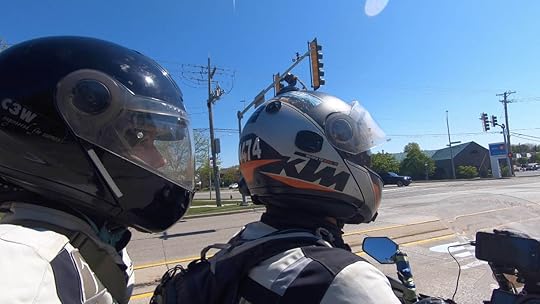 It was a beautiful day, and a very pretty ride, and it was also the first day that I started to feel human again. We had been so jet-lagged, exhausted, stressed about the trip and the bike, that we spent several days just sleeping, eating, and being cranky (Tim was sleepy, I was cranky).
It was a beautiful day, and a very pretty ride, and it was also the first day that I started to feel human again. We had been so jet-lagged, exhausted, stressed about the trip and the bike, that we spent several days just sleeping, eating, and being cranky (Tim was sleepy, I was cranky).
But I was finally feeling myself again as we rode all the way to the northern suburbs where the fields of tall grasses roll and tumble into little ravines and bogs, and clumps of Midwestern deciduous forests look bright and happy with their spring buds decorating their limbs. And then, shoved between these sections of nature is orderly modern development at its finest - fancy glass office buildings that sparkle in the sun, and artificial ponds with spurting fountains of water spraying into the air. Canadian geese graze through huge useless lawns that have criss-cross patterns from being mowed in just the right way.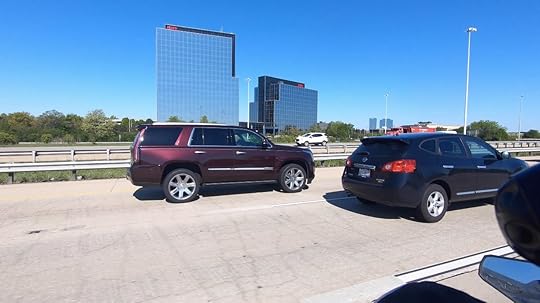 And then there's the housing developments, tucked away from the main roads but still just barely visible through the newly-planted trees that patrol iron gates and stonework signs, all with quaint Old World names like Whispering Oaks, or Silverdown Hills.
And then there's the housing developments, tucked away from the main roads but still just barely visible through the newly-planted trees that patrol iron gates and stonework signs, all with quaint Old World names like Whispering Oaks, or Silverdown Hills.
We actually couldn't find the carnet place at first, and accidentally turned down one of these McMansion roads, and it's not that there's anything wrong with these housing developments. In fact, they're the American dream, and a beautiful dream at that. And these affluent communities certainly made for a gorgeous ride, but the American lifestyle of large spaces and big cars and widescreen TVs was in stark contrast with the typical African lifestyle of tin-roofed homes, cooking on a coal fire, feeding your family rice and corn, walking around town to talk to the neighbors. This place was the perfect American dream. Things are simpler in Africa. You don't need child care because you just pack your kid up with a cloth tied to your back. You don't need shopping centers, because down the street there's someone who sells vegetables, a guy who fixes shoes, and a little shop that sews clothes out of all the brightest fabrics.
This place was the perfect American dream. Things are simpler in Africa. You don't need child care because you just pack your kid up with a cloth tied to your back. You don't need shopping centers, because down the street there's someone who sells vegetables, a guy who fixes shoes, and a little shop that sews clothes out of all the brightest fabrics.  When it rains in Africa and you have a motorcycle, just attach an umbrella to your bike! Some could view the African lifestyle as 'poor', but in truth, it's rich in so many ways. There aren't as many walls that separate family members. Technology still hasn't taken all of their attention from each other. And even during the pandemic, communities were still full of laughter, with children singing and music playing.
When it rains in Africa and you have a motorcycle, just attach an umbrella to your bike! Some could view the African lifestyle as 'poor', but in truth, it's rich in so many ways. There aren't as many walls that separate family members. Technology still hasn't taken all of their attention from each other. And even during the pandemic, communities were still full of laughter, with children singing and music playing.
In America, everything feels a bit more sterile, but with that comes a sigh of relief for the wide open spaces, the cleanliness, and the order. It's wonderful to be back in a world of efficiency, and to be confident that people will stand in line and wait their turn, that the credit card machine will work, and that the electricity will stay on. It feels glorious to throw all our filthy clothes into a giant washing machine, and then even more glorious to put all those clean clothes into a dryer! Hot water comes out of hot water faucets, and we can go to bed without crawling underneath a mosquito net every night. Pure luxury!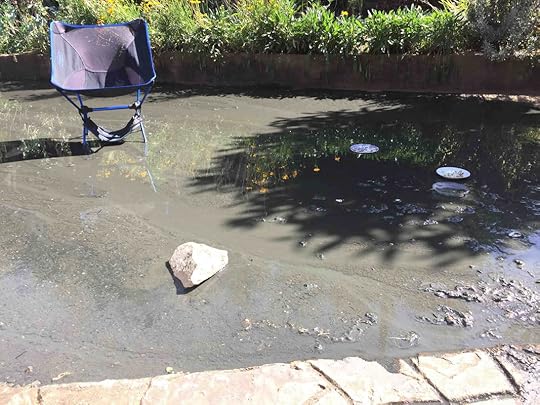 Remember when the sewage backed up and there was a river of feces water outside our front door in Kenya? That was not Africa at its finest. I kept thinking about these contrasts as we finally found our way to the carnet office, and then came the next cultural hurdle - we had to figure out where to park. And that parking lot... it was massive, and completely filled with cars. Sparkly, shiny cars, one after another, rows upon rows, all shades of whites or blacks, or other nondescript colors. And I realized that I hadn't been in a real parking lot in a long time. How did all those people in Africa park their cars without parking lots? Certainly there were cars on the road, but when they weren't on the street, they seemed to all just seep into the scenery, nudging their way into nooks and crannies, or wherever they could fit. But there weren't paved lots designated for cars with painted lines and... just imagine, handicapped spaces!
Remember when the sewage backed up and there was a river of feces water outside our front door in Kenya? That was not Africa at its finest. I kept thinking about these contrasts as we finally found our way to the carnet office, and then came the next cultural hurdle - we had to figure out where to park. And that parking lot... it was massive, and completely filled with cars. Sparkly, shiny cars, one after another, rows upon rows, all shades of whites or blacks, or other nondescript colors. And I realized that I hadn't been in a real parking lot in a long time. How did all those people in Africa park their cars without parking lots? Certainly there were cars on the road, but when they weren't on the street, they seemed to all just seep into the scenery, nudging their way into nooks and crannies, or wherever they could fit. But there weren't paved lots designated for cars with painted lines and... just imagine, handicapped spaces!
Luckily, we had a motorcycle, and were able to fit into a space up at the front. But I'm amazed that anyone can find their cars in lots like that. Maybe Google helps them find where they parked. And then Google probably helps them find their way out of the parking lot. Ahhh... this is America.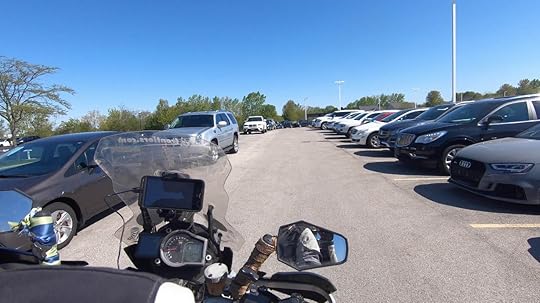 Oh so many cars... It feels good to be back, for sure, but also a little strange. As motorcycle travelers, I would say that our minimalism lifestyle lends itself to being closer to the African way of life than the American one. Besides my motorcycle boots, I have one pair of shoes. I have one jacket, and I buy one bar of soap at a time. But now I have to get used to the idea that at Costco I can buy thirty bars of soap at once so I can throw the box in a closet and have a year's supply. Here in America, I can have a year's supply of almost anything, and certainly during the pandemic, that's how many people lived.
Oh so many cars... It feels good to be back, for sure, but also a little strange. As motorcycle travelers, I would say that our minimalism lifestyle lends itself to being closer to the African way of life than the American one. Besides my motorcycle boots, I have one pair of shoes. I have one jacket, and I buy one bar of soap at a time. But now I have to get used to the idea that at Costco I can buy thirty bars of soap at once so I can throw the box in a closet and have a year's supply. Here in America, I can have a year's supply of almost anything, and certainly during the pandemic, that's how many people lived.
So it may feel a little weird for us right now, but when I get to take a hot shower with good water pressure whenever I want, I just remember that sometimes it's a wonderful thing to be back home. And other times, when we find ourselves in the hustle and bustle of everyday life here in the States, I yearn to be back in Kenya, petting our two kittens as we wrote books and played guitar to each other. I have come to fully realize the statement that the grass is always greener on the other side, but it is just as hard to mow.
Check out our latest videos below (An Ode to African Roads: Part 2 is my personal favorite because of all the footage of our adventures with the Maasai people of Tanzania). And I'll be seeing you again next week as we hopefully get out on the bike again and test some of our new gear that we got!
See you then! Subscribe to Our YouTube Channel
 Please note that this week we've switched our email subscription service provider. We would love to hear your feedback on how it looks on your device! If you see any problems or glitches (screen width / color / font readability) please let us know at notiersfrontiers@outlook.com. One thing is for certain - traveling is not just a physical journey, but a mental one too. We've been on the road for years on end, but it still never ceases to amaze me how sometimes my worldview of what I thought was true can be shattered to pieces in a matter of moments. Or I realize that I had once been so naïve to think a certain way, and now a new place has taught me differently.
Please note that this week we've switched our email subscription service provider. We would love to hear your feedback on how it looks on your device! If you see any problems or glitches (screen width / color / font readability) please let us know at notiersfrontiers@outlook.com. One thing is for certain - traveling is not just a physical journey, but a mental one too. We've been on the road for years on end, but it still never ceases to amaze me how sometimes my worldview of what I thought was true can be shattered to pieces in a matter of moments. Or I realize that I had once been so naïve to think a certain way, and now a new place has taught me differently.But perhaps the strangest of all these epiphanies are the ones that happen when I come back home. This is our first week back in Chicago after having been in Africa for more than a year and a half, and not only are things here strange due to the changes from the pandemic, but some completely ordinary things seem very weird to me now. For example, after successfully picking up our bike at the airport a few days ago (check out our YouTube video above for more on that), our first real "ride" was a forty minute journey to drop off our carnet, and it was a very normal trip that felt quite unusual for me.
First of all, if you don't know what a carnet is, it's an extremely expensive document that we used for the importation our motorcycle in Africa. And it just so happens that the carnet office for all of North America is forty minutes from where we live. So instead of praying that our valuable document would make it to its destination via FedEx or UPS, we decided to just bring it there ourselves, and also get the wheels spinning on the motorcycle again.
 It was a beautiful day, and a very pretty ride, and it was also the first day that I started to feel human again. We had been so jet-lagged, exhausted, stressed about the trip and the bike, that we spent several days just sleeping, eating, and being cranky (Tim was sleepy, I was cranky).
It was a beautiful day, and a very pretty ride, and it was also the first day that I started to feel human again. We had been so jet-lagged, exhausted, stressed about the trip and the bike, that we spent several days just sleeping, eating, and being cranky (Tim was sleepy, I was cranky).But I was finally feeling myself again as we rode all the way to the northern suburbs where the fields of tall grasses roll and tumble into little ravines and bogs, and clumps of Midwestern deciduous forests look bright and happy with their spring buds decorating their limbs. And then, shoved between these sections of nature is orderly modern development at its finest - fancy glass office buildings that sparkle in the sun, and artificial ponds with spurting fountains of water spraying into the air. Canadian geese graze through huge useless lawns that have criss-cross patterns from being mowed in just the right way.
 And then there's the housing developments, tucked away from the main roads but still just barely visible through the newly-planted trees that patrol iron gates and stonework signs, all with quaint Old World names like Whispering Oaks, or Silverdown Hills.
And then there's the housing developments, tucked away from the main roads but still just barely visible through the newly-planted trees that patrol iron gates and stonework signs, all with quaint Old World names like Whispering Oaks, or Silverdown Hills.We actually couldn't find the carnet place at first, and accidentally turned down one of these McMansion roads, and it's not that there's anything wrong with these housing developments. In fact, they're the American dream, and a beautiful dream at that. And these affluent communities certainly made for a gorgeous ride, but the American lifestyle of large spaces and big cars and widescreen TVs was in stark contrast with the typical African lifestyle of tin-roofed homes, cooking on a coal fire, feeding your family rice and corn, walking around town to talk to the neighbors.
 This place was the perfect American dream. Things are simpler in Africa. You don't need child care because you just pack your kid up with a cloth tied to your back. You don't need shopping centers, because down the street there's someone who sells vegetables, a guy who fixes shoes, and a little shop that sews clothes out of all the brightest fabrics.
This place was the perfect American dream. Things are simpler in Africa. You don't need child care because you just pack your kid up with a cloth tied to your back. You don't need shopping centers, because down the street there's someone who sells vegetables, a guy who fixes shoes, and a little shop that sews clothes out of all the brightest fabrics.  When it rains in Africa and you have a motorcycle, just attach an umbrella to your bike! Some could view the African lifestyle as 'poor', but in truth, it's rich in so many ways. There aren't as many walls that separate family members. Technology still hasn't taken all of their attention from each other. And even during the pandemic, communities were still full of laughter, with children singing and music playing.
When it rains in Africa and you have a motorcycle, just attach an umbrella to your bike! Some could view the African lifestyle as 'poor', but in truth, it's rich in so many ways. There aren't as many walls that separate family members. Technology still hasn't taken all of their attention from each other. And even during the pandemic, communities were still full of laughter, with children singing and music playing.In America, everything feels a bit more sterile, but with that comes a sigh of relief for the wide open spaces, the cleanliness, and the order. It's wonderful to be back in a world of efficiency, and to be confident that people will stand in line and wait their turn, that the credit card machine will work, and that the electricity will stay on. It feels glorious to throw all our filthy clothes into a giant washing machine, and then even more glorious to put all those clean clothes into a dryer! Hot water comes out of hot water faucets, and we can go to bed without crawling underneath a mosquito net every night. Pure luxury!
 Remember when the sewage backed up and there was a river of feces water outside our front door in Kenya? That was not Africa at its finest. I kept thinking about these contrasts as we finally found our way to the carnet office, and then came the next cultural hurdle - we had to figure out where to park. And that parking lot... it was massive, and completely filled with cars. Sparkly, shiny cars, one after another, rows upon rows, all shades of whites or blacks, or other nondescript colors. And I realized that I hadn't been in a real parking lot in a long time. How did all those people in Africa park their cars without parking lots? Certainly there were cars on the road, but when they weren't on the street, they seemed to all just seep into the scenery, nudging their way into nooks and crannies, or wherever they could fit. But there weren't paved lots designated for cars with painted lines and... just imagine, handicapped spaces!
Remember when the sewage backed up and there was a river of feces water outside our front door in Kenya? That was not Africa at its finest. I kept thinking about these contrasts as we finally found our way to the carnet office, and then came the next cultural hurdle - we had to figure out where to park. And that parking lot... it was massive, and completely filled with cars. Sparkly, shiny cars, one after another, rows upon rows, all shades of whites or blacks, or other nondescript colors. And I realized that I hadn't been in a real parking lot in a long time. How did all those people in Africa park their cars without parking lots? Certainly there were cars on the road, but when they weren't on the street, they seemed to all just seep into the scenery, nudging their way into nooks and crannies, or wherever they could fit. But there weren't paved lots designated for cars with painted lines and... just imagine, handicapped spaces!Luckily, we had a motorcycle, and were able to fit into a space up at the front. But I'm amazed that anyone can find their cars in lots like that. Maybe Google helps them find where they parked. And then Google probably helps them find their way out of the parking lot. Ahhh... this is America.
 Oh so many cars... It feels good to be back, for sure, but also a little strange. As motorcycle travelers, I would say that our minimalism lifestyle lends itself to being closer to the African way of life than the American one. Besides my motorcycle boots, I have one pair of shoes. I have one jacket, and I buy one bar of soap at a time. But now I have to get used to the idea that at Costco I can buy thirty bars of soap at once so I can throw the box in a closet and have a year's supply. Here in America, I can have a year's supply of almost anything, and certainly during the pandemic, that's how many people lived.
Oh so many cars... It feels good to be back, for sure, but also a little strange. As motorcycle travelers, I would say that our minimalism lifestyle lends itself to being closer to the African way of life than the American one. Besides my motorcycle boots, I have one pair of shoes. I have one jacket, and I buy one bar of soap at a time. But now I have to get used to the idea that at Costco I can buy thirty bars of soap at once so I can throw the box in a closet and have a year's supply. Here in America, I can have a year's supply of almost anything, and certainly during the pandemic, that's how many people lived.So it may feel a little weird for us right now, but when I get to take a hot shower with good water pressure whenever I want, I just remember that sometimes it's a wonderful thing to be back home. And other times, when we find ourselves in the hustle and bustle of everyday life here in the States, I yearn to be back in Kenya, petting our two kittens as we wrote books and played guitar to each other. I have come to fully realize the statement that the grass is always greener on the other side, but it is just as hard to mow.
Check out our latest videos below (An Ode to African Roads: Part 2 is my personal favorite because of all the footage of our adventures with the Maasai people of Tanzania). And I'll be seeing you again next week as we hopefully get out on the bike again and test some of our new gear that we got!
See you then! Subscribe to Our YouTube Channel
Published on May 15, 2021 16:49
May 9, 2021
Coming Back to America
By Marisa Notier The Notier Notes Our Sunday Scoop 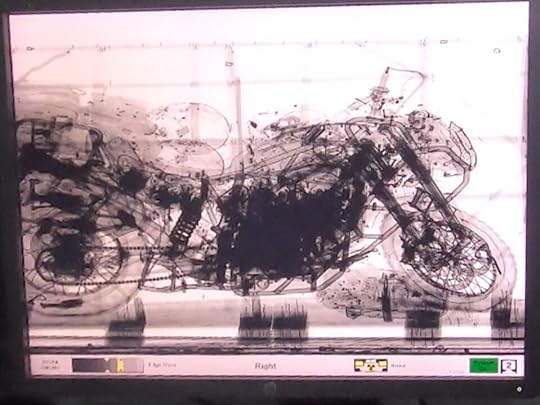 Getting ourselves from Africa to America during a pandemic is hard enough. Getting our motorcycle across continents is even harder. But we were fortunate with the people who helped us, even though the entire process really tested our patience, and certainly emptied our wallets.
Getting ourselves from Africa to America during a pandemic is hard enough. Getting our motorcycle across continents is even harder. But we were fortunate with the people who helped us, even though the entire process really tested our patience, and certainly emptied our wallets.
Starting with the motorcycle, there's a lot of things that can go wrong. When it comes to flying a motorcycle via airfreight, you don't actually know how much you're going to pay until the bike is crated up, has passed customs, and is ready to go on the plane. This is because the cost is based on the final dimensions of the crate which is hand-built around the bike. So we could only get estimates beforehand, and the numbers that people were getting back to us varied by thousands of dollars. Sometimes even the same clearing agent would change his price by a couple grand overnight due to some "unforeseen" cost.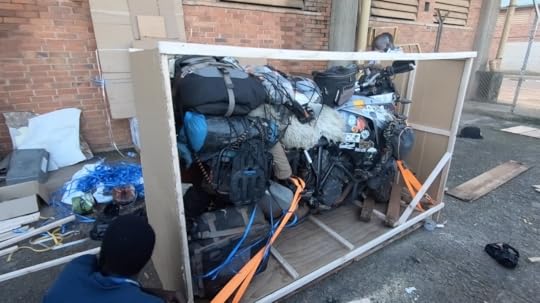 Some airlines don't require motorcycles to be crated. But from Africa they certainly do. I think I overestimate people's abilities to do math sometimes. In the US, even the most math-opposed employee will be given a spreadsheet that calculates the costs of a quote for him or her. But in Africa, where these spreadsheets seem to be rarely used, people are doing all the calculations by hand, and after double-checking their work, we frequently find discrepancies. Normally I don't mind when our bill is off for a restaurant meal or grocery payment, but when it comes to spending lots of money, these miscalculations are very disconcerting.
Some airlines don't require motorcycles to be crated. But from Africa they certainly do. I think I overestimate people's abilities to do math sometimes. In the US, even the most math-opposed employee will be given a spreadsheet that calculates the costs of a quote for him or her. But in Africa, where these spreadsheets seem to be rarely used, people are doing all the calculations by hand, and after double-checking their work, we frequently find discrepancies. Normally I don't mind when our bill is off for a restaurant meal or grocery payment, but when it comes to spending lots of money, these miscalculations are very disconcerting.
After weeks of negotiating with different agents, all with different competencies, we finally found the right one - Godfrey (Godfrey the Godsend I like to call him). He was able to get us accurate prices, and was honest about all the fees right from the beginning. We did a high estimate and a low estimate for flying the motorcycle, and felt satisfied about paying anywhere between the two.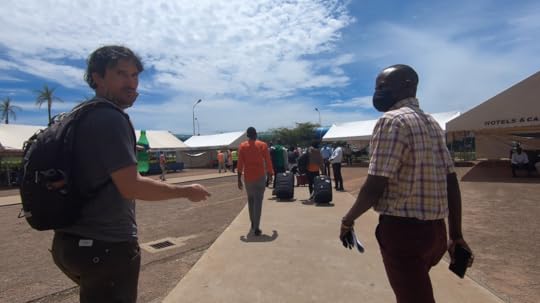 Tim and Godfrey the Godsend Next was crating up the motorcycle and getting it cleared through customs. We brought the bike in days early just because we knew that these things would take a while, but we had no idea just how long they would take.
Tim and Godfrey the Godsend Next was crating up the motorcycle and getting it cleared through customs. We brought the bike in days early just because we knew that these things would take a while, but we had no idea just how long they would take.
We figured crating up the motorcycle would take four hours maximum. It took eight.
We thought getting the bike through customs would be a two hour process. All in all, we were at the cargo area of the airport in Uganda for eleven hours. It's a good thing we brought the motorcycle in early!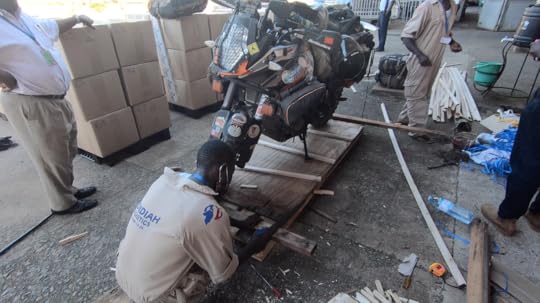 The carpenters were all using hand tools and used equipment. Why did it take eight hours for a team of people to build a wooden box around a motorcycle? Well, part of the problem was that the crate makers did not have proper tools. They had one hammer that was a hammer head welded onto a pipe. They didn't have any power tools, and only a hand saw to cut their wood. Plus, all of their materials had been previously used, from the pallets to the wood to the nails. Ah yes, and the nails... since they were used, each one was rusty and crooked and had to be straightened out before every hammer swing. These people were certainly resourceful and skilled, but everything they did just took much longer than expected.
The carpenters were all using hand tools and used equipment. Why did it take eight hours for a team of people to build a wooden box around a motorcycle? Well, part of the problem was that the crate makers did not have proper tools. They had one hammer that was a hammer head welded onto a pipe. They didn't have any power tools, and only a hand saw to cut their wood. Plus, all of their materials had been previously used, from the pallets to the wood to the nails. Ah yes, and the nails... since they were used, each one was rusty and crooked and had to be straightened out before every hammer swing. These people were certainly resourceful and skilled, but everything they did just took much longer than expected. 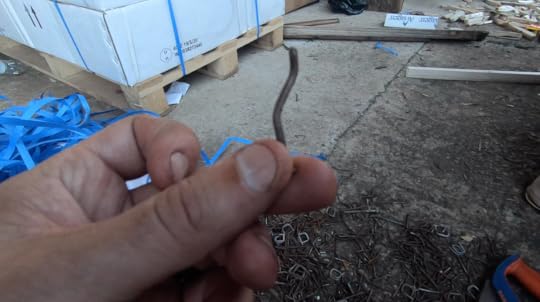 Pretty much every nail was crooked like this. But despite all the disadvantages these Ugandan builders had, they did everything with a smile, and they really enjoyed their work. Tim was very insistent that they had to make the crate small, since we were paying by the crate's dimensions, and even though these were tight parameters, they did exactly as we asked. By the end of their work, the crate was even a few centimeters smaller than we had specified! So the quality of their craftsmanship was worth every extra hour, as we ended up paying our lowest estimated price!
Pretty much every nail was crooked like this. But despite all the disadvantages these Ugandan builders had, they did everything with a smile, and they really enjoyed their work. Tim was very insistent that they had to make the crate small, since we were paying by the crate's dimensions, and even though these were tight parameters, they did exactly as we asked. By the end of their work, the crate was even a few centimeters smaller than we had specified! So the quality of their craftsmanship was worth every extra hour, as we ended up paying our lowest estimated price!
Finally, the crate had to be x-rayed and scanned, which is normally done behind-the-scenes, but this time, Tim actually got the opportunity to go back there and watch them scan the bike. This was a very cool experience since it was a bit like one of those cartoon x-rays where the person walks behind a screen and turns into a skeleton. They put the bike into the scanner and the image that was relayed back looked like an artist's sketch of a motorcycle.
The video of it is pretty impressive, and you can check it out, along with the entire crating process, in the video below. At last, the motorcycle was ready to fly out. We had done our mental checklist - windshield off, battery disconnected, practically no gas in the tank, all batteries and super glue taken out of the luggage... we were good to go.
And now we just had to get ourselves to Chicago as quickly as possible so that we could be there to pick up the bike when it landed.
We got another Covid test (this time in the throat as opposed to the nose, which was much better), and we said our goodbyes to the wonderful friends we had made in Uganda. Cathy, the owner of the hotel we were staying at, even drove us to the airport.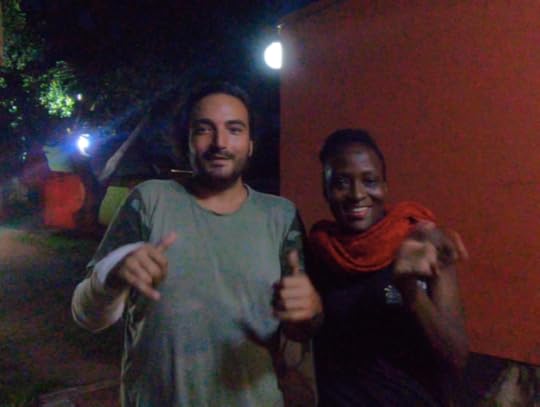 Our friends, Saroush and Karen.
Our friends, Saroush and Karen. 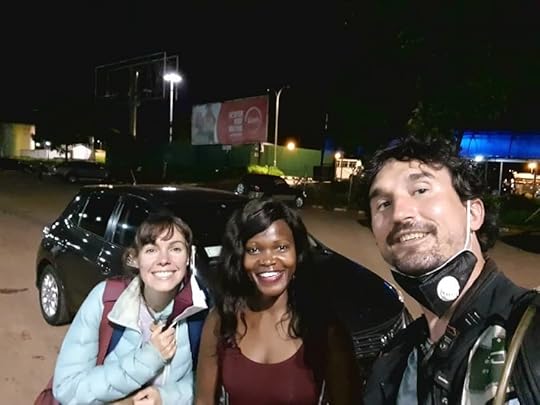 Me, Cathy, and Tim at Entebbe Airport, Uganda It's always bittersweet to be moving on, but this early end to our Africa trip was particularly bitter in that we had originally aspired to get all the way through Egypt. But of course, now we were leaving from the middle of Africa, and we were traveling by plane as opposed to overlanding. There was something sad about it all, like I could feel the heaviness of having not completed our great African journey like a weighty failure on my shoulders. But with Ethiopia closed, and a pandemic still shutting down borders around the world, we knew we really had no choice.
Me, Cathy, and Tim at Entebbe Airport, Uganda It's always bittersweet to be moving on, but this early end to our Africa trip was particularly bitter in that we had originally aspired to get all the way through Egypt. But of course, now we were leaving from the middle of Africa, and we were traveling by plane as opposed to overlanding. There was something sad about it all, like I could feel the heaviness of having not completed our great African journey like a weighty failure on my shoulders. But with Ethiopia closed, and a pandemic still shutting down borders around the world, we knew we really had no choice.
And so with a sadness in our hearts, and while trying to keep our chins up, we boarded our first plane that would bring us back home.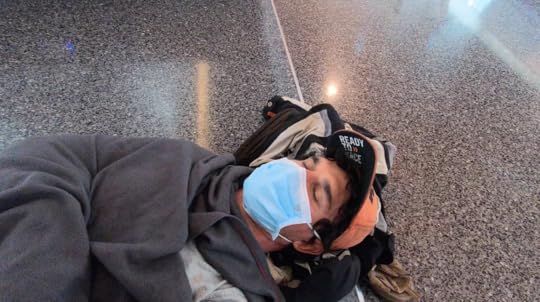 Tim getting some shut-eye on our layover in Qatar. First we flew to Doha, Qatar, and that was a short five hour flight. But the direct flight from Qatar to Chicago was fifteen hours long! That's certainly the longest flight I'd ever been on, and we were extremely thankful that the plane wasn't completely full and we were able to have three seats to ourselves.
Tim getting some shut-eye on our layover in Qatar. First we flew to Doha, Qatar, and that was a short five hour flight. But the direct flight from Qatar to Chicago was fifteen hours long! That's certainly the longest flight I'd ever been on, and we were extremely thankful that the plane wasn't completely full and we were able to have three seats to ourselves. 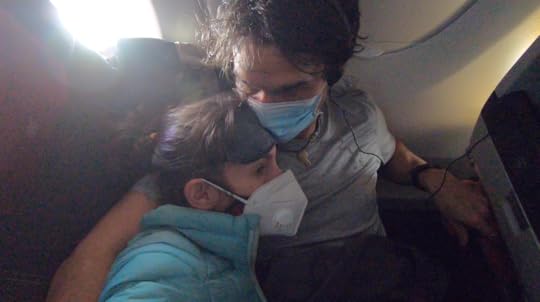 We were even able to lay down (sort of) on the airplane! The view coming into Chicago was beautiful... the city skyscrapers looked like little lego pieces stacked beside the shimmering blue expanse of Lake Michigan. It was glorious, and it felt good to be home (though it's a little cold here for my liking).
We were even able to lay down (sort of) on the airplane! The view coming into Chicago was beautiful... the city skyscrapers looked like little lego pieces stacked beside the shimmering blue expanse of Lake Michigan. It was glorious, and it felt good to be home (though it's a little cold here for my liking). 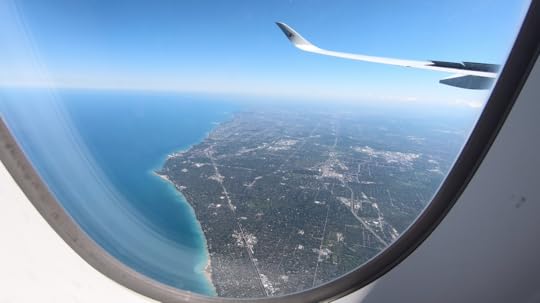 It's hard to see in this picture, but that's downtown Chicago down there next to the lake.
It's hard to see in this picture, but that's downtown Chicago down there next to the lake. 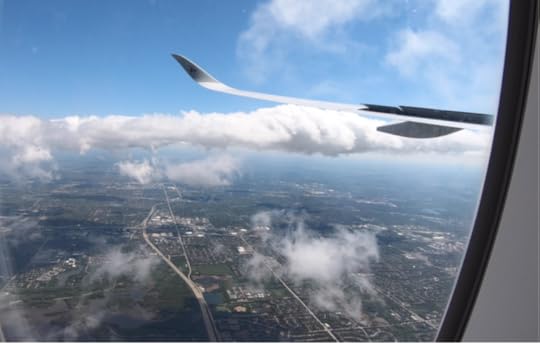 Once on land again, we immediately got our vaccines, but have been feeling jet-lagged and fatigued ever since. We keep waking up at 3am, and then can't keep our eyes open after 5pm. Plus we're quarantining, which makes Mother's Day particularly hard since neither of us are going to be seeing our mothers today. We're so close, but still so far. But we know the time will soon come when we'll be able to see everyone without worry, and we're much closer to that moment than we were a few days ago from Africa.
Once on land again, we immediately got our vaccines, but have been feeling jet-lagged and fatigued ever since. We keep waking up at 3am, and then can't keep our eyes open after 5pm. Plus we're quarantining, which makes Mother's Day particularly hard since neither of us are going to be seeing our mothers today. We're so close, but still so far. But we know the time will soon come when we'll be able to see everyone without worry, and we're much closer to that moment than we were a few days ago from Africa.
We'll be picking up the motorcycle tomorrow! And then we plan on doing a few local adventures here in Illinois as the weather warms up, so stay tuned!
And check out some of our other videos from this week: Until next time! Subscribe to Our YouTube Channel Subscribe to Our Blog
 Getting ourselves from Africa to America during a pandemic is hard enough. Getting our motorcycle across continents is even harder. But we were fortunate with the people who helped us, even though the entire process really tested our patience, and certainly emptied our wallets.
Getting ourselves from Africa to America during a pandemic is hard enough. Getting our motorcycle across continents is even harder. But we were fortunate with the people who helped us, even though the entire process really tested our patience, and certainly emptied our wallets.Starting with the motorcycle, there's a lot of things that can go wrong. When it comes to flying a motorcycle via airfreight, you don't actually know how much you're going to pay until the bike is crated up, has passed customs, and is ready to go on the plane. This is because the cost is based on the final dimensions of the crate which is hand-built around the bike. So we could only get estimates beforehand, and the numbers that people were getting back to us varied by thousands of dollars. Sometimes even the same clearing agent would change his price by a couple grand overnight due to some "unforeseen" cost.
 Some airlines don't require motorcycles to be crated. But from Africa they certainly do. I think I overestimate people's abilities to do math sometimes. In the US, even the most math-opposed employee will be given a spreadsheet that calculates the costs of a quote for him or her. But in Africa, where these spreadsheets seem to be rarely used, people are doing all the calculations by hand, and after double-checking their work, we frequently find discrepancies. Normally I don't mind when our bill is off for a restaurant meal or grocery payment, but when it comes to spending lots of money, these miscalculations are very disconcerting.
Some airlines don't require motorcycles to be crated. But from Africa they certainly do. I think I overestimate people's abilities to do math sometimes. In the US, even the most math-opposed employee will be given a spreadsheet that calculates the costs of a quote for him or her. But in Africa, where these spreadsheets seem to be rarely used, people are doing all the calculations by hand, and after double-checking their work, we frequently find discrepancies. Normally I don't mind when our bill is off for a restaurant meal or grocery payment, but when it comes to spending lots of money, these miscalculations are very disconcerting.After weeks of negotiating with different agents, all with different competencies, we finally found the right one - Godfrey (Godfrey the Godsend I like to call him). He was able to get us accurate prices, and was honest about all the fees right from the beginning. We did a high estimate and a low estimate for flying the motorcycle, and felt satisfied about paying anywhere between the two.
 Tim and Godfrey the Godsend Next was crating up the motorcycle and getting it cleared through customs. We brought the bike in days early just because we knew that these things would take a while, but we had no idea just how long they would take.
Tim and Godfrey the Godsend Next was crating up the motorcycle and getting it cleared through customs. We brought the bike in days early just because we knew that these things would take a while, but we had no idea just how long they would take.We figured crating up the motorcycle would take four hours maximum. It took eight.
We thought getting the bike through customs would be a two hour process. All in all, we were at the cargo area of the airport in Uganda for eleven hours. It's a good thing we brought the motorcycle in early!
 The carpenters were all using hand tools and used equipment. Why did it take eight hours for a team of people to build a wooden box around a motorcycle? Well, part of the problem was that the crate makers did not have proper tools. They had one hammer that was a hammer head welded onto a pipe. They didn't have any power tools, and only a hand saw to cut their wood. Plus, all of their materials had been previously used, from the pallets to the wood to the nails. Ah yes, and the nails... since they were used, each one was rusty and crooked and had to be straightened out before every hammer swing. These people were certainly resourceful and skilled, but everything they did just took much longer than expected.
The carpenters were all using hand tools and used equipment. Why did it take eight hours for a team of people to build a wooden box around a motorcycle? Well, part of the problem was that the crate makers did not have proper tools. They had one hammer that was a hammer head welded onto a pipe. They didn't have any power tools, and only a hand saw to cut their wood. Plus, all of their materials had been previously used, from the pallets to the wood to the nails. Ah yes, and the nails... since they were used, each one was rusty and crooked and had to be straightened out before every hammer swing. These people were certainly resourceful and skilled, but everything they did just took much longer than expected.  Pretty much every nail was crooked like this. But despite all the disadvantages these Ugandan builders had, they did everything with a smile, and they really enjoyed their work. Tim was very insistent that they had to make the crate small, since we were paying by the crate's dimensions, and even though these were tight parameters, they did exactly as we asked. By the end of their work, the crate was even a few centimeters smaller than we had specified! So the quality of their craftsmanship was worth every extra hour, as we ended up paying our lowest estimated price!
Pretty much every nail was crooked like this. But despite all the disadvantages these Ugandan builders had, they did everything with a smile, and they really enjoyed their work. Tim was very insistent that they had to make the crate small, since we were paying by the crate's dimensions, and even though these were tight parameters, they did exactly as we asked. By the end of their work, the crate was even a few centimeters smaller than we had specified! So the quality of their craftsmanship was worth every extra hour, as we ended up paying our lowest estimated price!Finally, the crate had to be x-rayed and scanned, which is normally done behind-the-scenes, but this time, Tim actually got the opportunity to go back there and watch them scan the bike. This was a very cool experience since it was a bit like one of those cartoon x-rays where the person walks behind a screen and turns into a skeleton. They put the bike into the scanner and the image that was relayed back looked like an artist's sketch of a motorcycle.
The video of it is pretty impressive, and you can check it out, along with the entire crating process, in the video below. At last, the motorcycle was ready to fly out. We had done our mental checklist - windshield off, battery disconnected, practically no gas in the tank, all batteries and super glue taken out of the luggage... we were good to go.
And now we just had to get ourselves to Chicago as quickly as possible so that we could be there to pick up the bike when it landed.
We got another Covid test (this time in the throat as opposed to the nose, which was much better), and we said our goodbyes to the wonderful friends we had made in Uganda. Cathy, the owner of the hotel we were staying at, even drove us to the airport.
 Our friends, Saroush and Karen.
Our friends, Saroush and Karen.  Me, Cathy, and Tim at Entebbe Airport, Uganda It's always bittersweet to be moving on, but this early end to our Africa trip was particularly bitter in that we had originally aspired to get all the way through Egypt. But of course, now we were leaving from the middle of Africa, and we were traveling by plane as opposed to overlanding. There was something sad about it all, like I could feel the heaviness of having not completed our great African journey like a weighty failure on my shoulders. But with Ethiopia closed, and a pandemic still shutting down borders around the world, we knew we really had no choice.
Me, Cathy, and Tim at Entebbe Airport, Uganda It's always bittersweet to be moving on, but this early end to our Africa trip was particularly bitter in that we had originally aspired to get all the way through Egypt. But of course, now we were leaving from the middle of Africa, and we were traveling by plane as opposed to overlanding. There was something sad about it all, like I could feel the heaviness of having not completed our great African journey like a weighty failure on my shoulders. But with Ethiopia closed, and a pandemic still shutting down borders around the world, we knew we really had no choice.And so with a sadness in our hearts, and while trying to keep our chins up, we boarded our first plane that would bring us back home.
 Tim getting some shut-eye on our layover in Qatar. First we flew to Doha, Qatar, and that was a short five hour flight. But the direct flight from Qatar to Chicago was fifteen hours long! That's certainly the longest flight I'd ever been on, and we were extremely thankful that the plane wasn't completely full and we were able to have three seats to ourselves.
Tim getting some shut-eye on our layover in Qatar. First we flew to Doha, Qatar, and that was a short five hour flight. But the direct flight from Qatar to Chicago was fifteen hours long! That's certainly the longest flight I'd ever been on, and we were extremely thankful that the plane wasn't completely full and we were able to have three seats to ourselves.  We were even able to lay down (sort of) on the airplane! The view coming into Chicago was beautiful... the city skyscrapers looked like little lego pieces stacked beside the shimmering blue expanse of Lake Michigan. It was glorious, and it felt good to be home (though it's a little cold here for my liking).
We were even able to lay down (sort of) on the airplane! The view coming into Chicago was beautiful... the city skyscrapers looked like little lego pieces stacked beside the shimmering blue expanse of Lake Michigan. It was glorious, and it felt good to be home (though it's a little cold here for my liking).  It's hard to see in this picture, but that's downtown Chicago down there next to the lake.
It's hard to see in this picture, but that's downtown Chicago down there next to the lake.  Once on land again, we immediately got our vaccines, but have been feeling jet-lagged and fatigued ever since. We keep waking up at 3am, and then can't keep our eyes open after 5pm. Plus we're quarantining, which makes Mother's Day particularly hard since neither of us are going to be seeing our mothers today. We're so close, but still so far. But we know the time will soon come when we'll be able to see everyone without worry, and we're much closer to that moment than we were a few days ago from Africa.
Once on land again, we immediately got our vaccines, but have been feeling jet-lagged and fatigued ever since. We keep waking up at 3am, and then can't keep our eyes open after 5pm. Plus we're quarantining, which makes Mother's Day particularly hard since neither of us are going to be seeing our mothers today. We're so close, but still so far. But we know the time will soon come when we'll be able to see everyone without worry, and we're much closer to that moment than we were a few days ago from Africa.We'll be picking up the motorcycle tomorrow! And then we plan on doing a few local adventures here in Illinois as the weather warms up, so stay tuned!
And check out some of our other videos from this week: Until next time! Subscribe to Our YouTube Channel Subscribe to Our Blog
Published on May 09, 2021 02:23
May 1, 2021
Innovative Africa
By Marisa Notier The Notier Notes Our Sunday Scoop 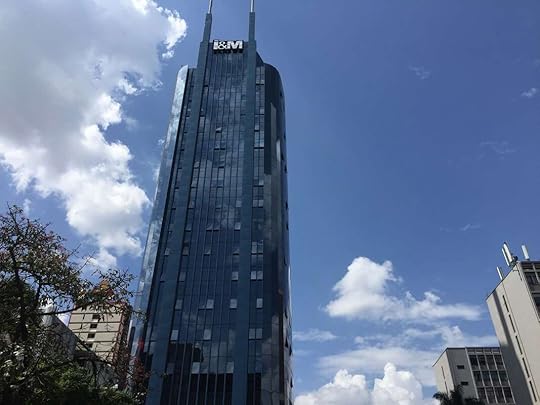 As the world's poorest continent, Africa unfortunately sometimes has the reputation for being behind-the-times, and not up to speed with the newest technology. But while living here, I have found some instances in which Africa is actually quite innovative with new technologies and progressive ideas, sometimes even more so than other places. And the following are three of those instances: Paying with Mpesa Since many people in Africa do not have the financial stability to open up a bank account, they've been mostly left out of the financial world of credit cards, ATMs, and other instantaneous forms of transactions. But this deficit only served to inspire the people of Africa to create an ingenious solution which makes using ATMs and credit cards feel archaic - sending money through your phones.
As the world's poorest continent, Africa unfortunately sometimes has the reputation for being behind-the-times, and not up to speed with the newest technology. But while living here, I have found some instances in which Africa is actually quite innovative with new technologies and progressive ideas, sometimes even more so than other places. And the following are three of those instances: Paying with Mpesa Since many people in Africa do not have the financial stability to open up a bank account, they've been mostly left out of the financial world of credit cards, ATMs, and other instantaneous forms of transactions. But this deficit only served to inspire the people of Africa to create an ingenious solution which makes using ATMs and credit cards feel archaic - sending money through your phones. 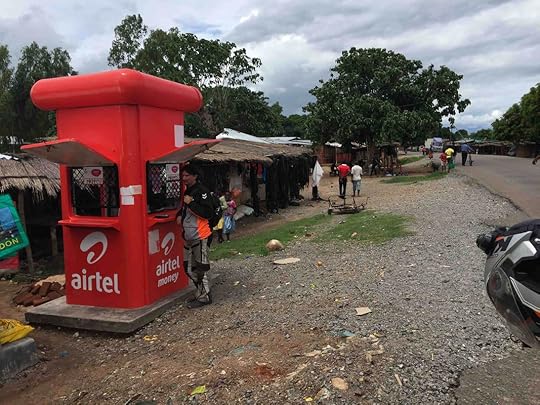 When you get a phone plan in East Africa, even from a little stall like this one, you can then start using Mpesa. "Pesa" means money in Swahili, and an app called Mpesa is used in East Africa to create a virtual bank account connected to your phone number from which you can send and receive money through an individualized routing number. So as long as you have a phone number in East Africa, you can put money into your account, and pay for things such as gas, groceries, Ubers, or even government paperwork by simply putting in their routing number which they will have displayed at their store, the amount of money to be sent, and poof... it's done. Mpesa gets a small cut from the transaction, and everyone's happy.
When you get a phone plan in East Africa, even from a little stall like this one, you can then start using Mpesa. "Pesa" means money in Swahili, and an app called Mpesa is used in East Africa to create a virtual bank account connected to your phone number from which you can send and receive money through an individualized routing number. So as long as you have a phone number in East Africa, you can put money into your account, and pay for things such as gas, groceries, Ubers, or even government paperwork by simply putting in their routing number which they will have displayed at their store, the amount of money to be sent, and poof... it's done. Mpesa gets a small cut from the transaction, and everyone's happy.
This form of payment has become so ubiquitous in East Africa, that we once hopped into a taxi in Nairobi, and when we handed the driver cash at the end of our ride, he looked at us with wide eyes like he was saying, "What am I supposed to do with that?" He just kept repeating, "Mpesa? Mpesa?" while pointing to the routing number proudly displayed on his dash. It took us about ten minutes to find someone who had enough cash to break our bill and get us change, and needless to say, the driver was very unhappy about receiving Kenyan cash from us like it was some ancient form of currency from a long-lost civilization.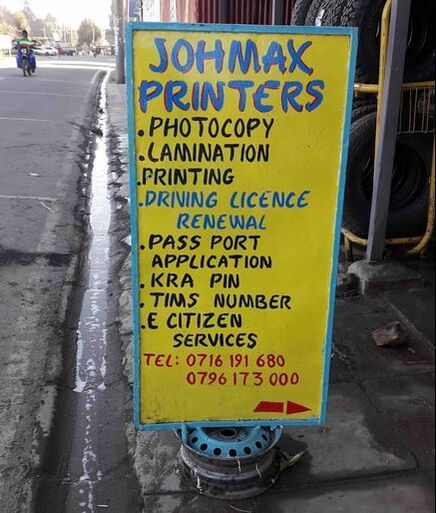 I can't believe Johmax Printers is giving Tim's number away. Mpesa has become so popular out here, that now major companies such as Visa have jumped on board with their own versions.
I can't believe Johmax Printers is giving Tim's number away. Mpesa has become so popular out here, that now major companies such as Visa have jumped on board with their own versions.
But Mpesa is not a perfect financial solution. When we were in Tanzania, the government decided to freeze all Mpesa accounts one day because there were too many fraudulent users. Overnight, people lost access to all their money, government agencies could no longer make transactions, and businesses ground to a halt. To recover your account, you had to go in to an Mpesa place and prove your identity with your passport, and according to the new rules, foreigners were no longer allowed to have Tanzanian phone numbers. As you can imagine, this was extremely inconvenient for us, since not only could we no longer have a working Tanzanian phone plan, but government fees were only equipped to be paid in Mpesa, which we weren't allowed to have anymore... it was a mess.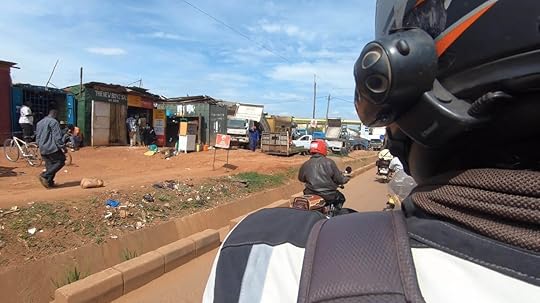 Even little stores like these will most likely accept Mpesa. But as with any new technology, it's expected to have to work out a few kinks, and overall, Mpesa has proven to be an extremely exciting way for people to pay for things. It has eased the flow of money, and has allowed businesses to prosper in a region of the world that has been mostly forgotten by the global economy. So who knows, maybe one day the rest of the world will catch up and start using Mpesa too! Kenyan High-Speed Internet As I write this in Uganda, the super-slow internet here has stopped working for the second time in a week. So this next innovation is not a continent-wide thing, or even a region-wide thing, but is country specific to Kenya.
Even little stores like these will most likely accept Mpesa. But as with any new technology, it's expected to have to work out a few kinks, and overall, Mpesa has proven to be an extremely exciting way for people to pay for things. It has eased the flow of money, and has allowed businesses to prosper in a region of the world that has been mostly forgotten by the global economy. So who knows, maybe one day the rest of the world will catch up and start using Mpesa too! Kenyan High-Speed Internet As I write this in Uganda, the super-slow internet here has stopped working for the second time in a week. So this next innovation is not a continent-wide thing, or even a region-wide thing, but is country specific to Kenya.
Because unlike its neighbors, Kenya has surprisingly good internet, and for very reasonable prices.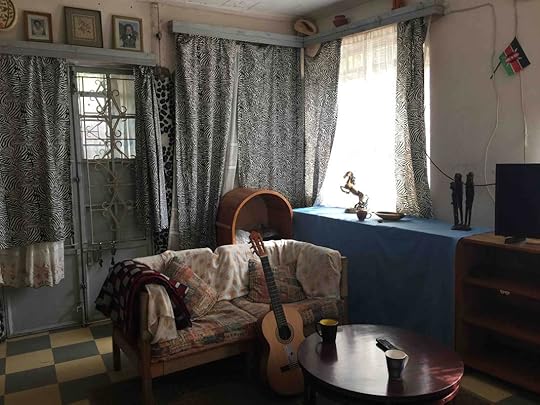 This was our home in Nanyuki, and one of the greatest things about it was the internet! When we were living in Kenya, we paid $25 a month for super high-speed unlimited internet, and it worked fantastically. This is because the Kenyan government has recognized that providing people with internet will help the economy in countless ways, and so they've taken efforts to make sure that internet is not only available to nearly every part of the country, but is affordable as well.
This was our home in Nanyuki, and one of the greatest things about it was the internet! When we were living in Kenya, we paid $25 a month for super high-speed unlimited internet, and it worked fantastically. This is because the Kenyan government has recognized that providing people with internet will help the economy in countless ways, and so they've taken efforts to make sure that internet is not only available to nearly every part of the country, but is affordable as well.
This has not gone unnoticed by the international community. Google has even started doing experiments with their newest internet technologies in Kenya because they say the technological infrastructure is perfect for them to complete trials of their "internet balloons". These massive balloons are intended to project internet to rural areas without the need for on-the-ground development. While we were in Nanyuki, we actually saw these huge silver circles hovering in the sky much higher than planes could go, and we thought they were UFOs. Check out the picture we took and tell me it doesn't look like a flying saucer!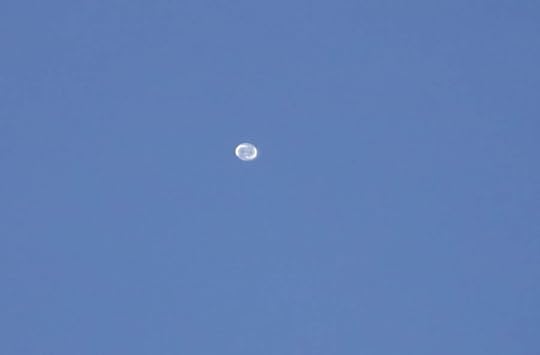 It's almost like they designed it to look like it came from Area 51. Kenya has certainly stepped up to the plate when it comes to providing internet to its citizens. Now if only the electricity would stay on all the time... No Plastic Bags Rwanda was the first country in the region to outright ban the usage or sale of single-use plastic bags, and the rest of East Africa quickly followed suit. In 2017, Kenya imposed the world's strictest plastic bag ban, and I can attest to its strictness since we had found a plastic bag in the house we were renting and suggested our landlord use it to carry his belongings in the rain. But he shouted, "No! They will arrest me if they see me walking with this bag!" And it's true. They do arrest people for having plastic bags.
It's almost like they designed it to look like it came from Area 51. Kenya has certainly stepped up to the plate when it comes to providing internet to its citizens. Now if only the electricity would stay on all the time... No Plastic Bags Rwanda was the first country in the region to outright ban the usage or sale of single-use plastic bags, and the rest of East Africa quickly followed suit. In 2017, Kenya imposed the world's strictest plastic bag ban, and I can attest to its strictness since we had found a plastic bag in the house we were renting and suggested our landlord use it to carry his belongings in the rain. But he shouted, "No! They will arrest me if they see me walking with this bag!" And it's true. They do arrest people for having plastic bags.
This became the first time in my life that I had to throw away garbage without a garbage bag. Amazingly, garbage bags aren't even sold at stores, because they simply don't exist in Kenya. At first I didn't quite know what to do with all the gross meat containers and leaky things I needed to throw away. I'd horde the plastic packaging used for pasta or toilet paper, and use those for the garbage.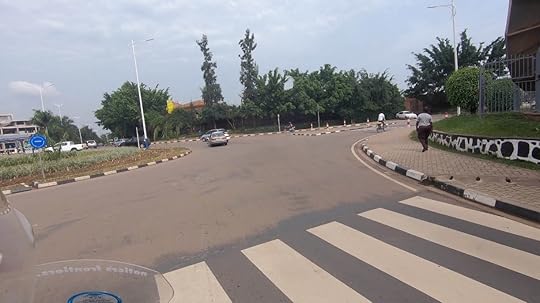 Kigali, Rwanda is a very modern and clean city. But soon I realized that it wasn't so hard just to put my trash in the garbage bin as is, leaky and all, and then just hose out the bin and put it in the sun once a week. It really wasn't so bad after all.
Kigali, Rwanda is a very modern and clean city. But soon I realized that it wasn't so hard just to put my trash in the garbage bin as is, leaky and all, and then just hose out the bin and put it in the sun once a week. It really wasn't so bad after all.
In comparison to our travels in Latin America, or even other parts of Africa where plastic bags are still allowed, I have to say that Rwanda, Kenya, and Tanzania are all visibly much cleaner and less polluted (especially Rwanda, wow!). I believe these plastic bag bans have made a huge difference in the ecosystems here. Now we just have to figure out the problem of all the other disposable plastics such as Coca-Cola bottles, chip bags, and water bottles. But certainly, East Africa is well on its way to putting the beauty and environmental health of their countries before convenience.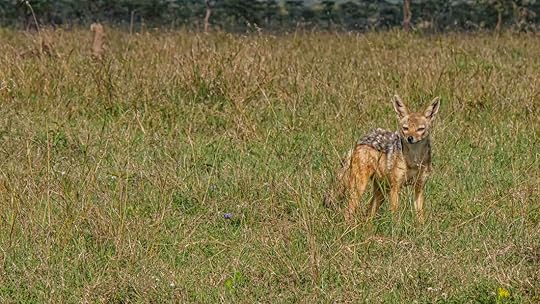 The natural world of Africa is so unique and precious, I think it's important for countries like Kenya to look after it. So these were just three ways in which Africa has surprised me with its innovations, but I think it's safe to say that as a whole, the African people are resourceful and persistent, even when they start out at a disadvantage. When they see a problem, they tackle it, and somehow they always seem to do it with a smile on their face.
The natural world of Africa is so unique and precious, I think it's important for countries like Kenya to look after it. So these were just three ways in which Africa has surprised me with its innovations, but I think it's safe to say that as a whole, the African people are resourceful and persistent, even when they start out at a disadvantage. When they see a problem, they tackle it, and somehow they always seem to do it with a smile on their face.
We've been working hard on our YouTube videos, and I think they're a great way for people to get a more intimate picture of what our crazy lives are like, and I hope they allow you to get to know us even better. So I've put some links below to our videos from this week.
Enjoy! Subscribe to Our YouTube Channel This week we'll be flying home, but more about that next Sunday. See you then!
Subscribe to Our Blog
 As the world's poorest continent, Africa unfortunately sometimes has the reputation for being behind-the-times, and not up to speed with the newest technology. But while living here, I have found some instances in which Africa is actually quite innovative with new technologies and progressive ideas, sometimes even more so than other places. And the following are three of those instances: Paying with Mpesa Since many people in Africa do not have the financial stability to open up a bank account, they've been mostly left out of the financial world of credit cards, ATMs, and other instantaneous forms of transactions. But this deficit only served to inspire the people of Africa to create an ingenious solution which makes using ATMs and credit cards feel archaic - sending money through your phones.
As the world's poorest continent, Africa unfortunately sometimes has the reputation for being behind-the-times, and not up to speed with the newest technology. But while living here, I have found some instances in which Africa is actually quite innovative with new technologies and progressive ideas, sometimes even more so than other places. And the following are three of those instances: Paying with Mpesa Since many people in Africa do not have the financial stability to open up a bank account, they've been mostly left out of the financial world of credit cards, ATMs, and other instantaneous forms of transactions. But this deficit only served to inspire the people of Africa to create an ingenious solution which makes using ATMs and credit cards feel archaic - sending money through your phones.  When you get a phone plan in East Africa, even from a little stall like this one, you can then start using Mpesa. "Pesa" means money in Swahili, and an app called Mpesa is used in East Africa to create a virtual bank account connected to your phone number from which you can send and receive money through an individualized routing number. So as long as you have a phone number in East Africa, you can put money into your account, and pay for things such as gas, groceries, Ubers, or even government paperwork by simply putting in their routing number which they will have displayed at their store, the amount of money to be sent, and poof... it's done. Mpesa gets a small cut from the transaction, and everyone's happy.
When you get a phone plan in East Africa, even from a little stall like this one, you can then start using Mpesa. "Pesa" means money in Swahili, and an app called Mpesa is used in East Africa to create a virtual bank account connected to your phone number from which you can send and receive money through an individualized routing number. So as long as you have a phone number in East Africa, you can put money into your account, and pay for things such as gas, groceries, Ubers, or even government paperwork by simply putting in their routing number which they will have displayed at their store, the amount of money to be sent, and poof... it's done. Mpesa gets a small cut from the transaction, and everyone's happy.This form of payment has become so ubiquitous in East Africa, that we once hopped into a taxi in Nairobi, and when we handed the driver cash at the end of our ride, he looked at us with wide eyes like he was saying, "What am I supposed to do with that?" He just kept repeating, "Mpesa? Mpesa?" while pointing to the routing number proudly displayed on his dash. It took us about ten minutes to find someone who had enough cash to break our bill and get us change, and needless to say, the driver was very unhappy about receiving Kenyan cash from us like it was some ancient form of currency from a long-lost civilization.
 I can't believe Johmax Printers is giving Tim's number away. Mpesa has become so popular out here, that now major companies such as Visa have jumped on board with their own versions.
I can't believe Johmax Printers is giving Tim's number away. Mpesa has become so popular out here, that now major companies such as Visa have jumped on board with their own versions.But Mpesa is not a perfect financial solution. When we were in Tanzania, the government decided to freeze all Mpesa accounts one day because there were too many fraudulent users. Overnight, people lost access to all their money, government agencies could no longer make transactions, and businesses ground to a halt. To recover your account, you had to go in to an Mpesa place and prove your identity with your passport, and according to the new rules, foreigners were no longer allowed to have Tanzanian phone numbers. As you can imagine, this was extremely inconvenient for us, since not only could we no longer have a working Tanzanian phone plan, but government fees were only equipped to be paid in Mpesa, which we weren't allowed to have anymore... it was a mess.
 Even little stores like these will most likely accept Mpesa. But as with any new technology, it's expected to have to work out a few kinks, and overall, Mpesa has proven to be an extremely exciting way for people to pay for things. It has eased the flow of money, and has allowed businesses to prosper in a region of the world that has been mostly forgotten by the global economy. So who knows, maybe one day the rest of the world will catch up and start using Mpesa too! Kenyan High-Speed Internet As I write this in Uganda, the super-slow internet here has stopped working for the second time in a week. So this next innovation is not a continent-wide thing, or even a region-wide thing, but is country specific to Kenya.
Even little stores like these will most likely accept Mpesa. But as with any new technology, it's expected to have to work out a few kinks, and overall, Mpesa has proven to be an extremely exciting way for people to pay for things. It has eased the flow of money, and has allowed businesses to prosper in a region of the world that has been mostly forgotten by the global economy. So who knows, maybe one day the rest of the world will catch up and start using Mpesa too! Kenyan High-Speed Internet As I write this in Uganda, the super-slow internet here has stopped working for the second time in a week. So this next innovation is not a continent-wide thing, or even a region-wide thing, but is country specific to Kenya.Because unlike its neighbors, Kenya has surprisingly good internet, and for very reasonable prices.
 This was our home in Nanyuki, and one of the greatest things about it was the internet! When we were living in Kenya, we paid $25 a month for super high-speed unlimited internet, and it worked fantastically. This is because the Kenyan government has recognized that providing people with internet will help the economy in countless ways, and so they've taken efforts to make sure that internet is not only available to nearly every part of the country, but is affordable as well.
This was our home in Nanyuki, and one of the greatest things about it was the internet! When we were living in Kenya, we paid $25 a month for super high-speed unlimited internet, and it worked fantastically. This is because the Kenyan government has recognized that providing people with internet will help the economy in countless ways, and so they've taken efforts to make sure that internet is not only available to nearly every part of the country, but is affordable as well.This has not gone unnoticed by the international community. Google has even started doing experiments with their newest internet technologies in Kenya because they say the technological infrastructure is perfect for them to complete trials of their "internet balloons". These massive balloons are intended to project internet to rural areas without the need for on-the-ground development. While we were in Nanyuki, we actually saw these huge silver circles hovering in the sky much higher than planes could go, and we thought they were UFOs. Check out the picture we took and tell me it doesn't look like a flying saucer!
 It's almost like they designed it to look like it came from Area 51. Kenya has certainly stepped up to the plate when it comes to providing internet to its citizens. Now if only the electricity would stay on all the time... No Plastic Bags Rwanda was the first country in the region to outright ban the usage or sale of single-use plastic bags, and the rest of East Africa quickly followed suit. In 2017, Kenya imposed the world's strictest plastic bag ban, and I can attest to its strictness since we had found a plastic bag in the house we were renting and suggested our landlord use it to carry his belongings in the rain. But he shouted, "No! They will arrest me if they see me walking with this bag!" And it's true. They do arrest people for having plastic bags.
It's almost like they designed it to look like it came from Area 51. Kenya has certainly stepped up to the plate when it comes to providing internet to its citizens. Now if only the electricity would stay on all the time... No Plastic Bags Rwanda was the first country in the region to outright ban the usage or sale of single-use plastic bags, and the rest of East Africa quickly followed suit. In 2017, Kenya imposed the world's strictest plastic bag ban, and I can attest to its strictness since we had found a plastic bag in the house we were renting and suggested our landlord use it to carry his belongings in the rain. But he shouted, "No! They will arrest me if they see me walking with this bag!" And it's true. They do arrest people for having plastic bags.This became the first time in my life that I had to throw away garbage without a garbage bag. Amazingly, garbage bags aren't even sold at stores, because they simply don't exist in Kenya. At first I didn't quite know what to do with all the gross meat containers and leaky things I needed to throw away. I'd horde the plastic packaging used for pasta or toilet paper, and use those for the garbage.
 Kigali, Rwanda is a very modern and clean city. But soon I realized that it wasn't so hard just to put my trash in the garbage bin as is, leaky and all, and then just hose out the bin and put it in the sun once a week. It really wasn't so bad after all.
Kigali, Rwanda is a very modern and clean city. But soon I realized that it wasn't so hard just to put my trash in the garbage bin as is, leaky and all, and then just hose out the bin and put it in the sun once a week. It really wasn't so bad after all.In comparison to our travels in Latin America, or even other parts of Africa where plastic bags are still allowed, I have to say that Rwanda, Kenya, and Tanzania are all visibly much cleaner and less polluted (especially Rwanda, wow!). I believe these plastic bag bans have made a huge difference in the ecosystems here. Now we just have to figure out the problem of all the other disposable plastics such as Coca-Cola bottles, chip bags, and water bottles. But certainly, East Africa is well on its way to putting the beauty and environmental health of their countries before convenience.
 The natural world of Africa is so unique and precious, I think it's important for countries like Kenya to look after it. So these were just three ways in which Africa has surprised me with its innovations, but I think it's safe to say that as a whole, the African people are resourceful and persistent, even when they start out at a disadvantage. When they see a problem, they tackle it, and somehow they always seem to do it with a smile on their face.
The natural world of Africa is so unique and precious, I think it's important for countries like Kenya to look after it. So these were just three ways in which Africa has surprised me with its innovations, but I think it's safe to say that as a whole, the African people are resourceful and persistent, even when they start out at a disadvantage. When they see a problem, they tackle it, and somehow they always seem to do it with a smile on their face.We've been working hard on our YouTube videos, and I think they're a great way for people to get a more intimate picture of what our crazy lives are like, and I hope they allow you to get to know us even better. So I've put some links below to our videos from this week.
Enjoy! Subscribe to Our YouTube Channel This week we'll be flying home, but more about that next Sunday. See you then!
Subscribe to Our Blog
Published on May 01, 2021 14:00
April 25, 2021
Our Journey Back to Uganda - Part 2
By Marisa Notier The Notier Notes Our Sunday Scoop 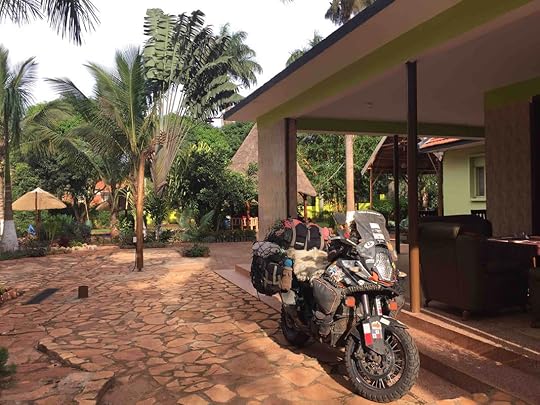 The hardest part of crossing from Kenya into Uganda was complete - getting through the bureaucracy of the border. It hadn't been easy, but we were finally through and on the road again in Uganda. And it was a glorious feeling to say the least (partially because we were so hot and sweaty, the wind from being on the motorcycle felt oh-so-amazing).
The hardest part of crossing from Kenya into Uganda was complete - getting through the bureaucracy of the border. It hadn't been easy, but we were finally through and on the road again in Uganda. And it was a glorious feeling to say the least (partially because we were so hot and sweaty, the wind from being on the motorcycle felt oh-so-amazing).
Since we had already spent a good portion of the day at the border, we knew we wouldn't make it all the way to Kampala before nightfall. So we stopped in the next big town called Jinja, a humidly tropical city on the low-altitude shores of Lake Victoria. Because of it's paradise-like setting, and also being on the banks of the source of the Nile River, Jinja was a hotspot for tourism in better times. The place has a whole assortment of hotels and accommodations to choose from, but in general, they tend to be more upscale and would normally be out of our budget.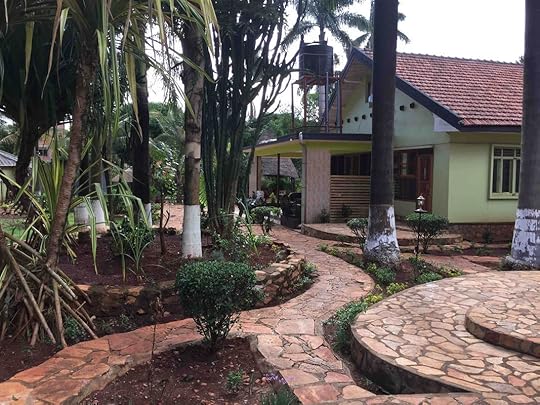 We stopped at one of these fine vacation resorts - a place with lovely thatched roofs and a pool. And even though the regular price was a bit too high for what we were willing to pay (but the hotel was obviously worth it), the owner was willing to offer us a discount. And so we happily floated in the pool as it washed away all our travel grime and stress. I lay floating on my back, watching the palm fronds rustle and sway above us, while the sunlight speckled through their criss-crossed leaves. It was magnificent.
We stopped at one of these fine vacation resorts - a place with lovely thatched roofs and a pool. And even though the regular price was a bit too high for what we were willing to pay (but the hotel was obviously worth it), the owner was willing to offer us a discount. And so we happily floated in the pool as it washed away all our travel grime and stress. I lay floating on my back, watching the palm fronds rustle and sway above us, while the sunlight speckled through their criss-crossed leaves. It was magnificent.
To de-chlorinate myself after my swim, I went straight to the shower in our room, and figured that because Jinja was so hot, there wouldn't be any hot water. But to my surprise, when I turned on the hot water nozzle, steaming water actually came out of the shower! That was a very rare thing in Africa! Now this was luxury!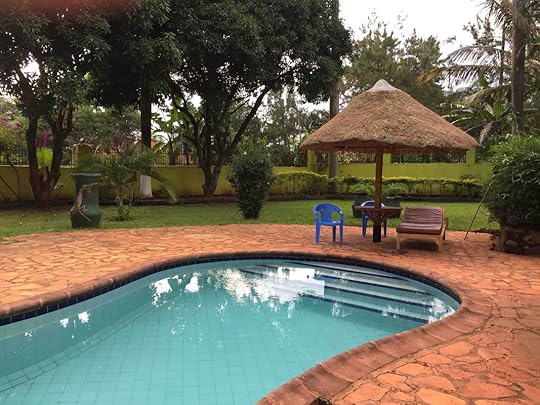 This pool was perfect after a hard day.
This pool was perfect after a hard day. 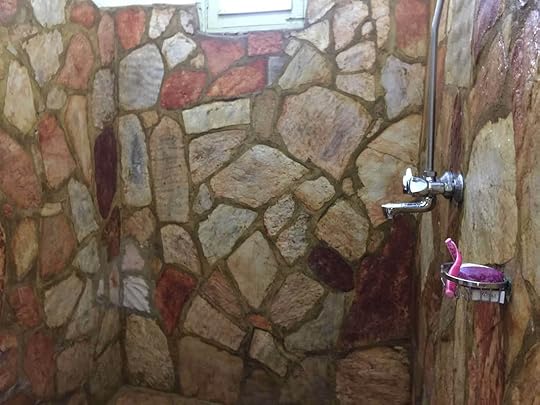 An actual hot water shower! The owners of the place were of Indian descent, so for dinner, I knew I should order the curry, figuring it was going to be really good. And I was not disappointed. After having cooked almost every meal for ourselves for the past six months, I was getting quite bored with all five things that I knew how to cook with the ingredients that I could get in Nanyuki. And so this dinner was just another special surprise that made me feel like all the trouble at the border was worth it.
An actual hot water shower! The owners of the place were of Indian descent, so for dinner, I knew I should order the curry, figuring it was going to be really good. And I was not disappointed. After having cooked almost every meal for ourselves for the past six months, I was getting quite bored with all five things that I knew how to cook with the ingredients that I could get in Nanyuki. And so this dinner was just another special surprise that made me feel like all the trouble at the border was worth it.
In fact, the trouble of traveling was always worth it, because of that rush of excitement I get when leaving one country and going on to the next (even if it was a country I'd already been to). The freshness of new air, the thrill of new views all around, and to actually be having a dinner served to us at a restaurant in a tropical hotel resort with a pool, all in a country where the Covid case numbers were so low that they hadn't had a death in weeks... this was something that most people during the pandemic could only dream about.
It was like the old times were back. And even if it was just a momentary evening of care-free nostalgia for all that we used to be able to do, and all the little things that I used to take for granted, it was perfect. And it was more than I could've asked for. (Except for the creepy spiders, I could have asked for less of them.)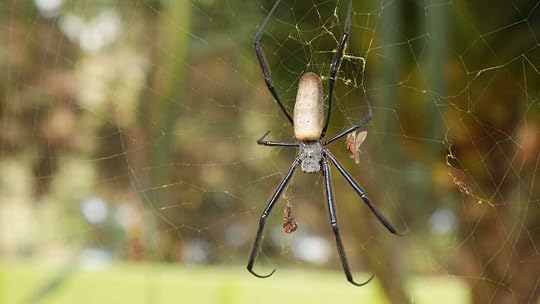 The hotel was perfect except for these huge, freaky spiders. The next day we headed out to Kampala, the capital city of Uganda, where we would be staying for the next month as we got ourselves ready to go back home. And as we entered the congestion of the city traffic, I began to recognize things - certain streets sloping up and down the hills, certain buildings with their signs for Mpesa money-sending services, or local telephone companies. Or certain schools painted in bright primary colors. And it felt like I was already on my way home. After all, we'd spent seven months living here as the pandemic first began. And Kampala had made an excellent home-away-from-home for us.
The hotel was perfect except for these huge, freaky spiders. The next day we headed out to Kampala, the capital city of Uganda, where we would be staying for the next month as we got ourselves ready to go back home. And as we entered the congestion of the city traffic, I began to recognize things - certain streets sloping up and down the hills, certain buildings with their signs for Mpesa money-sending services, or local telephone companies. Or certain schools painted in bright primary colors. And it felt like I was already on my way home. After all, we'd spent seven months living here as the pandemic first began. And Kampala had made an excellent home-away-from-home for us.
We were going to be staying in the same backpacker's hotel where we had once lived, and as we pulled in, I was immediately hit with a sense of sentimental remembrance. We saw Cathy, the owner, and Soroush, another fellow expat who stays at the hotel long-term. We saw other staff members and familiar faces, and in the evening, Thomas the monkey could be heard crashing along the metal rooftops.
Even Thomas seemed to remember us, as he came right up to the window and stuck his head in, wondering if we had bananas for him. I guess I hadn't realized what a family we had created here for ourselves, and it had to take leaving and coming back for me to fully appreciate how welcoming everyone here had been to us. And how much we needed that.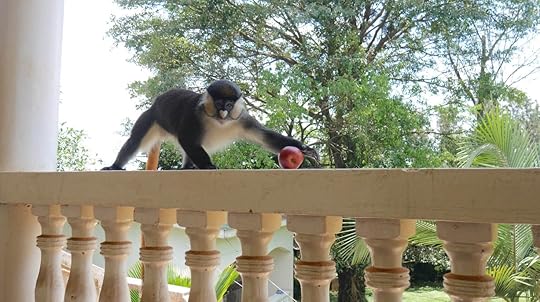 Thomas is so cute! It was nice to see him again. But now things were going to change. Because now we were going to leave, and this time, it might be for good.
Thomas is so cute! It was nice to see him again. But now things were going to change. Because now we were going to leave, and this time, it might be for good.
We immediately got started making preparations to fly our bike back to Chicago (always a stress and a pain to do), and we booked our plane tickets right after. We'll be home in early May, and our time here in Africa is coming to a close. It still doesn't seem real that soon we'll be back. And Africa will be a world away.
But Africa had one last incredible surprise for us - a musical concert with dancing which took us on a cultural tour through Uganda. And I have to say it was one of the most incredible concerts of my life. At one point the speakers went out, but it didn't matter. The drumming and chanting still sent chills through my body. Nobody needed speakers long ago. This was music and entertainment in its purest form.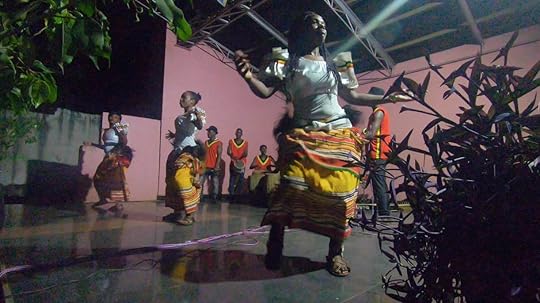 Hopefully I'll be able to show you a video of it soon, because.... exciting news! We are revamping our YouTube channel and are going to be posting up lots of new videos! We'll have interviews of us talking about our best and worst times, accompanied by lots of footage of the incredible roads we've taken, and the adventures we've had along the way. The videos will start tomorrow, and I'm hoping to get up a few a week! We're calling them Notier's Frontiers Diaries.
Hopefully I'll be able to show you a video of it soon, because.... exciting news! We are revamping our YouTube channel and are going to be posting up lots of new videos! We'll have interviews of us talking about our best and worst times, accompanied by lots of footage of the incredible roads we've taken, and the adventures we've had along the way. The videos will start tomorrow, and I'm hoping to get up a few a week! We're calling them Notier's Frontiers Diaries.
So check out the trailer we made for it below, and you can subscribe to get all of our latest video updates. See you next Sunday! Subscribe to Our YouTube Channel Subscribe to Our Blog
 The hardest part of crossing from Kenya into Uganda was complete - getting through the bureaucracy of the border. It hadn't been easy, but we were finally through and on the road again in Uganda. And it was a glorious feeling to say the least (partially because we were so hot and sweaty, the wind from being on the motorcycle felt oh-so-amazing).
The hardest part of crossing from Kenya into Uganda was complete - getting through the bureaucracy of the border. It hadn't been easy, but we were finally through and on the road again in Uganda. And it was a glorious feeling to say the least (partially because we were so hot and sweaty, the wind from being on the motorcycle felt oh-so-amazing).Since we had already spent a good portion of the day at the border, we knew we wouldn't make it all the way to Kampala before nightfall. So we stopped in the next big town called Jinja, a humidly tropical city on the low-altitude shores of Lake Victoria. Because of it's paradise-like setting, and also being on the banks of the source of the Nile River, Jinja was a hotspot for tourism in better times. The place has a whole assortment of hotels and accommodations to choose from, but in general, they tend to be more upscale and would normally be out of our budget.
 We stopped at one of these fine vacation resorts - a place with lovely thatched roofs and a pool. And even though the regular price was a bit too high for what we were willing to pay (but the hotel was obviously worth it), the owner was willing to offer us a discount. And so we happily floated in the pool as it washed away all our travel grime and stress. I lay floating on my back, watching the palm fronds rustle and sway above us, while the sunlight speckled through their criss-crossed leaves. It was magnificent.
We stopped at one of these fine vacation resorts - a place with lovely thatched roofs and a pool. And even though the regular price was a bit too high for what we were willing to pay (but the hotel was obviously worth it), the owner was willing to offer us a discount. And so we happily floated in the pool as it washed away all our travel grime and stress. I lay floating on my back, watching the palm fronds rustle and sway above us, while the sunlight speckled through their criss-crossed leaves. It was magnificent.To de-chlorinate myself after my swim, I went straight to the shower in our room, and figured that because Jinja was so hot, there wouldn't be any hot water. But to my surprise, when I turned on the hot water nozzle, steaming water actually came out of the shower! That was a very rare thing in Africa! Now this was luxury!
 This pool was perfect after a hard day.
This pool was perfect after a hard day.  An actual hot water shower! The owners of the place were of Indian descent, so for dinner, I knew I should order the curry, figuring it was going to be really good. And I was not disappointed. After having cooked almost every meal for ourselves for the past six months, I was getting quite bored with all five things that I knew how to cook with the ingredients that I could get in Nanyuki. And so this dinner was just another special surprise that made me feel like all the trouble at the border was worth it.
An actual hot water shower! The owners of the place were of Indian descent, so for dinner, I knew I should order the curry, figuring it was going to be really good. And I was not disappointed. After having cooked almost every meal for ourselves for the past six months, I was getting quite bored with all five things that I knew how to cook with the ingredients that I could get in Nanyuki. And so this dinner was just another special surprise that made me feel like all the trouble at the border was worth it.In fact, the trouble of traveling was always worth it, because of that rush of excitement I get when leaving one country and going on to the next (even if it was a country I'd already been to). The freshness of new air, the thrill of new views all around, and to actually be having a dinner served to us at a restaurant in a tropical hotel resort with a pool, all in a country where the Covid case numbers were so low that they hadn't had a death in weeks... this was something that most people during the pandemic could only dream about.
It was like the old times were back. And even if it was just a momentary evening of care-free nostalgia for all that we used to be able to do, and all the little things that I used to take for granted, it was perfect. And it was more than I could've asked for. (Except for the creepy spiders, I could have asked for less of them.)
 The hotel was perfect except for these huge, freaky spiders. The next day we headed out to Kampala, the capital city of Uganda, where we would be staying for the next month as we got ourselves ready to go back home. And as we entered the congestion of the city traffic, I began to recognize things - certain streets sloping up and down the hills, certain buildings with their signs for Mpesa money-sending services, or local telephone companies. Or certain schools painted in bright primary colors. And it felt like I was already on my way home. After all, we'd spent seven months living here as the pandemic first began. And Kampala had made an excellent home-away-from-home for us.
The hotel was perfect except for these huge, freaky spiders. The next day we headed out to Kampala, the capital city of Uganda, where we would be staying for the next month as we got ourselves ready to go back home. And as we entered the congestion of the city traffic, I began to recognize things - certain streets sloping up and down the hills, certain buildings with their signs for Mpesa money-sending services, or local telephone companies. Or certain schools painted in bright primary colors. And it felt like I was already on my way home. After all, we'd spent seven months living here as the pandemic first began. And Kampala had made an excellent home-away-from-home for us.We were going to be staying in the same backpacker's hotel where we had once lived, and as we pulled in, I was immediately hit with a sense of sentimental remembrance. We saw Cathy, the owner, and Soroush, another fellow expat who stays at the hotel long-term. We saw other staff members and familiar faces, and in the evening, Thomas the monkey could be heard crashing along the metal rooftops.
Even Thomas seemed to remember us, as he came right up to the window and stuck his head in, wondering if we had bananas for him. I guess I hadn't realized what a family we had created here for ourselves, and it had to take leaving and coming back for me to fully appreciate how welcoming everyone here had been to us. And how much we needed that.
 Thomas is so cute! It was nice to see him again. But now things were going to change. Because now we were going to leave, and this time, it might be for good.
Thomas is so cute! It was nice to see him again. But now things were going to change. Because now we were going to leave, and this time, it might be for good.We immediately got started making preparations to fly our bike back to Chicago (always a stress and a pain to do), and we booked our plane tickets right after. We'll be home in early May, and our time here in Africa is coming to a close. It still doesn't seem real that soon we'll be back. And Africa will be a world away.
But Africa had one last incredible surprise for us - a musical concert with dancing which took us on a cultural tour through Uganda. And I have to say it was one of the most incredible concerts of my life. At one point the speakers went out, but it didn't matter. The drumming and chanting still sent chills through my body. Nobody needed speakers long ago. This was music and entertainment in its purest form.
 Hopefully I'll be able to show you a video of it soon, because.... exciting news! We are revamping our YouTube channel and are going to be posting up lots of new videos! We'll have interviews of us talking about our best and worst times, accompanied by lots of footage of the incredible roads we've taken, and the adventures we've had along the way. The videos will start tomorrow, and I'm hoping to get up a few a week! We're calling them Notier's Frontiers Diaries.
Hopefully I'll be able to show you a video of it soon, because.... exciting news! We are revamping our YouTube channel and are going to be posting up lots of new videos! We'll have interviews of us talking about our best and worst times, accompanied by lots of footage of the incredible roads we've taken, and the adventures we've had along the way. The videos will start tomorrow, and I'm hoping to get up a few a week! We're calling them Notier's Frontiers Diaries.So check out the trailer we made for it below, and you can subscribe to get all of our latest video updates. See you next Sunday! Subscribe to Our YouTube Channel Subscribe to Our Blog
Published on April 25, 2021 01:12
April 17, 2021
Our Journey Back to Uganda - Part 1
By Marisa Notier The Notier Notes Our Sunday Scoop 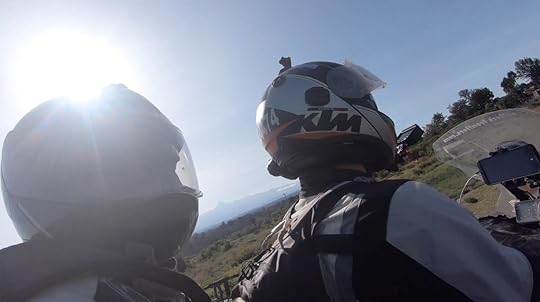 Can you see the peak of Mt. Kenya in the background? As with everything here in Africa, it was quite the adventure journeying from Kenya back to Uganda. In order to travel across the border, we had to first get a negative Covid PCR test that would be good for three days. Considering it would take a couple days to get to the Ugandan border from where we were living in Kenya, we had to time things just right.
Can you see the peak of Mt. Kenya in the background? As with everything here in Africa, it was quite the adventure journeying from Kenya back to Uganda. In order to travel across the border, we had to first get a negative Covid PCR test that would be good for three days. Considering it would take a couple days to get to the Ugandan border from where we were living in Kenya, we had to time things just right.
We had done a similar procedure when moving from Uganda to Kenya six months ago, and I remember getting that swab up my nose, and thinking that it was one of the most unpleasant experiences of my life. I could taste blood afterwards, and my nose (more like my brain) hurt for days. I whimpered a bit while the nurse was doing it, and she said, "It does not hurt. I am the most gentle!"
Luckily, this time was not nearly as bad. So yeah, that first nurse was NOT the most gentle.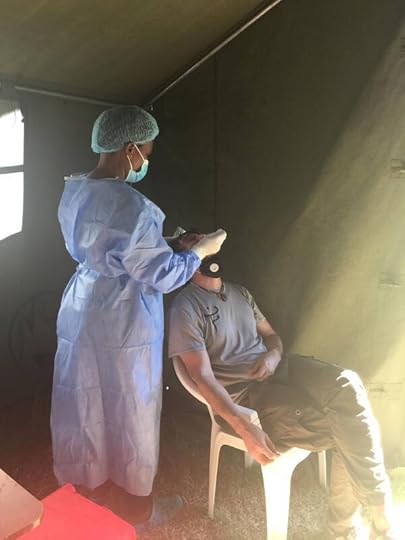 This time getting the test was much better! We had heard that the test would be ready in three days, and when we tried to confirm this, the doctor said, "It takes 24 hours to get the results." We were wonderfully surprised.
This time getting the test was much better! We had heard that the test would be ready in three days, and when we tried to confirm this, the doctor said, "It takes 24 hours to get the results." We were wonderfully surprised.
"24 hours!" Tim exclaimed. "That's great!"
But the doctor soon dashed all our hopes when he clarified, "Yes, 24 business hours."
Our shoulders slumped back down in disappointment. "Right, so three days," Tim said. The doctor nodded.
This was just another moment of slight miscommunication that happens on a daily basis to us. Most people we meet here in Africa speak English quite well, but they seem to have their own terminology for things that we just don't understand.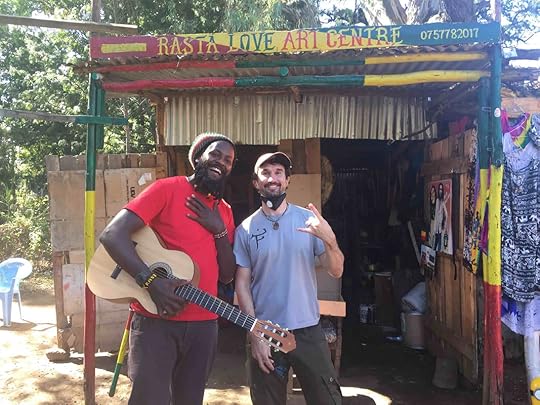 It was sad saying goodbye to the friends we'd made in Nanyuki. This is Henry who owns a little crafts shop. Like we'd suspected, we collected our negative test results after three days, and said goodbye to our neighbors and the kitties (goodbye Marco and Dora!). And we headed off toward Uganda.
It was sad saying goodbye to the friends we'd made in Nanyuki. This is Henry who owns a little crafts shop. Like we'd suspected, we collected our negative test results after three days, and said goodbye to our neighbors and the kitties (goodbye Marco and Dora!). And we headed off toward Uganda.  This is Sara, and we couldn't have asked for a better neighbor in Nanyuki.
This is Sara, and we couldn't have asked for a better neighbor in Nanyuki.  After six months of practically going nowhere on the motorcycle, it felt glorious to pack it all up and get on the road again. There's nothing like the winds of pure freedom rushing through your jacket.
After six months of practically going nowhere on the motorcycle, it felt glorious to pack it all up and get on the road again. There's nothing like the winds of pure freedom rushing through your jacket.
Despite a short rain storm, the first day's ride was perfect. We were greeted with lovely views of Mt. Kenya's jagged pinnacle in the morning, and our descent and rise through the Great Rift Valley was gorgeous. Since it's the start of the big rainy season here, everything was lush and green, and we had a very special surprise of seeing some rhinos along the way! You never know what you're going to find on a drive through Kenya!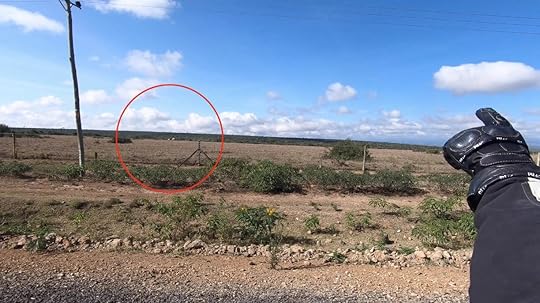 You can't really see them here, but we were able to clearly distinguish the rhinos and their huge, long horns. We stopped for a picnic lunch at a forested area beside the road where a young man came up to us on his motorcycle. He introduced himself as James, and said, "I knew I had to greet you because I have never seen a white person before! Just in the movies and TV shows, and you look like you should be in a TV show!"
You can't really see them here, but we were able to clearly distinguish the rhinos and their huge, long horns. We stopped for a picnic lunch at a forested area beside the road where a young man came up to us on his motorcycle. He introduced himself as James, and said, "I knew I had to greet you because I have never seen a white person before! Just in the movies and TV shows, and you look like you should be in a TV show!"
I kept thinking, how is it possible you've never seen a white person before? Actually, in all my travels, no one has ever said this to me. I've been asked if I knew Brad Pitt or Michael Jordan, as if all Americans live down the street from them, but this was a first for me.
We expressed our excitement of meeting James as well, and Tim gave him a U.S. quarter as a keepsake. By this time, a group of James' friends had come over to see these strange foreigners, and James ran to his companions shouting, "I got a coin from America!" It was a lunch I will always remember.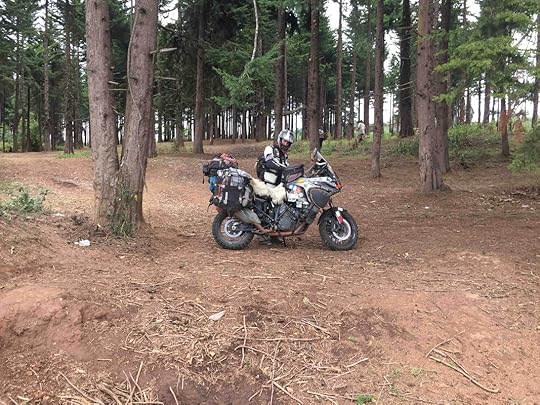 This was the forested area where we pulled over for lunch. Besides James, some friendly local people were foraging for firewood there. We stayed that night at a hotel that was part of a church, and because it was Saturday, the church band was practicing for their Sunday assembly. Drumming, tambourine rattling, and lots and lots of choral singing filled the air. The music felt as African as could be, but also had a hint of American Gospel to it. And as Tim and I stood outside the church listening, unable to stop ourselves from tapping our feet and swaying to the rhythms, I thought about how this was most likely going to be our final month in Africa before we went back home. And I felt that Africa was giving us a special little farewell.
This was the forested area where we pulled over for lunch. Besides James, some friendly local people were foraging for firewood there. We stayed that night at a hotel that was part of a church, and because it was Saturday, the church band was practicing for their Sunday assembly. Drumming, tambourine rattling, and lots and lots of choral singing filled the air. The music felt as African as could be, but also had a hint of American Gospel to it. And as Tim and I stood outside the church listening, unable to stop ourselves from tapping our feet and swaying to the rhythms, I thought about how this was most likely going to be our final month in Africa before we went back home. And I felt that Africa was giving us a special little farewell.
And then we got to the border the next day. And it felt more like Africa was giving us the finger.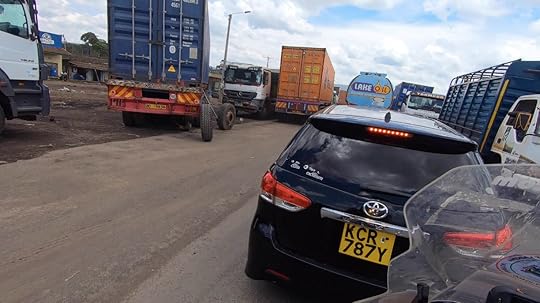 There's usually a lot of traffic around borders. All border crossings are an inconvenience at best, and a nightmare at worst. And it just so happens that African borders tend to weigh heavily on the nightmarish side.
There's usually a lot of traffic around borders. All border crossings are an inconvenience at best, and a nightmare at worst. And it just so happens that African borders tend to weigh heavily on the nightmarish side.
There's a general rule of life that it will always be a million degrees at the border, and of course you'll be walking around in all your riding gear for hours, people will be following you and hassling you to exchange money with them or use their "fixer" services, and all the while you have to keep an eye on your motorcycle, your passport, your money... And then there's the actual immigration formalities part, and during Covid times, all the rules change so often that it's a miracle anyone ever gets through.
When we had extended our Kenyan visa in Nairobi, they told us we didn't need our documents endorsed because they had done away with that procedure during the pandemic. We pleaded with them just to give us an official looking stamp since we were already there, but they refused, assuring us we would have no problems at the border.
Well guess what... we had problems.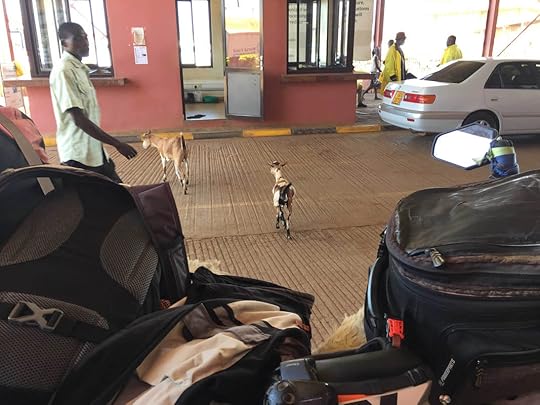 I was very jealous that these goats got to cross freely between Kenya and Uganda without passports or visas. It was quite an ordeal, and that was just the visa part. Then we had to import our motorcycle into Uganda, and the guy didn't want to give us the same 30 day TIP we had received the first time we'd entered the country. He insisted that we had to use our carnet, but we preferred to be let in on a TIP because the only time we'd ever used our carnet, they filed a claim against us and attempted to collect the value of the motorcycle... if this is sounding like gibberish to you, just know that it was a high-stress situation involving expensive documents while being at the mercy of government officials who would rather be playing on their phones rather than talking to us.
I was very jealous that these goats got to cross freely between Kenya and Uganda without passports or visas. It was quite an ordeal, and that was just the visa part. Then we had to import our motorcycle into Uganda, and the guy didn't want to give us the same 30 day TIP we had received the first time we'd entered the country. He insisted that we had to use our carnet, but we preferred to be let in on a TIP because the only time we'd ever used our carnet, they filed a claim against us and attempted to collect the value of the motorcycle... if this is sounding like gibberish to you, just know that it was a high-stress situation involving expensive documents while being at the mercy of government officials who would rather be playing on their phones rather than talking to us.
Tim's patience level is... well, lower than mine. And after he would plead with the officials to stamp him and the motorcycle into the country with no prevail, he would send in the big guns - me. I'd apologize for not having the paperwork delivered the way that they insisted it had to be, even though their own government said otherwise. It took about four hours of playing an ignorant damsel in distress, until they just gave in and let us through into Uganda. We were ecstatic, but were mentally and physically exhausted, and didn't know where we would stay that night after such a long day.
We were accustomed to the rise and falls of emotions. From the "Look over there! It's a rhino!" to the heat and frustrations of borders. But the beauty and wonder always outweigh the negatives.
Next week we will cover even more peaks and valleys of what Uganda had in store for us. So stay tuned!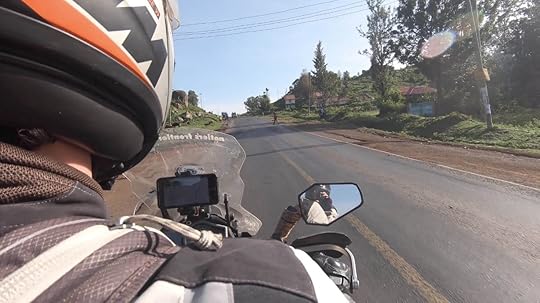 I hope you've found yourself safe and well these past two weeks, and I'll see you next Sunday with Part 2 of our journey back to Uganda.
I hope you've found yourself safe and well these past two weeks, and I'll see you next Sunday with Part 2 of our journey back to Uganda.
Subscribe to Our Blog
 Can you see the peak of Mt. Kenya in the background? As with everything here in Africa, it was quite the adventure journeying from Kenya back to Uganda. In order to travel across the border, we had to first get a negative Covid PCR test that would be good for three days. Considering it would take a couple days to get to the Ugandan border from where we were living in Kenya, we had to time things just right.
Can you see the peak of Mt. Kenya in the background? As with everything here in Africa, it was quite the adventure journeying from Kenya back to Uganda. In order to travel across the border, we had to first get a negative Covid PCR test that would be good for three days. Considering it would take a couple days to get to the Ugandan border from where we were living in Kenya, we had to time things just right.We had done a similar procedure when moving from Uganda to Kenya six months ago, and I remember getting that swab up my nose, and thinking that it was one of the most unpleasant experiences of my life. I could taste blood afterwards, and my nose (more like my brain) hurt for days. I whimpered a bit while the nurse was doing it, and she said, "It does not hurt. I am the most gentle!"
Luckily, this time was not nearly as bad. So yeah, that first nurse was NOT the most gentle.
 This time getting the test was much better! We had heard that the test would be ready in three days, and when we tried to confirm this, the doctor said, "It takes 24 hours to get the results." We were wonderfully surprised.
This time getting the test was much better! We had heard that the test would be ready in three days, and when we tried to confirm this, the doctor said, "It takes 24 hours to get the results." We were wonderfully surprised."24 hours!" Tim exclaimed. "That's great!"
But the doctor soon dashed all our hopes when he clarified, "Yes, 24 business hours."
Our shoulders slumped back down in disappointment. "Right, so three days," Tim said. The doctor nodded.
This was just another moment of slight miscommunication that happens on a daily basis to us. Most people we meet here in Africa speak English quite well, but they seem to have their own terminology for things that we just don't understand.
 It was sad saying goodbye to the friends we'd made in Nanyuki. This is Henry who owns a little crafts shop. Like we'd suspected, we collected our negative test results after three days, and said goodbye to our neighbors and the kitties (goodbye Marco and Dora!). And we headed off toward Uganda.
It was sad saying goodbye to the friends we'd made in Nanyuki. This is Henry who owns a little crafts shop. Like we'd suspected, we collected our negative test results after three days, and said goodbye to our neighbors and the kitties (goodbye Marco and Dora!). And we headed off toward Uganda.  This is Sara, and we couldn't have asked for a better neighbor in Nanyuki.
This is Sara, and we couldn't have asked for a better neighbor in Nanyuki.  After six months of practically going nowhere on the motorcycle, it felt glorious to pack it all up and get on the road again. There's nothing like the winds of pure freedom rushing through your jacket.
After six months of practically going nowhere on the motorcycle, it felt glorious to pack it all up and get on the road again. There's nothing like the winds of pure freedom rushing through your jacket.Despite a short rain storm, the first day's ride was perfect. We were greeted with lovely views of Mt. Kenya's jagged pinnacle in the morning, and our descent and rise through the Great Rift Valley was gorgeous. Since it's the start of the big rainy season here, everything was lush and green, and we had a very special surprise of seeing some rhinos along the way! You never know what you're going to find on a drive through Kenya!
 You can't really see them here, but we were able to clearly distinguish the rhinos and their huge, long horns. We stopped for a picnic lunch at a forested area beside the road where a young man came up to us on his motorcycle. He introduced himself as James, and said, "I knew I had to greet you because I have never seen a white person before! Just in the movies and TV shows, and you look like you should be in a TV show!"
You can't really see them here, but we were able to clearly distinguish the rhinos and their huge, long horns. We stopped for a picnic lunch at a forested area beside the road where a young man came up to us on his motorcycle. He introduced himself as James, and said, "I knew I had to greet you because I have never seen a white person before! Just in the movies and TV shows, and you look like you should be in a TV show!"I kept thinking, how is it possible you've never seen a white person before? Actually, in all my travels, no one has ever said this to me. I've been asked if I knew Brad Pitt or Michael Jordan, as if all Americans live down the street from them, but this was a first for me.
We expressed our excitement of meeting James as well, and Tim gave him a U.S. quarter as a keepsake. By this time, a group of James' friends had come over to see these strange foreigners, and James ran to his companions shouting, "I got a coin from America!" It was a lunch I will always remember.
 This was the forested area where we pulled over for lunch. Besides James, some friendly local people were foraging for firewood there. We stayed that night at a hotel that was part of a church, and because it was Saturday, the church band was practicing for their Sunday assembly. Drumming, tambourine rattling, and lots and lots of choral singing filled the air. The music felt as African as could be, but also had a hint of American Gospel to it. And as Tim and I stood outside the church listening, unable to stop ourselves from tapping our feet and swaying to the rhythms, I thought about how this was most likely going to be our final month in Africa before we went back home. And I felt that Africa was giving us a special little farewell.
This was the forested area where we pulled over for lunch. Besides James, some friendly local people were foraging for firewood there. We stayed that night at a hotel that was part of a church, and because it was Saturday, the church band was practicing for their Sunday assembly. Drumming, tambourine rattling, and lots and lots of choral singing filled the air. The music felt as African as could be, but also had a hint of American Gospel to it. And as Tim and I stood outside the church listening, unable to stop ourselves from tapping our feet and swaying to the rhythms, I thought about how this was most likely going to be our final month in Africa before we went back home. And I felt that Africa was giving us a special little farewell.And then we got to the border the next day. And it felt more like Africa was giving us the finger.
 There's usually a lot of traffic around borders. All border crossings are an inconvenience at best, and a nightmare at worst. And it just so happens that African borders tend to weigh heavily on the nightmarish side.
There's usually a lot of traffic around borders. All border crossings are an inconvenience at best, and a nightmare at worst. And it just so happens that African borders tend to weigh heavily on the nightmarish side.There's a general rule of life that it will always be a million degrees at the border, and of course you'll be walking around in all your riding gear for hours, people will be following you and hassling you to exchange money with them or use their "fixer" services, and all the while you have to keep an eye on your motorcycle, your passport, your money... And then there's the actual immigration formalities part, and during Covid times, all the rules change so often that it's a miracle anyone ever gets through.
When we had extended our Kenyan visa in Nairobi, they told us we didn't need our documents endorsed because they had done away with that procedure during the pandemic. We pleaded with them just to give us an official looking stamp since we were already there, but they refused, assuring us we would have no problems at the border.
Well guess what... we had problems.
 I was very jealous that these goats got to cross freely between Kenya and Uganda without passports or visas. It was quite an ordeal, and that was just the visa part. Then we had to import our motorcycle into Uganda, and the guy didn't want to give us the same 30 day TIP we had received the first time we'd entered the country. He insisted that we had to use our carnet, but we preferred to be let in on a TIP because the only time we'd ever used our carnet, they filed a claim against us and attempted to collect the value of the motorcycle... if this is sounding like gibberish to you, just know that it was a high-stress situation involving expensive documents while being at the mercy of government officials who would rather be playing on their phones rather than talking to us.
I was very jealous that these goats got to cross freely between Kenya and Uganda without passports or visas. It was quite an ordeal, and that was just the visa part. Then we had to import our motorcycle into Uganda, and the guy didn't want to give us the same 30 day TIP we had received the first time we'd entered the country. He insisted that we had to use our carnet, but we preferred to be let in on a TIP because the only time we'd ever used our carnet, they filed a claim against us and attempted to collect the value of the motorcycle... if this is sounding like gibberish to you, just know that it was a high-stress situation involving expensive documents while being at the mercy of government officials who would rather be playing on their phones rather than talking to us.Tim's patience level is... well, lower than mine. And after he would plead with the officials to stamp him and the motorcycle into the country with no prevail, he would send in the big guns - me. I'd apologize for not having the paperwork delivered the way that they insisted it had to be, even though their own government said otherwise. It took about four hours of playing an ignorant damsel in distress, until they just gave in and let us through into Uganda. We were ecstatic, but were mentally and physically exhausted, and didn't know where we would stay that night after such a long day.
We were accustomed to the rise and falls of emotions. From the "Look over there! It's a rhino!" to the heat and frustrations of borders. But the beauty and wonder always outweigh the negatives.
Next week we will cover even more peaks and valleys of what Uganda had in store for us. So stay tuned!
 I hope you've found yourself safe and well these past two weeks, and I'll see you next Sunday with Part 2 of our journey back to Uganda.
I hope you've found yourself safe and well these past two weeks, and I'll see you next Sunday with Part 2 of our journey back to Uganda.
Subscribe to Our Blog
Published on April 17, 2021 14:00
April 3, 2021
My Favorite Unexpected Moments in Africa
By Marisa Notier The Notier Notes Our Sunday Scoop 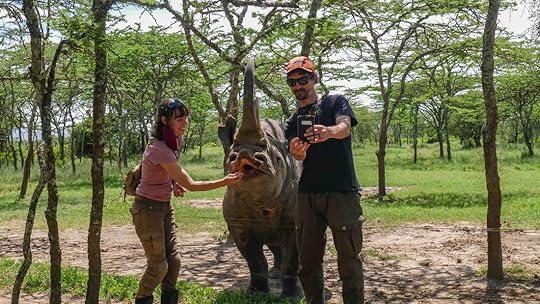 As our time in Africa slowly winds down to a close, I find myself thinking about all the incredible experiences we've had here. Some of these times include coming face to face with lions, elephants, rhinos, or delving into the food, cultures, and languages that make up this vast continent. But those are the expected treasures of Africa, the ones you see in brochures, or on instagram, and online travel articles.
As our time in Africa slowly winds down to a close, I find myself thinking about all the incredible experiences we've had here. Some of these times include coming face to face with lions, elephants, rhinos, or delving into the food, cultures, and languages that make up this vast continent. But those are the expected treasures of Africa, the ones you see in brochures, or on instagram, and online travel articles.
Today I'm going to talk about my favorite experiences that came as unexpected surprises, things that I never expected or even dreamed of happening. And even though all of my experiences here have been profound, and some even life-changing, it's the little things that sometimes hit home the hardest. The ones you don't see coming. Lunch With a Sotho Cowboy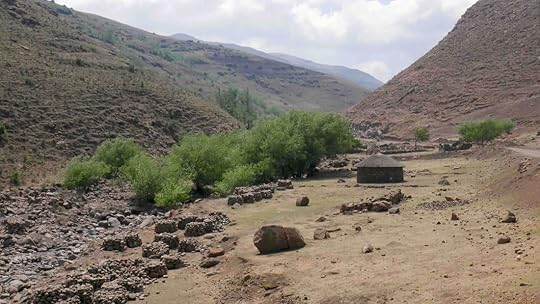 This was where we had lunch. We were in Lesotho, down a lovely country backroad surrounded by gorges cut by rivers through the mountains, rocky pasturelands, and little stone houses built into the landscape like they had always been there.
This was where we had lunch. We were in Lesotho, down a lovely country backroad surrounded by gorges cut by rivers through the mountains, rocky pasturelands, and little stone houses built into the landscape like they had always been there.
We pulled over at one of these "abandoned" houses for a lunch break, and while we were eating, a Sotho cowboy trotted up to us on his horse. I immediately thought, "Oh no, maybe this is his home and we're intruding on his land." But he came right up to us with a big smile and got off his horse to shake hands with us. We offered him some of our lunch which included bread and cheese, and hard boiled eggs. He greatly appreciated the food, and even though he couldn't speak English, he managed to offer us his horse in exchange for our motorcycle.
Of course, we jokingly agreed! I got on his horse, we snapped some pictures, while he admired our motorcycle. Finally, we went back to our respective beasts of burden, and he went on his way. It was a simple, but heart-warming moment.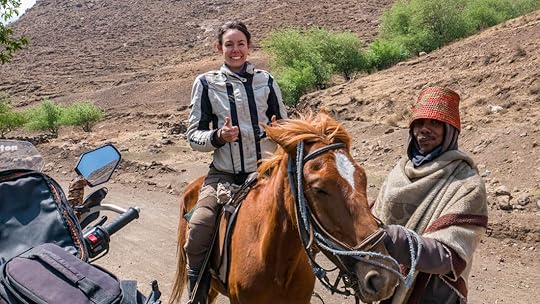 The Adventure Motorcyclists of South Africa
The Adventure Motorcyclists of South Africa 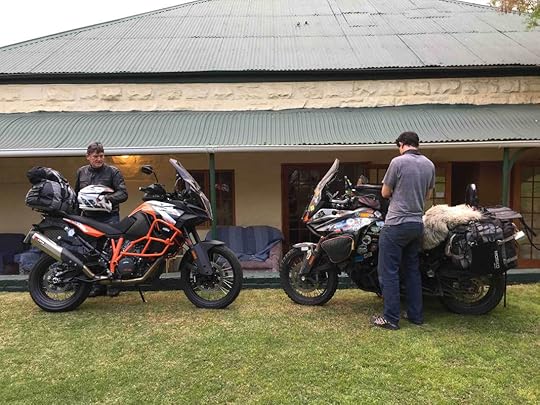 Jaques, Tim, and their dueling KTMs. When we first purchased our KTM 1190 back in 2014, we had one non-motorcycle friend who was familiar with the brand. Everyone else had never heard of it.
Jaques, Tim, and their dueling KTMs. When we first purchased our KTM 1190 back in 2014, we had one non-motorcycle friend who was familiar with the brand. Everyone else had never heard of it.
Since then, KTM has come a long way in popularity in the States, but it has always been popular in South Africa. In fact, the country has a robust and vibrant adventure motorcycle community of all brands, and many South Africans love to take these bikes on their thrilling backroads where they can really put a stamp of approval on the "adventure" motorcycle name.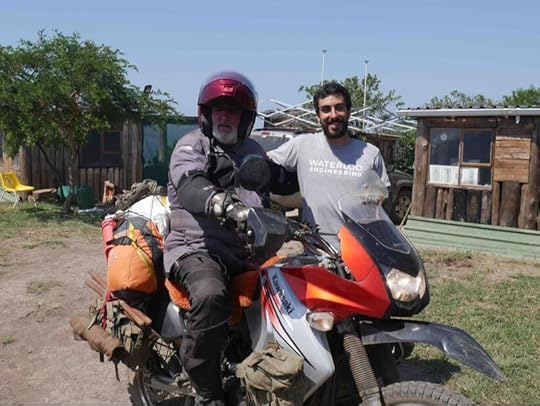 Peet and Emiliano
Peet and Emiliano 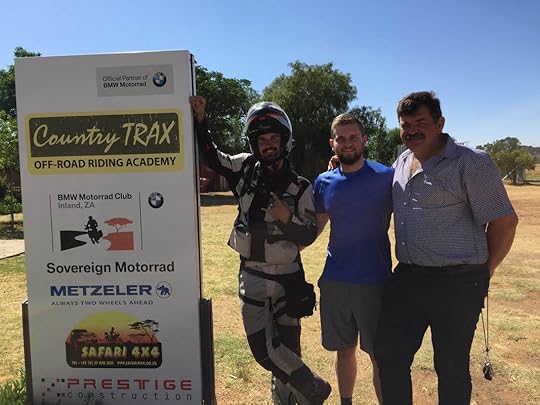 Tim, Behan, and Stephan Boshoff I remember we were staying at one campground in Oudtshoorn and I kid you not, ten other KTMs were parked next to ours in the parking lot. And that was just the KTMs. You can find BMWs all across South Africa, KLRs, and any other two wheeled vehicle that likes the dirt. We met so many incredible adventure motorcyclists there, and the generosity these people showed us simply cannot be compared. I had been apprehensive about going to a new continent and a new country where I didn't know anyone, but the fellow adventure motorcyclists of South Africa made me feel right at home. And I will be forever grateful. Carpooling with a Himba Woman
Tim, Behan, and Stephan Boshoff I remember we were staying at one campground in Oudtshoorn and I kid you not, ten other KTMs were parked next to ours in the parking lot. And that was just the KTMs. You can find BMWs all across South Africa, KLRs, and any other two wheeled vehicle that likes the dirt. We met so many incredible adventure motorcyclists there, and the generosity these people showed us simply cannot be compared. I had been apprehensive about going to a new continent and a new country where I didn't know anyone, but the fellow adventure motorcyclists of South Africa made me feel right at home. And I will be forever grateful. Carpooling with a Himba Woman 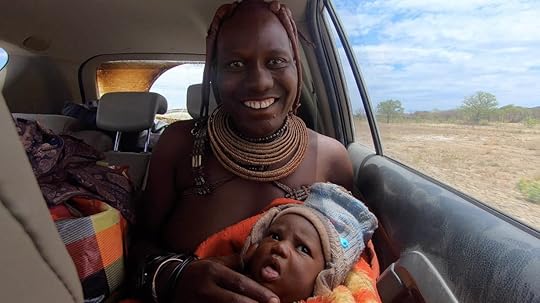 I had always wanted to meet the Himba people of Namibia, who are famous for their traditional lifestyle and the ochre resin the women coat on their hair and body. While the monoshock of our bike was being fixed, we rented a car to explore the country, which turned out to be very fortunate to have an extra seat when we came across a Himba village and they asked if we could drive one of their women and her newborn baby to another village near Etosha National Park. Of course we said yes!
I had always wanted to meet the Himba people of Namibia, who are famous for their traditional lifestyle and the ochre resin the women coat on their hair and body. While the monoshock of our bike was being fixed, we rented a car to explore the country, which turned out to be very fortunate to have an extra seat when we came across a Himba village and they asked if we could drive one of their women and her newborn baby to another village near Etosha National Park. Of course we said yes!
It was about a three hour drive, and even though we couldn't speak each other's languages, we had lots of fun listening to the Namibian music CD that had been left in the car. I would coo at the baby boy who was swaddled in blankets, and we even spotted some giraffes beside the road. Because the Himba women take "smoke baths", she filled our car with the smokey perfumes of her clothes, and it's a smell that I will always remember fondly.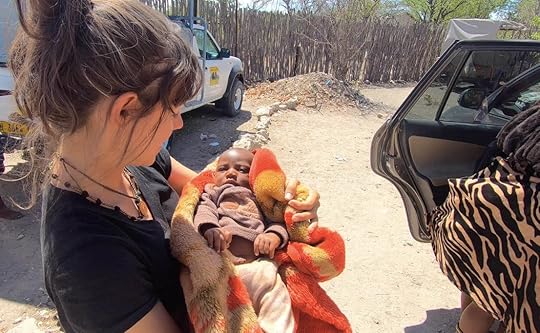 Finally, we reached the woman's camp, and as her family crowded around the baby, meeting the newborn for the first time, we waved our goodbyes. And were thrilled at what an incredible experience that was. The Firefly Christmas Lights of Zambia
Finally, we reached the woman's camp, and as her family crowded around the baby, meeting the newborn for the first time, we waved our goodbyes. And were thrilled at what an incredible experience that was. The Firefly Christmas Lights of Zambia 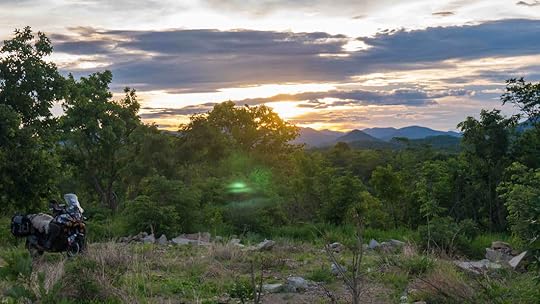 This was our campsite with an amazing view. It was the day after Christmas, and we were traveling through Zambia with an American motorcycle friend, Emiliano. We had pitched our tents at a wild camping spot high up in the mountains, and being the fantasy video game nerds that we all are, we decided to watch an episode of the Witcher (a show based on the video game and books) that we had downloaded on our phones. Emiliano was in his separate tent, but we pressed play at the same time so that we'd be watching it "together".
This was our campsite with an amazing view. It was the day after Christmas, and we were traveling through Zambia with an American motorcycle friend, Emiliano. We had pitched our tents at a wild camping spot high up in the mountains, and being the fantasy video game nerds that we all are, we decided to watch an episode of the Witcher (a show based on the video game and books) that we had downloaded on our phones. Emiliano was in his separate tent, but we pressed play at the same time so that we'd be watching it "together".
The sun had just set, and the forest of the many hills and mountains came alive in the sound of buzzing insects. And then about halfway through the episode, as we were just starting to immerse ourselves in the fantasy world on our tiny screens, I noticed something glowing outside. And then I saw a huge yellow light float over our tent, hovering around like a fairy. It was so bright, it made shadows around it like a lantern.
And there were more, a lot more. We all got our our tents to admire to magical light show of thousands upon thousands of these fireflies illuminating the hills in a twinkling ballet. And I realized that we didn't need a Netflix show to transport us to a fantasy world. We were already there. East African Home Away from Home During the Pandemic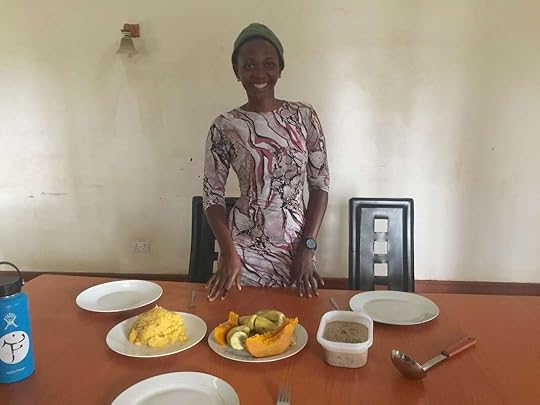 Thank you Irene for teaching me how to cook Ugandan Matoke. The pandemic was an unexpected surprise in the worst possible way. But as the people of Uganda and Kenya opened their arms to us and allowed us to stay in their home during this time of upheaval and the unknown, it was a show of the true character of Africa - one of kindness and hospitality even when facing difficulty. While many countries closed their borders and went under some form of lockdown, Uganda allowed us to stay beyond our visa limits without any problem. And Kenya has also been generous by allowing foreigners who present recent negative tests to enter and stay up to six months. We couldn't have been luckier.
Thank you Irene for teaching me how to cook Ugandan Matoke. The pandemic was an unexpected surprise in the worst possible way. But as the people of Uganda and Kenya opened their arms to us and allowed us to stay in their home during this time of upheaval and the unknown, it was a show of the true character of Africa - one of kindness and hospitality even when facing difficulty. While many countries closed their borders and went under some form of lockdown, Uganda allowed us to stay beyond our visa limits without any problem. And Kenya has also been generous by allowing foreigners who present recent negative tests to enter and stay up to six months. We couldn't have been luckier.
Moreover, these countries have handled the pandemic extremely well. With limited resources, they have taken crucial measures to keep their case numbers down and make sure their hospitals are not overwhelmed. I've been honored to spend this past year in East Africa, and I will always feel indebted to the people that make this beautiful region of the world feel like a second home to us when we were most in need of a safe and secure place.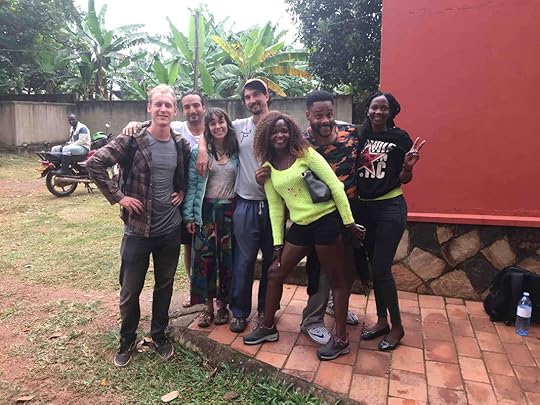 Next week, we will be traveling back to Uganda which is where we'll be flying home from. I'm not sure I'll be able to write a blog post next Sunday since we will most likely be on the road at that time. But I'll keep you posted on how things are going once we get there.
Next week, we will be traveling back to Uganda which is where we'll be flying home from. I'm not sure I'll be able to write a blog post next Sunday since we will most likely be on the road at that time. But I'll keep you posted on how things are going once we get there.
Happy Easter, and all the best to everyone. Subscribe to Our Blog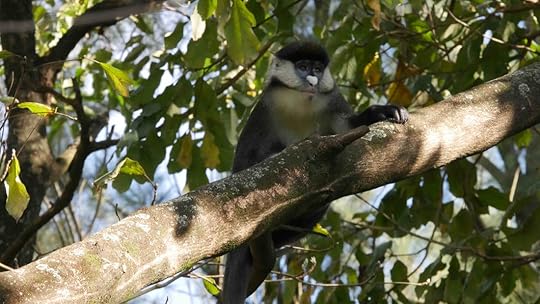 We will always remember Thomas, our neighborhood monkey friend with the coolest nose and goatee.
We will always remember Thomas, our neighborhood monkey friend with the coolest nose and goatee.
 As our time in Africa slowly winds down to a close, I find myself thinking about all the incredible experiences we've had here. Some of these times include coming face to face with lions, elephants, rhinos, or delving into the food, cultures, and languages that make up this vast continent. But those are the expected treasures of Africa, the ones you see in brochures, or on instagram, and online travel articles.
As our time in Africa slowly winds down to a close, I find myself thinking about all the incredible experiences we've had here. Some of these times include coming face to face with lions, elephants, rhinos, or delving into the food, cultures, and languages that make up this vast continent. But those are the expected treasures of Africa, the ones you see in brochures, or on instagram, and online travel articles.Today I'm going to talk about my favorite experiences that came as unexpected surprises, things that I never expected or even dreamed of happening. And even though all of my experiences here have been profound, and some even life-changing, it's the little things that sometimes hit home the hardest. The ones you don't see coming. Lunch With a Sotho Cowboy
 This was where we had lunch. We were in Lesotho, down a lovely country backroad surrounded by gorges cut by rivers through the mountains, rocky pasturelands, and little stone houses built into the landscape like they had always been there.
This was where we had lunch. We were in Lesotho, down a lovely country backroad surrounded by gorges cut by rivers through the mountains, rocky pasturelands, and little stone houses built into the landscape like they had always been there.We pulled over at one of these "abandoned" houses for a lunch break, and while we were eating, a Sotho cowboy trotted up to us on his horse. I immediately thought, "Oh no, maybe this is his home and we're intruding on his land." But he came right up to us with a big smile and got off his horse to shake hands with us. We offered him some of our lunch which included bread and cheese, and hard boiled eggs. He greatly appreciated the food, and even though he couldn't speak English, he managed to offer us his horse in exchange for our motorcycle.
Of course, we jokingly agreed! I got on his horse, we snapped some pictures, while he admired our motorcycle. Finally, we went back to our respective beasts of burden, and he went on his way. It was a simple, but heart-warming moment.
 The Adventure Motorcyclists of South Africa
The Adventure Motorcyclists of South Africa  Jaques, Tim, and their dueling KTMs. When we first purchased our KTM 1190 back in 2014, we had one non-motorcycle friend who was familiar with the brand. Everyone else had never heard of it.
Jaques, Tim, and their dueling KTMs. When we first purchased our KTM 1190 back in 2014, we had one non-motorcycle friend who was familiar with the brand. Everyone else had never heard of it.Since then, KTM has come a long way in popularity in the States, but it has always been popular in South Africa. In fact, the country has a robust and vibrant adventure motorcycle community of all brands, and many South Africans love to take these bikes on their thrilling backroads where they can really put a stamp of approval on the "adventure" motorcycle name.
 Peet and Emiliano
Peet and Emiliano  Tim, Behan, and Stephan Boshoff I remember we were staying at one campground in Oudtshoorn and I kid you not, ten other KTMs were parked next to ours in the parking lot. And that was just the KTMs. You can find BMWs all across South Africa, KLRs, and any other two wheeled vehicle that likes the dirt. We met so many incredible adventure motorcyclists there, and the generosity these people showed us simply cannot be compared. I had been apprehensive about going to a new continent and a new country where I didn't know anyone, but the fellow adventure motorcyclists of South Africa made me feel right at home. And I will be forever grateful. Carpooling with a Himba Woman
Tim, Behan, and Stephan Boshoff I remember we were staying at one campground in Oudtshoorn and I kid you not, ten other KTMs were parked next to ours in the parking lot. And that was just the KTMs. You can find BMWs all across South Africa, KLRs, and any other two wheeled vehicle that likes the dirt. We met so many incredible adventure motorcyclists there, and the generosity these people showed us simply cannot be compared. I had been apprehensive about going to a new continent and a new country where I didn't know anyone, but the fellow adventure motorcyclists of South Africa made me feel right at home. And I will be forever grateful. Carpooling with a Himba Woman  I had always wanted to meet the Himba people of Namibia, who are famous for their traditional lifestyle and the ochre resin the women coat on their hair and body. While the monoshock of our bike was being fixed, we rented a car to explore the country, which turned out to be very fortunate to have an extra seat when we came across a Himba village and they asked if we could drive one of their women and her newborn baby to another village near Etosha National Park. Of course we said yes!
I had always wanted to meet the Himba people of Namibia, who are famous for their traditional lifestyle and the ochre resin the women coat on their hair and body. While the monoshock of our bike was being fixed, we rented a car to explore the country, which turned out to be very fortunate to have an extra seat when we came across a Himba village and they asked if we could drive one of their women and her newborn baby to another village near Etosha National Park. Of course we said yes!It was about a three hour drive, and even though we couldn't speak each other's languages, we had lots of fun listening to the Namibian music CD that had been left in the car. I would coo at the baby boy who was swaddled in blankets, and we even spotted some giraffes beside the road. Because the Himba women take "smoke baths", she filled our car with the smokey perfumes of her clothes, and it's a smell that I will always remember fondly.
 Finally, we reached the woman's camp, and as her family crowded around the baby, meeting the newborn for the first time, we waved our goodbyes. And were thrilled at what an incredible experience that was. The Firefly Christmas Lights of Zambia
Finally, we reached the woman's camp, and as her family crowded around the baby, meeting the newborn for the first time, we waved our goodbyes. And were thrilled at what an incredible experience that was. The Firefly Christmas Lights of Zambia  This was our campsite with an amazing view. It was the day after Christmas, and we were traveling through Zambia with an American motorcycle friend, Emiliano. We had pitched our tents at a wild camping spot high up in the mountains, and being the fantasy video game nerds that we all are, we decided to watch an episode of the Witcher (a show based on the video game and books) that we had downloaded on our phones. Emiliano was in his separate tent, but we pressed play at the same time so that we'd be watching it "together".
This was our campsite with an amazing view. It was the day after Christmas, and we were traveling through Zambia with an American motorcycle friend, Emiliano. We had pitched our tents at a wild camping spot high up in the mountains, and being the fantasy video game nerds that we all are, we decided to watch an episode of the Witcher (a show based on the video game and books) that we had downloaded on our phones. Emiliano was in his separate tent, but we pressed play at the same time so that we'd be watching it "together".The sun had just set, and the forest of the many hills and mountains came alive in the sound of buzzing insects. And then about halfway through the episode, as we were just starting to immerse ourselves in the fantasy world on our tiny screens, I noticed something glowing outside. And then I saw a huge yellow light float over our tent, hovering around like a fairy. It was so bright, it made shadows around it like a lantern.
And there were more, a lot more. We all got our our tents to admire to magical light show of thousands upon thousands of these fireflies illuminating the hills in a twinkling ballet. And I realized that we didn't need a Netflix show to transport us to a fantasy world. We were already there. East African Home Away from Home During the Pandemic
 Thank you Irene for teaching me how to cook Ugandan Matoke. The pandemic was an unexpected surprise in the worst possible way. But as the people of Uganda and Kenya opened their arms to us and allowed us to stay in their home during this time of upheaval and the unknown, it was a show of the true character of Africa - one of kindness and hospitality even when facing difficulty. While many countries closed their borders and went under some form of lockdown, Uganda allowed us to stay beyond our visa limits without any problem. And Kenya has also been generous by allowing foreigners who present recent negative tests to enter and stay up to six months. We couldn't have been luckier.
Thank you Irene for teaching me how to cook Ugandan Matoke. The pandemic was an unexpected surprise in the worst possible way. But as the people of Uganda and Kenya opened their arms to us and allowed us to stay in their home during this time of upheaval and the unknown, it was a show of the true character of Africa - one of kindness and hospitality even when facing difficulty. While many countries closed their borders and went under some form of lockdown, Uganda allowed us to stay beyond our visa limits without any problem. And Kenya has also been generous by allowing foreigners who present recent negative tests to enter and stay up to six months. We couldn't have been luckier.Moreover, these countries have handled the pandemic extremely well. With limited resources, they have taken crucial measures to keep their case numbers down and make sure their hospitals are not overwhelmed. I've been honored to spend this past year in East Africa, and I will always feel indebted to the people that make this beautiful region of the world feel like a second home to us when we were most in need of a safe and secure place.
 Next week, we will be traveling back to Uganda which is where we'll be flying home from. I'm not sure I'll be able to write a blog post next Sunday since we will most likely be on the road at that time. But I'll keep you posted on how things are going once we get there.
Next week, we will be traveling back to Uganda which is where we'll be flying home from. I'm not sure I'll be able to write a blog post next Sunday since we will most likely be on the road at that time. But I'll keep you posted on how things are going once we get there.Happy Easter, and all the best to everyone. Subscribe to Our Blog
 We will always remember Thomas, our neighborhood monkey friend with the coolest nose and goatee.
We will always remember Thomas, our neighborhood monkey friend with the coolest nose and goatee.
Published on April 03, 2021 23:58
March 27, 2021
Change of Plans
By Marisa Notier The Notier Notes Our Sunday Scoop 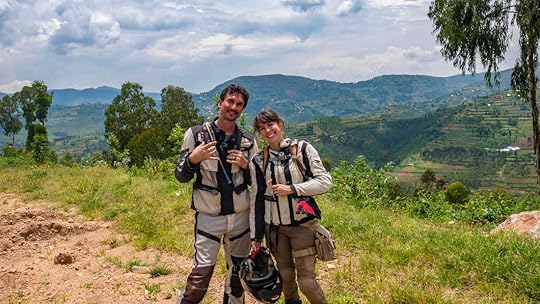 Kenya just went under another lockdown yesterday, restricting travel once again. This is due to a new wave of Coronavirus cases, and we're currently not sure what this is going to mean for us to move to Uganda once our Kenyan visas expire in two weeks. But we'll hopefully get that figured out soon.
Kenya just went under another lockdown yesterday, restricting travel once again. This is due to a new wave of Coronavirus cases, and we're currently not sure what this is going to mean for us to move to Uganda once our Kenyan visas expire in two weeks. But we'll hopefully get that figured out soon.
What this lockdown also hints at is the fact that this part of the world is no longer the best place for us to stay. The US and the UK have had a fantastic vaccine roll-out so far, and their cases are dropping as they start to get control over the virus. But poorer countries have been falling behind. This includes most of Africa.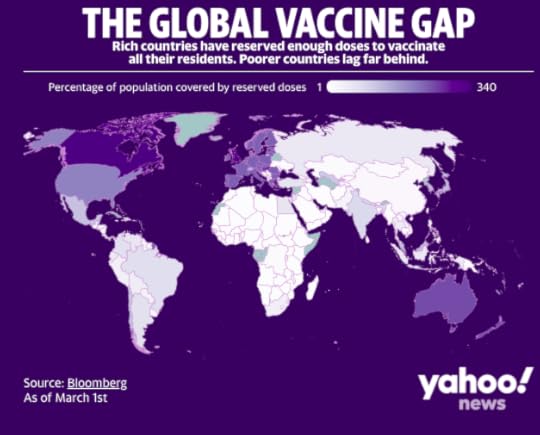 Right now, Kenya has a plan to vaccinate 30% of its population by June of 2023. Yes, you read that right - 2023! Whereas Canada has enough vaccines to inoculate all their people 9 times over, African countries have 0.2 vaccines per person. For an example, at the rate that South Africa is currently able to vaccinate its population, it would take over ten years for them to get 75% vaccinated. And since most of the world's supply has already been bought up for the next year, Kenya and other countries around here will most likely be unable to get much more than they already have. So the chance of us getting vaccinated here in 2021 is slim to none.
Right now, Kenya has a plan to vaccinate 30% of its population by June of 2023. Yes, you read that right - 2023! Whereas Canada has enough vaccines to inoculate all their people 9 times over, African countries have 0.2 vaccines per person. For an example, at the rate that South Africa is currently able to vaccinate its population, it would take over ten years for them to get 75% vaccinated. And since most of the world's supply has already been bought up for the next year, Kenya and other countries around here will most likely be unable to get much more than they already have. So the chance of us getting vaccinated here in 2021 is slim to none.
Another problem with staying here is that we can't travel easily at the moment, nor anytime in the foreseeable future. Most African countries have opened up to tourism, but you need to present a negative test before crossing a border, and each test costs around $100 a person. And they don't have the new tests here. They have the scrape-your-brains-out-through-your-nose-with-a-giant-Q-tip tests. Not fun at all.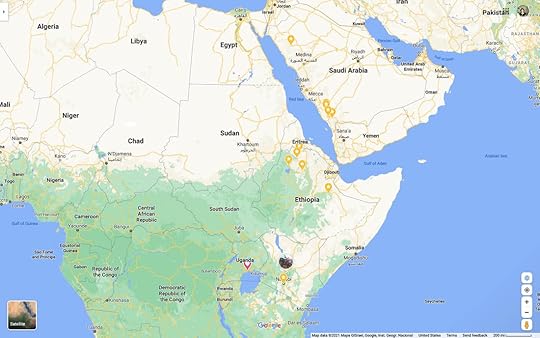 As you can see, without Ethiopia, the route north to Egypt from Kenya is pretty much blocked. Then there's the problem of not being able to go north. Ethiopia is the next country north of us and with the conflict and war in the Tigray region, in addition to the virus, it isn't necessarily an awesome option at the moment. But besides that, Ethiopia's borders have been completely closed down since the pandemic started. There's no way through.
As you can see, without Ethiopia, the route north to Egypt from Kenya is pretty much blocked. Then there's the problem of not being able to go north. Ethiopia is the next country north of us and with the conflict and war in the Tigray region, in addition to the virus, it isn't necessarily an awesome option at the moment. But besides that, Ethiopia's borders have been completely closed down since the pandemic started. There's no way through.
Looking at a map, there really isn't a way to get north to Egypt. We could possibly go through Uganda to South Sudan, then into Sudan, but it's dangerous, and there are no official border posts or hotels along the way. Basically, even without the Coronavirus messing up everything, we're stuck. We've gone as far as we can go in Africa at the moment.
So we've decided to move back to North America. We're going home for a year.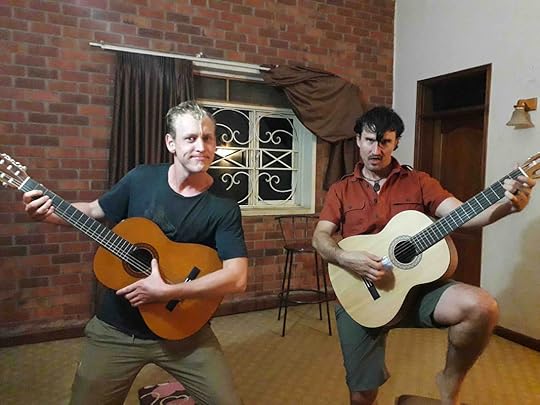 Africa has certainly been fun, but I think our time here has come to an end (for now). We've thought long and hard about it, but we've come to the conclusion that the best thing to do is fly ourselves and the motorcycle back to the States whenever we can. This is for three reasons. 1 - We can't get vaccinated here. 2 - We can't travel through Africa. And 3 - If we're just sitting around waiting for the world to get travel-ready once again, we might as well be making some money while we wait.
Africa has certainly been fun, but I think our time here has come to an end (for now). We've thought long and hard about it, but we've come to the conclusion that the best thing to do is fly ourselves and the motorcycle back to the States whenever we can. This is for three reasons. 1 - We can't get vaccinated here. 2 - We can't travel through Africa. And 3 - If we're just sitting around waiting for the world to get travel-ready once again, we might as well be making some money while we wait.
One of the best things about going home for a year is we get to see our friends and family. Once we're vaccinated and things start opening up again, we can possibly travel around the country, and maybe give speeches at events. (If you happen to reside somewhere in the States, send us a message, because it would be wonderful to meet up with our readers!)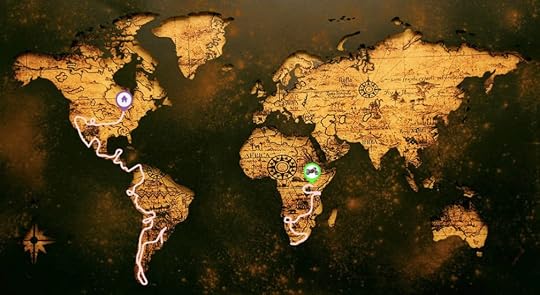 We've covered a lot of ground throughout our travels, but there's still so much more of the world to see... We can also get jobs and save up some money for our next round of travels. So what does this mean for our blog? I'll keep sending out our Sunday Scoops as long as our lives are interesting. If I do take a break for a while, we'll be sure to start up again once we get ready for our next set of adventures.
We've covered a lot of ground throughout our travels, but there's still so much more of the world to see... We can also get jobs and save up some money for our next round of travels. So what does this mean for our blog? I'll keep sending out our Sunday Scoops as long as our lives are interesting. If I do take a break for a while, we'll be sure to start up again once we get ready for our next set of adventures.
And where will that be? Will we wait until Ethiopia opens again and pick up where we left off? Or will we head straight to Europe, or start someplace totally different like Southeast Asia? We don't know right now. But it's going to be fun planning it all out.
But I don't want to get ahead of myself. First we have to somehow get ourselves out of here, and that's not going to be a walk in the park. So stay tuned, and we'll keep you updated on what is to come.
Subscribe to Our Blog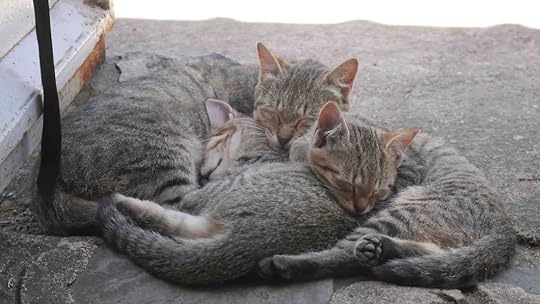 We're really going to miss these guys... But we'll be seeing new people (and new cats) in the future.
We're really going to miss these guys... But we'll be seeing new people (and new cats) in the future.
 Kenya just went under another lockdown yesterday, restricting travel once again. This is due to a new wave of Coronavirus cases, and we're currently not sure what this is going to mean for us to move to Uganda once our Kenyan visas expire in two weeks. But we'll hopefully get that figured out soon.
Kenya just went under another lockdown yesterday, restricting travel once again. This is due to a new wave of Coronavirus cases, and we're currently not sure what this is going to mean for us to move to Uganda once our Kenyan visas expire in two weeks. But we'll hopefully get that figured out soon.What this lockdown also hints at is the fact that this part of the world is no longer the best place for us to stay. The US and the UK have had a fantastic vaccine roll-out so far, and their cases are dropping as they start to get control over the virus. But poorer countries have been falling behind. This includes most of Africa.
 Right now, Kenya has a plan to vaccinate 30% of its population by June of 2023. Yes, you read that right - 2023! Whereas Canada has enough vaccines to inoculate all their people 9 times over, African countries have 0.2 vaccines per person. For an example, at the rate that South Africa is currently able to vaccinate its population, it would take over ten years for them to get 75% vaccinated. And since most of the world's supply has already been bought up for the next year, Kenya and other countries around here will most likely be unable to get much more than they already have. So the chance of us getting vaccinated here in 2021 is slim to none.
Right now, Kenya has a plan to vaccinate 30% of its population by June of 2023. Yes, you read that right - 2023! Whereas Canada has enough vaccines to inoculate all their people 9 times over, African countries have 0.2 vaccines per person. For an example, at the rate that South Africa is currently able to vaccinate its population, it would take over ten years for them to get 75% vaccinated. And since most of the world's supply has already been bought up for the next year, Kenya and other countries around here will most likely be unable to get much more than they already have. So the chance of us getting vaccinated here in 2021 is slim to none.Another problem with staying here is that we can't travel easily at the moment, nor anytime in the foreseeable future. Most African countries have opened up to tourism, but you need to present a negative test before crossing a border, and each test costs around $100 a person. And they don't have the new tests here. They have the scrape-your-brains-out-through-your-nose-with-a-giant-Q-tip tests. Not fun at all.
 As you can see, without Ethiopia, the route north to Egypt from Kenya is pretty much blocked. Then there's the problem of not being able to go north. Ethiopia is the next country north of us and with the conflict and war in the Tigray region, in addition to the virus, it isn't necessarily an awesome option at the moment. But besides that, Ethiopia's borders have been completely closed down since the pandemic started. There's no way through.
As you can see, without Ethiopia, the route north to Egypt from Kenya is pretty much blocked. Then there's the problem of not being able to go north. Ethiopia is the next country north of us and with the conflict and war in the Tigray region, in addition to the virus, it isn't necessarily an awesome option at the moment. But besides that, Ethiopia's borders have been completely closed down since the pandemic started. There's no way through.Looking at a map, there really isn't a way to get north to Egypt. We could possibly go through Uganda to South Sudan, then into Sudan, but it's dangerous, and there are no official border posts or hotels along the way. Basically, even without the Coronavirus messing up everything, we're stuck. We've gone as far as we can go in Africa at the moment.
So we've decided to move back to North America. We're going home for a year.
 Africa has certainly been fun, but I think our time here has come to an end (for now). We've thought long and hard about it, but we've come to the conclusion that the best thing to do is fly ourselves and the motorcycle back to the States whenever we can. This is for three reasons. 1 - We can't get vaccinated here. 2 - We can't travel through Africa. And 3 - If we're just sitting around waiting for the world to get travel-ready once again, we might as well be making some money while we wait.
Africa has certainly been fun, but I think our time here has come to an end (for now). We've thought long and hard about it, but we've come to the conclusion that the best thing to do is fly ourselves and the motorcycle back to the States whenever we can. This is for three reasons. 1 - We can't get vaccinated here. 2 - We can't travel through Africa. And 3 - If we're just sitting around waiting for the world to get travel-ready once again, we might as well be making some money while we wait.One of the best things about going home for a year is we get to see our friends and family. Once we're vaccinated and things start opening up again, we can possibly travel around the country, and maybe give speeches at events. (If you happen to reside somewhere in the States, send us a message, because it would be wonderful to meet up with our readers!)
 We've covered a lot of ground throughout our travels, but there's still so much more of the world to see... We can also get jobs and save up some money for our next round of travels. So what does this mean for our blog? I'll keep sending out our Sunday Scoops as long as our lives are interesting. If I do take a break for a while, we'll be sure to start up again once we get ready for our next set of adventures.
We've covered a lot of ground throughout our travels, but there's still so much more of the world to see... We can also get jobs and save up some money for our next round of travels. So what does this mean for our blog? I'll keep sending out our Sunday Scoops as long as our lives are interesting. If I do take a break for a while, we'll be sure to start up again once we get ready for our next set of adventures.And where will that be? Will we wait until Ethiopia opens again and pick up where we left off? Or will we head straight to Europe, or start someplace totally different like Southeast Asia? We don't know right now. But it's going to be fun planning it all out.
But I don't want to get ahead of myself. First we have to somehow get ourselves out of here, and that's not going to be a walk in the park. So stay tuned, and we'll keep you updated on what is to come.
Subscribe to Our Blog
 We're really going to miss these guys... But we'll be seeing new people (and new cats) in the future.
We're really going to miss these guys... But we'll be seeing new people (and new cats) in the future.
Published on March 27, 2021 22:47
March 21, 2021
The 5 Best Roads of Africa
By Marisa Notier The Notier Notes Our Sunday Scoop 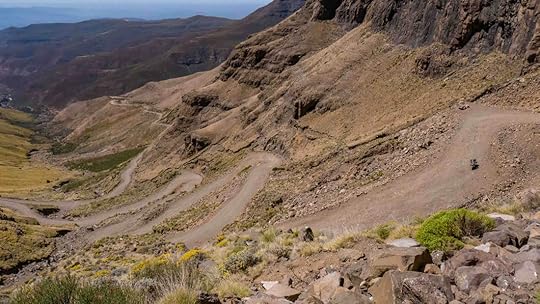 Dreaming about traveling again? This week I'll go over some of our favorite roads that we've come across in Africa. Obviously there's a lot of Africa we haven't seen, and these are just our humble opinions. But during our travels here, we've come across some real incredible gems that we would like to share with the world.
Dreaming about traveling again? This week I'll go over some of our favorite roads that we've come across in Africa. Obviously there's a lot of Africa we haven't seen, and these are just our humble opinions. But during our travels here, we've come across some real incredible gems that we would like to share with the world.
There's nothing better than being on a motorcycle, drifting down a perfectly twisty mountain road, and being surrounded by stunning views. So if you ever find yourself on the African continent and with a vehicle, these are definitely some places to check out.
The following are our top 5 roads - #5 - Livingstonia to Lake Malawi - Malawi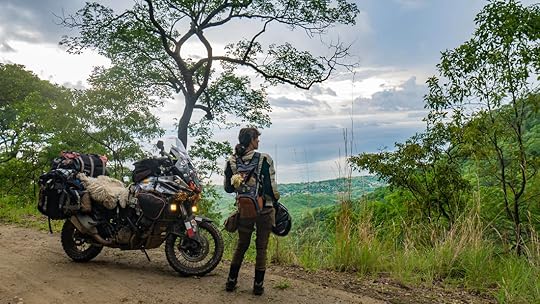 This road starts high up in the mountains of Malawi, and steeply winds down the hillside with turquoise vistas of Lake Malawi in the distance. It's gravel and bumpy, so a good knowledge of off-road handling is important. But if you can do it, it's well worth the potholes.
This road starts high up in the mountains of Malawi, and steeply winds down the hillside with turquoise vistas of Lake Malawi in the distance. It's gravel and bumpy, so a good knowledge of off-road handling is important. But if you can do it, it's well worth the potholes. 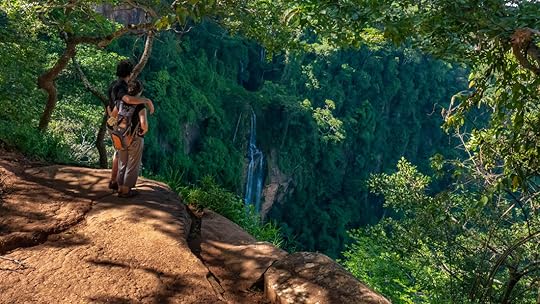 Manchewe Waterfalls We recommend first coming the back way into the town of Livingstonia from the southwest, from Haniniya (also a pretty drive). Then making a stop at the impressive Manchewe Waterfalls (keep your eyes out for monkeys). You might want to stay the night in a Overlander hotspot called Mushroom Farm before making your way down the mountainside the next day. Once you get to the bottom, reward yourself by taking a dip in the lake (just watch out for crocodiles, we were warned about that there).
Manchewe Waterfalls We recommend first coming the back way into the town of Livingstonia from the southwest, from Haniniya (also a pretty drive). Then making a stop at the impressive Manchewe Waterfalls (keep your eyes out for monkeys). You might want to stay the night in a Overlander hotspot called Mushroom Farm before making your way down the mountainside the next day. Once you get to the bottom, reward yourself by taking a dip in the lake (just watch out for crocodiles, we were warned about that there).  When we did this road, we had an electrical problem with the bike, and it kept shorting out and shutting off. Thank goodness the entirety of the road was downhill, and once we got to the bottom by the lake, we were able to keep it running long enough to get to a hotel and fix it. It was an adventure, and surely one to remember! #4 - Road by Elephant Sands - Botswana
When we did this road, we had an electrical problem with the bike, and it kept shorting out and shutting off. Thank goodness the entirety of the road was downhill, and once we got to the bottom by the lake, we were able to keep it running long enough to get to a hotel and fix it. It was an adventure, and surely one to remember! #4 - Road by Elephant Sands - Botswana 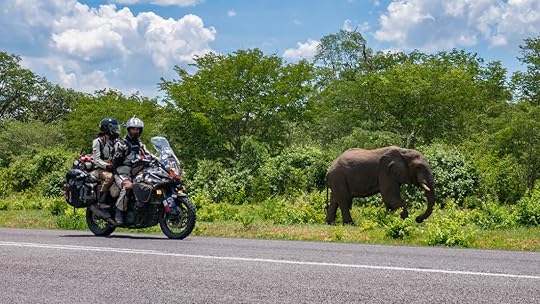 This may be one of the most unique roads in the world, not because there's anything particularly special about the road itself. The A33 running north/south from Nata to Kasana is flat, and goes through hot shrub lands, but what makes it so great is the amount of wild elephants that cross the road. You're pretty much guaranteed to see one, but be careful not to get charged by one as you take your selfies of you, the motorcycle, and your new giant friend. And riding at night is extremely dangerous due to the fact that elephants blend into the dark very easily (I know, it didn't seem right for something so big to be so invisible).
This may be one of the most unique roads in the world, not because there's anything particularly special about the road itself. The A33 running north/south from Nata to Kasana is flat, and goes through hot shrub lands, but what makes it so great is the amount of wild elephants that cross the road. You're pretty much guaranteed to see one, but be careful not to get charged by one as you take your selfies of you, the motorcycle, and your new giant friend. And riding at night is extremely dangerous due to the fact that elephants blend into the dark very easily (I know, it didn't seem right for something so big to be so invisible). 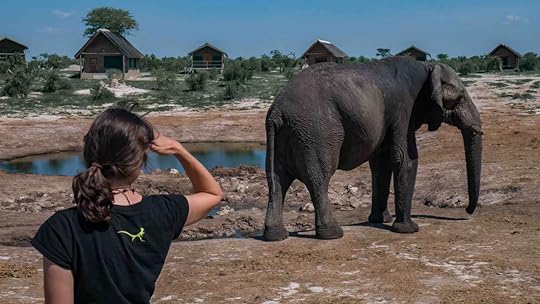 Along the way, there's a great stop called Elephant Sands (be warned, just like the name suggests, it can get sandy there). It's a hotel/campground that feels like you're in the middle of an elephant zoo enclosure, but actually, these guys are wild. They've been coming to the waterhole there for generations, and now there's a visitor's center with a pool overlooking the view, along with cabins and bungalows. Or, if you want to be ultra crazy like us, pitch your tent right in the field where the elephants roam. The people there assured us we wouldn't get trampled on, but when I heard those dinosaur-like footsteps vibrating the earth at night, and the low grumbling sounds the make, I'll admit, I was scared. These elephants will walk right past you, and it's an experience of a lifetime.
Along the way, there's a great stop called Elephant Sands (be warned, just like the name suggests, it can get sandy there). It's a hotel/campground that feels like you're in the middle of an elephant zoo enclosure, but actually, these guys are wild. They've been coming to the waterhole there for generations, and now there's a visitor's center with a pool overlooking the view, along with cabins and bungalows. Or, if you want to be ultra crazy like us, pitch your tent right in the field where the elephants roam. The people there assured us we wouldn't get trampled on, but when I heard those dinosaur-like footsteps vibrating the earth at night, and the low grumbling sounds the make, I'll admit, I was scared. These elephants will walk right past you, and it's an experience of a lifetime. 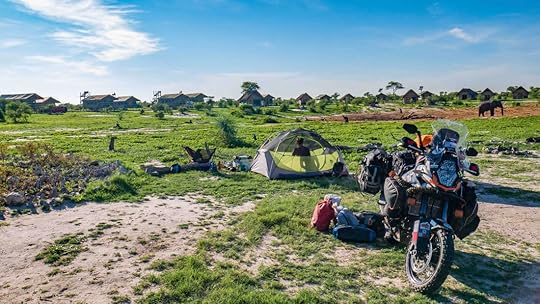 #3 - The Wild Coast - South Africa South Africa is a vast country will all sorts of incredible landscapes. Also, the infrastructure there is very good, so the roads can be just a joy to ride on. So it was hard choosing our favorite road, but for me, the Wild Coast holds a special place in my heart.
#3 - The Wild Coast - South Africa South Africa is a vast country will all sorts of incredible landscapes. Also, the infrastructure there is very good, so the roads can be just a joy to ride on. So it was hard choosing our favorite road, but for me, the Wild Coast holds a special place in my heart. 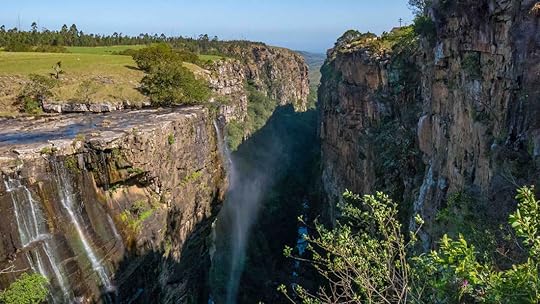 It's not really just one road, but the region as a whole is a network of dirt twisties and coastal views. The Wild Coast is the stretch of land between East London and Durban in the Eastern Cape. First and foremost, you must stop in Coffee Bay to see and hear the power of the sea smashing through the "Hole in the Wall". And keep a lookout for whales, the area is known for them.
It's not really just one road, but the region as a whole is a network of dirt twisties and coastal views. The Wild Coast is the stretch of land between East London and Durban in the Eastern Cape. First and foremost, you must stop in Coffee Bay to see and hear the power of the sea smashing through the "Hole in the Wall". And keep a lookout for whales, the area is known for them. 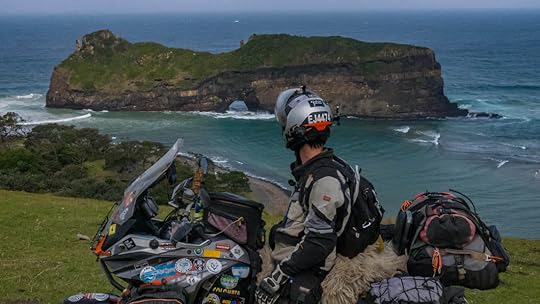 Then I recommend getting lost in all the roads, stopping by little villages of Xhosa people, and finally, take a hike to Waterfall Bluff which has one of the world's only waterfalls that spills into the ocean. These roads are not for the faint of heart (they don't call it the Wild Coast for nothing), but they're sure to put a smile on your face. #2 - Nyungwe Forest - Rwanda
Then I recommend getting lost in all the roads, stopping by little villages of Xhosa people, and finally, take a hike to Waterfall Bluff which has one of the world's only waterfalls that spills into the ocean. These roads are not for the faint of heart (they don't call it the Wild Coast for nothing), but they're sure to put a smile on your face. #2 - Nyungwe Forest - Rwanda 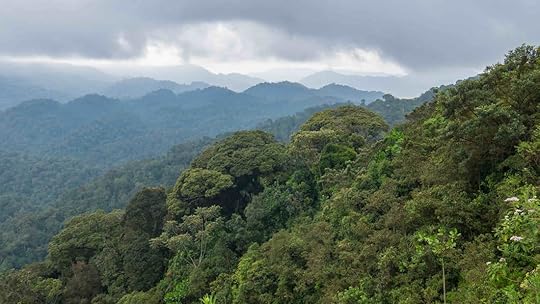 Even though Rwanda is tiny, it packs a punch. The whole place is just a wrinkle of mountains, and the roads are all a smooth curvy dream to ride on. Also, the patchwork of farms of coffee and tea fields make it as picturesque as can be. And you will never have seen more green in your life, as the Central African rains make the country lush and verdant.
Even though Rwanda is tiny, it packs a punch. The whole place is just a wrinkle of mountains, and the roads are all a smooth curvy dream to ride on. Also, the patchwork of farms of coffee and tea fields make it as picturesque as can be. And you will never have seen more green in your life, as the Central African rains make the country lush and verdant. 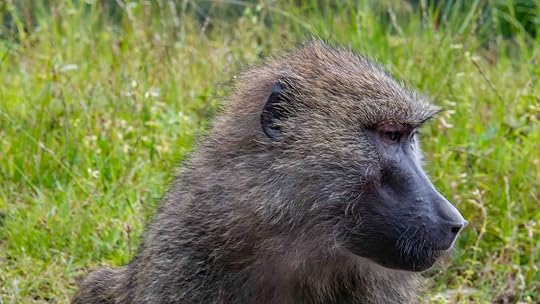 But my favorite part of Rwanda was the road through Nyungwe Forest. You don't have to pay anything to experience the magic of this forest. And not only is the road perfectly pristine and well-engineered with overlook stops and even street lights, but it's also incredibly wild as it goes through a jungle the likes of which is out of Tarzan. If you don't see a monkey on this ride, then there's something wrong, but this park has 13 primate species, including wild chimpanzees! You can also go on a canopy walkway, or take a hike to one of the park's many waterfalls.
But my favorite part of Rwanda was the road through Nyungwe Forest. You don't have to pay anything to experience the magic of this forest. And not only is the road perfectly pristine and well-engineered with overlook stops and even street lights, but it's also incredibly wild as it goes through a jungle the likes of which is out of Tarzan. If you don't see a monkey on this ride, then there's something wrong, but this park has 13 primate species, including wild chimpanzees! You can also go on a canopy walkway, or take a hike to one of the park's many waterfalls.
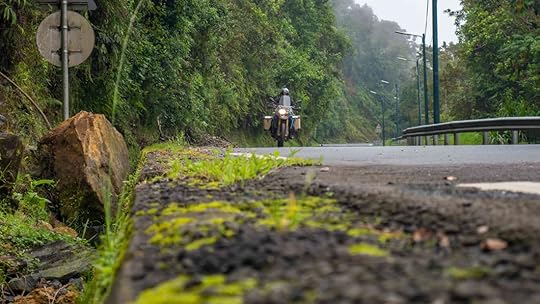 You'll notice that this road is also heavily guarded, as in, every hundred feet or so there's a guard. This is to protect the wildlife from poaching and because the park borders the DRC, but it is a bit disconcerting as you ride along. Still, there's so much else to grab your attention, you don't even notice after a while. While we rode through, I was listening to the Avatar soundtrack, and it couldn't have been more perfect! #1 - Sani Pass - Lesotho
You'll notice that this road is also heavily guarded, as in, every hundred feet or so there's a guard. This is to protect the wildlife from poaching and because the park borders the DRC, but it is a bit disconcerting as you ride along. Still, there's so much else to grab your attention, you don't even notice after a while. While we rode through, I was listening to the Avatar soundtrack, and it couldn't have been more perfect! #1 - Sani Pass - Lesotho 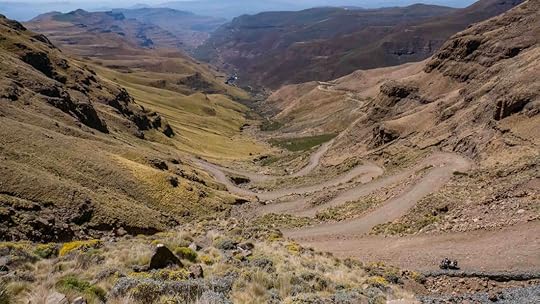 And finally, my favorite place in Africa for its roads is Lesotho. The mountains and grasslands of Lesotho are vast and sprawling, giving you a real sense of the majesty of the place. Pretty much pick any road in this country, and you've won the road jackpot (be careful, it's high altitude there and can get really cold and icy).
And finally, my favorite place in Africa for its roads is Lesotho. The mountains and grasslands of Lesotho are vast and sprawling, giving you a real sense of the majesty of the place. Pretty much pick any road in this country, and you've won the road jackpot (be careful, it's high altitude there and can get really cold and icy). 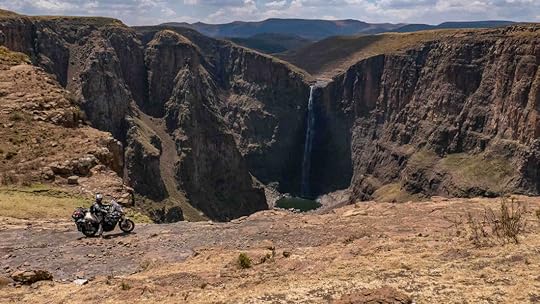 Sani Pass is probably the region's most famous road. Technically, it's on the border of South Africa and Lesotho, and this road is known for being difficult. It has steep, steep switchbacks, and then some more switchbacks. And to make it all worse, it is filled with loose rocks. Motorcycle and 4-wheeled vehicles struggle alike, and there's a real debate as to whether going up or down the road is better. We went down it, and dropped the bike a couple times, but we made it. I consider that to be an accomplishment!
Sani Pass is probably the region's most famous road. Technically, it's on the border of South Africa and Lesotho, and this road is known for being difficult. It has steep, steep switchbacks, and then some more switchbacks. And to make it all worse, it is filled with loose rocks. Motorcycle and 4-wheeled vehicles struggle alike, and there's a real debate as to whether going up or down the road is better. We went down it, and dropped the bike a couple times, but we made it. I consider that to be an accomplishment! 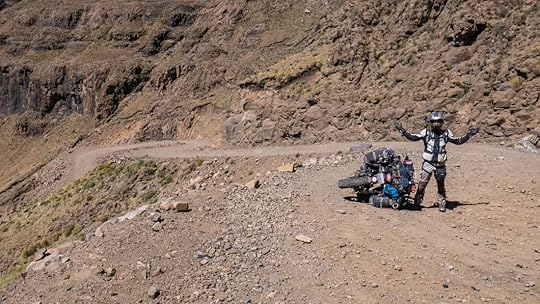 I hope you've enjoyed our list. If there are any roads we've missed that are your favorite, please let us know! Subscribe to Our Blog For more two-wheeled inspiration, check out Tim's books, and we're hoping to have the third one released in a few months!
I hope you've enjoyed our list. If there are any roads we've missed that are your favorite, please let us know! Subscribe to Our Blog For more two-wheeled inspiration, check out Tim's books, and we're hoping to have the third one released in a few months! 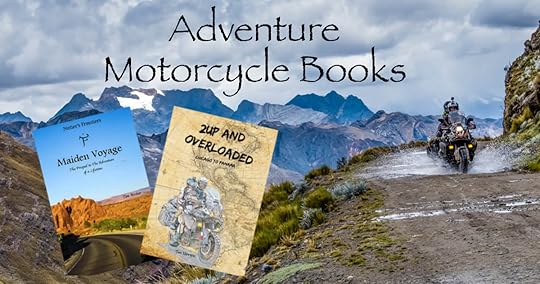
 Dreaming about traveling again? This week I'll go over some of our favorite roads that we've come across in Africa. Obviously there's a lot of Africa we haven't seen, and these are just our humble opinions. But during our travels here, we've come across some real incredible gems that we would like to share with the world.
Dreaming about traveling again? This week I'll go over some of our favorite roads that we've come across in Africa. Obviously there's a lot of Africa we haven't seen, and these are just our humble opinions. But during our travels here, we've come across some real incredible gems that we would like to share with the world.There's nothing better than being on a motorcycle, drifting down a perfectly twisty mountain road, and being surrounded by stunning views. So if you ever find yourself on the African continent and with a vehicle, these are definitely some places to check out.
The following are our top 5 roads - #5 - Livingstonia to Lake Malawi - Malawi
 This road starts high up in the mountains of Malawi, and steeply winds down the hillside with turquoise vistas of Lake Malawi in the distance. It's gravel and bumpy, so a good knowledge of off-road handling is important. But if you can do it, it's well worth the potholes.
This road starts high up in the mountains of Malawi, and steeply winds down the hillside with turquoise vistas of Lake Malawi in the distance. It's gravel and bumpy, so a good knowledge of off-road handling is important. But if you can do it, it's well worth the potholes.  Manchewe Waterfalls We recommend first coming the back way into the town of Livingstonia from the southwest, from Haniniya (also a pretty drive). Then making a stop at the impressive Manchewe Waterfalls (keep your eyes out for monkeys). You might want to stay the night in a Overlander hotspot called Mushroom Farm before making your way down the mountainside the next day. Once you get to the bottom, reward yourself by taking a dip in the lake (just watch out for crocodiles, we were warned about that there).
Manchewe Waterfalls We recommend first coming the back way into the town of Livingstonia from the southwest, from Haniniya (also a pretty drive). Then making a stop at the impressive Manchewe Waterfalls (keep your eyes out for monkeys). You might want to stay the night in a Overlander hotspot called Mushroom Farm before making your way down the mountainside the next day. Once you get to the bottom, reward yourself by taking a dip in the lake (just watch out for crocodiles, we were warned about that there).  When we did this road, we had an electrical problem with the bike, and it kept shorting out and shutting off. Thank goodness the entirety of the road was downhill, and once we got to the bottom by the lake, we were able to keep it running long enough to get to a hotel and fix it. It was an adventure, and surely one to remember! #4 - Road by Elephant Sands - Botswana
When we did this road, we had an electrical problem with the bike, and it kept shorting out and shutting off. Thank goodness the entirety of the road was downhill, and once we got to the bottom by the lake, we were able to keep it running long enough to get to a hotel and fix it. It was an adventure, and surely one to remember! #4 - Road by Elephant Sands - Botswana  This may be one of the most unique roads in the world, not because there's anything particularly special about the road itself. The A33 running north/south from Nata to Kasana is flat, and goes through hot shrub lands, but what makes it so great is the amount of wild elephants that cross the road. You're pretty much guaranteed to see one, but be careful not to get charged by one as you take your selfies of you, the motorcycle, and your new giant friend. And riding at night is extremely dangerous due to the fact that elephants blend into the dark very easily (I know, it didn't seem right for something so big to be so invisible).
This may be one of the most unique roads in the world, not because there's anything particularly special about the road itself. The A33 running north/south from Nata to Kasana is flat, and goes through hot shrub lands, but what makes it so great is the amount of wild elephants that cross the road. You're pretty much guaranteed to see one, but be careful not to get charged by one as you take your selfies of you, the motorcycle, and your new giant friend. And riding at night is extremely dangerous due to the fact that elephants blend into the dark very easily (I know, it didn't seem right for something so big to be so invisible).  Along the way, there's a great stop called Elephant Sands (be warned, just like the name suggests, it can get sandy there). It's a hotel/campground that feels like you're in the middle of an elephant zoo enclosure, but actually, these guys are wild. They've been coming to the waterhole there for generations, and now there's a visitor's center with a pool overlooking the view, along with cabins and bungalows. Or, if you want to be ultra crazy like us, pitch your tent right in the field where the elephants roam. The people there assured us we wouldn't get trampled on, but when I heard those dinosaur-like footsteps vibrating the earth at night, and the low grumbling sounds the make, I'll admit, I was scared. These elephants will walk right past you, and it's an experience of a lifetime.
Along the way, there's a great stop called Elephant Sands (be warned, just like the name suggests, it can get sandy there). It's a hotel/campground that feels like you're in the middle of an elephant zoo enclosure, but actually, these guys are wild. They've been coming to the waterhole there for generations, and now there's a visitor's center with a pool overlooking the view, along with cabins and bungalows. Or, if you want to be ultra crazy like us, pitch your tent right in the field where the elephants roam. The people there assured us we wouldn't get trampled on, but when I heard those dinosaur-like footsteps vibrating the earth at night, and the low grumbling sounds the make, I'll admit, I was scared. These elephants will walk right past you, and it's an experience of a lifetime.  #3 - The Wild Coast - South Africa South Africa is a vast country will all sorts of incredible landscapes. Also, the infrastructure there is very good, so the roads can be just a joy to ride on. So it was hard choosing our favorite road, but for me, the Wild Coast holds a special place in my heart.
#3 - The Wild Coast - South Africa South Africa is a vast country will all sorts of incredible landscapes. Also, the infrastructure there is very good, so the roads can be just a joy to ride on. So it was hard choosing our favorite road, but for me, the Wild Coast holds a special place in my heart.  It's not really just one road, but the region as a whole is a network of dirt twisties and coastal views. The Wild Coast is the stretch of land between East London and Durban in the Eastern Cape. First and foremost, you must stop in Coffee Bay to see and hear the power of the sea smashing through the "Hole in the Wall". And keep a lookout for whales, the area is known for them.
It's not really just one road, but the region as a whole is a network of dirt twisties and coastal views. The Wild Coast is the stretch of land between East London and Durban in the Eastern Cape. First and foremost, you must stop in Coffee Bay to see and hear the power of the sea smashing through the "Hole in the Wall". And keep a lookout for whales, the area is known for them.  Then I recommend getting lost in all the roads, stopping by little villages of Xhosa people, and finally, take a hike to Waterfall Bluff which has one of the world's only waterfalls that spills into the ocean. These roads are not for the faint of heart (they don't call it the Wild Coast for nothing), but they're sure to put a smile on your face. #2 - Nyungwe Forest - Rwanda
Then I recommend getting lost in all the roads, stopping by little villages of Xhosa people, and finally, take a hike to Waterfall Bluff which has one of the world's only waterfalls that spills into the ocean. These roads are not for the faint of heart (they don't call it the Wild Coast for nothing), but they're sure to put a smile on your face. #2 - Nyungwe Forest - Rwanda  Even though Rwanda is tiny, it packs a punch. The whole place is just a wrinkle of mountains, and the roads are all a smooth curvy dream to ride on. Also, the patchwork of farms of coffee and tea fields make it as picturesque as can be. And you will never have seen more green in your life, as the Central African rains make the country lush and verdant.
Even though Rwanda is tiny, it packs a punch. The whole place is just a wrinkle of mountains, and the roads are all a smooth curvy dream to ride on. Also, the patchwork of farms of coffee and tea fields make it as picturesque as can be. And you will never have seen more green in your life, as the Central African rains make the country lush and verdant.  But my favorite part of Rwanda was the road through Nyungwe Forest. You don't have to pay anything to experience the magic of this forest. And not only is the road perfectly pristine and well-engineered with overlook stops and even street lights, but it's also incredibly wild as it goes through a jungle the likes of which is out of Tarzan. If you don't see a monkey on this ride, then there's something wrong, but this park has 13 primate species, including wild chimpanzees! You can also go on a canopy walkway, or take a hike to one of the park's many waterfalls.
But my favorite part of Rwanda was the road through Nyungwe Forest. You don't have to pay anything to experience the magic of this forest. And not only is the road perfectly pristine and well-engineered with overlook stops and even street lights, but it's also incredibly wild as it goes through a jungle the likes of which is out of Tarzan. If you don't see a monkey on this ride, then there's something wrong, but this park has 13 primate species, including wild chimpanzees! You can also go on a canopy walkway, or take a hike to one of the park's many waterfalls. You'll notice that this road is also heavily guarded, as in, every hundred feet or so there's a guard. This is to protect the wildlife from poaching and because the park borders the DRC, but it is a bit disconcerting as you ride along. Still, there's so much else to grab your attention, you don't even notice after a while. While we rode through, I was listening to the Avatar soundtrack, and it couldn't have been more perfect! #1 - Sani Pass - Lesotho
You'll notice that this road is also heavily guarded, as in, every hundred feet or so there's a guard. This is to protect the wildlife from poaching and because the park borders the DRC, but it is a bit disconcerting as you ride along. Still, there's so much else to grab your attention, you don't even notice after a while. While we rode through, I was listening to the Avatar soundtrack, and it couldn't have been more perfect! #1 - Sani Pass - Lesotho  And finally, my favorite place in Africa for its roads is Lesotho. The mountains and grasslands of Lesotho are vast and sprawling, giving you a real sense of the majesty of the place. Pretty much pick any road in this country, and you've won the road jackpot (be careful, it's high altitude there and can get really cold and icy).
And finally, my favorite place in Africa for its roads is Lesotho. The mountains and grasslands of Lesotho are vast and sprawling, giving you a real sense of the majesty of the place. Pretty much pick any road in this country, and you've won the road jackpot (be careful, it's high altitude there and can get really cold and icy).  Sani Pass is probably the region's most famous road. Technically, it's on the border of South Africa and Lesotho, and this road is known for being difficult. It has steep, steep switchbacks, and then some more switchbacks. And to make it all worse, it is filled with loose rocks. Motorcycle and 4-wheeled vehicles struggle alike, and there's a real debate as to whether going up or down the road is better. We went down it, and dropped the bike a couple times, but we made it. I consider that to be an accomplishment!
Sani Pass is probably the region's most famous road. Technically, it's on the border of South Africa and Lesotho, and this road is known for being difficult. It has steep, steep switchbacks, and then some more switchbacks. And to make it all worse, it is filled with loose rocks. Motorcycle and 4-wheeled vehicles struggle alike, and there's a real debate as to whether going up or down the road is better. We went down it, and dropped the bike a couple times, but we made it. I consider that to be an accomplishment!  I hope you've enjoyed our list. If there are any roads we've missed that are your favorite, please let us know! Subscribe to Our Blog For more two-wheeled inspiration, check out Tim's books, and we're hoping to have the third one released in a few months!
I hope you've enjoyed our list. If there are any roads we've missed that are your favorite, please let us know! Subscribe to Our Blog For more two-wheeled inspiration, check out Tim's books, and we're hoping to have the third one released in a few months! 
Published on March 21, 2021 03:51
March 13, 2021
Entering Uganda - Welcome to Lockdown
By Marisa Notier The Notier Notes Our Sunday Scoop 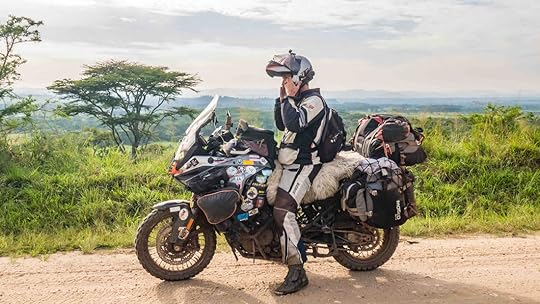 Almost exactly one year ago, we had just arrived in Uganda, and Tim and I began to realize that our traveling life as we knew it was going to change - and possibly come to a complete halt. It felt like every time we had access to internet and looked at our phones, the headlines were getting worse and worse. Airports were shutting down, country borders were closing, and cities were going into lockdown.
Almost exactly one year ago, we had just arrived in Uganda, and Tim and I began to realize that our traveling life as we knew it was going to change - and possibly come to a complete halt. It felt like every time we had access to internet and looked at our phones, the headlines were getting worse and worse. Airports were shutting down, country borders were closing, and cities were going into lockdown.
But luckily for us, nothing was locked down in Uganda yet, and most people were blissfully unaware of the storm clouds that were brewing on the horizon.
We were traveling with our American friend Leo, and had just spent the night in a hotel from hell (if you missed that story, check out last week's blog here). Needless to say, we hadn't gotten very much sleep, and had woken up early because we had a long day ahead of us - a ride through Queen Elizabeth National Park.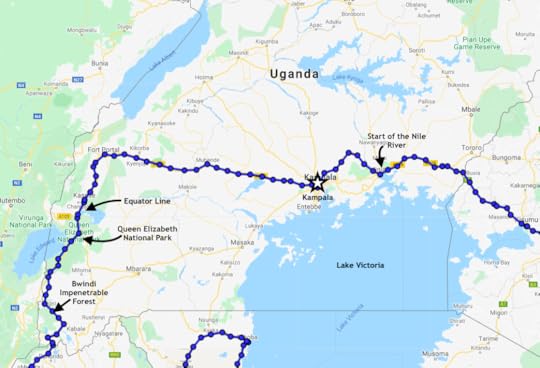 Uganda is very special in that motorcycles are allowed in all of its National Parks. Normally in Africa, this is not the case because... well, lions like to chase motorcycles. But somehow, the lions in Uganda are very shy. They are a unique type of lion locally known as "tree-dwelling lions" because they do like to spend a lot of time in trees.
Uganda is very special in that motorcycles are allowed in all of its National Parks. Normally in Africa, this is not the case because... well, lions like to chase motorcycles. But somehow, the lions in Uganda are very shy. They are a unique type of lion locally known as "tree-dwelling lions" because they do like to spend a lot of time in trees.
With the hopes of possibly seeing one of these lions, we entered Queen Elizabeth from the south, stopped for lunch at Lake Edward, and pretty much rode all the way through the park. And although we didn't see any lions, it was a gorgeous ride. We saw lots of monkeys, and we even caught sight of Uganda's national bird (it's on Uganda's flag) - the Grey Crowned Crane.
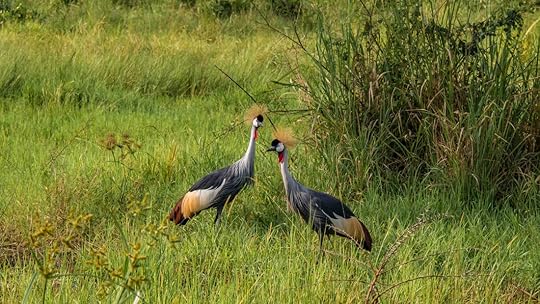 These are Grey Crowned Cranes. Beautiful.
These are Grey Crowned Cranes. Beautiful. 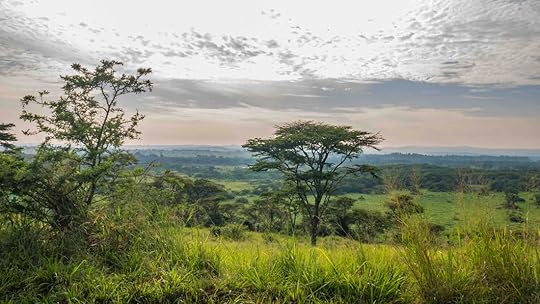 Queen Elizabeth NP is like a picture-perfect African savannah.
Queen Elizabeth NP is like a picture-perfect African savannah. 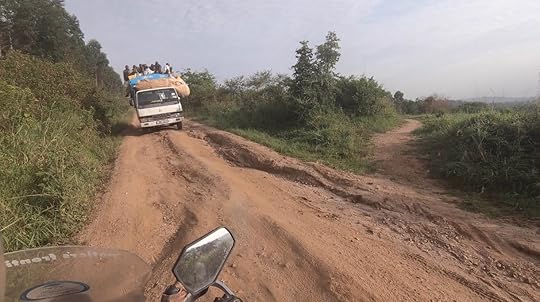 Some of the roads in Queen Elizabeth were pretty bad. Unfortunately, the previous night's lack of sleep was really taking a toll on Tim. The sun, the heat, the rutted, dusty roads, it was all causing him to feel light-headed and nauseous. So by the time we reached the equator line, he couldn't even pose for pictures. I knew we needed to get to a hotel (a NICE hotel), and we needed to get there fast.
Some of the roads in Queen Elizabeth were pretty bad. Unfortunately, the previous night's lack of sleep was really taking a toll on Tim. The sun, the heat, the rutted, dusty roads, it was all causing him to feel light-headed and nauseous. So by the time we reached the equator line, he couldn't even pose for pictures. I knew we needed to get to a hotel (a NICE hotel), and we needed to get there fast. 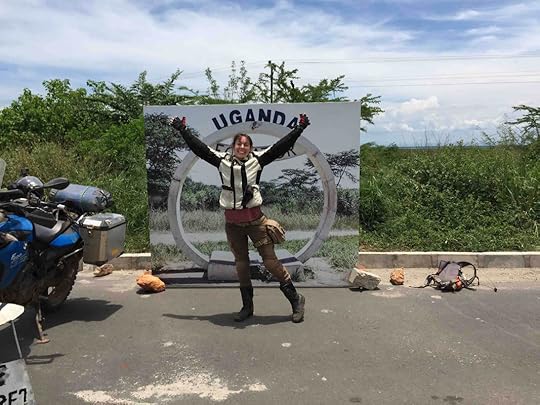 This is me at the equator line in front of a poster of the equator monument that is somewhere else entirely. This is like the "poor man's equatorial photo op". We found a place to stay that night in the town of Kasese, and after some water, food, and rest, Tim felt much better. But the news on our phones was getting worse. Countries all around us were reporting cases of Coronavirus, and borders were shutting down. We started to feel like we were being caged in, and there might not be any way out.
This is me at the equator line in front of a poster of the equator monument that is somewhere else entirely. This is like the "poor man's equatorial photo op". We found a place to stay that night in the town of Kasese, and after some water, food, and rest, Tim felt much better. But the news on our phones was getting worse. Countries all around us were reporting cases of Coronavirus, and borders were shutting down. We started to feel like we were being caged in, and there might not be any way out.
We knew that if we were going to get stuck somewhere, it should be in a city with amenities, close to airports for an emergency exit, and near to hospital care if need be.
So the next day, we headed off to Uganda's capital city, Kampala.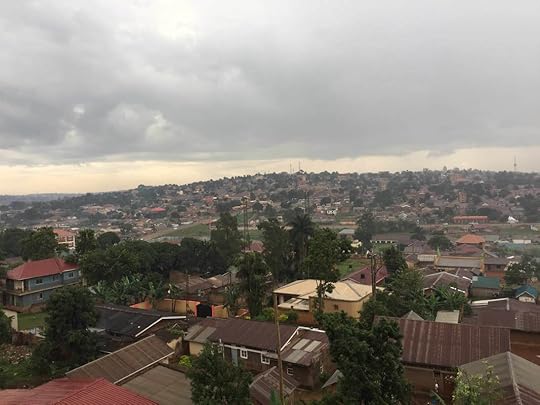 This is your typical view of Kampala - hilly, green, and always pleasant weather after the rains. We stayed at a hotel that was right next to "the best motorcycle mechanic in Uganda", according to the iOverlander app (it's true, Ibra is awesome!). And it was just by this strange coincidence that we ended up at the hotel that would become our home for the next seven months.
This is your typical view of Kampala - hilly, green, and always pleasant weather after the rains. We stayed at a hotel that was right next to "the best motorcycle mechanic in Uganda", according to the iOverlander app (it's true, Ibra is awesome!). And it was just by this strange coincidence that we ended up at the hotel that would become our home for the next seven months.
There were plenty of other international guests staying there, and some of them were even motorcycle travelers - Braden from Canada, and his Israeli companions Roy and Shahar. Actually, Tim ran into them at the mechanic shop, and since they didn't have plans on where to stay that night, he convinced them to lodge at the hotel with us. So with the addition of Lucy from the UK, that is how we all became a group of friends that we like to call the "Mother-Stuckers".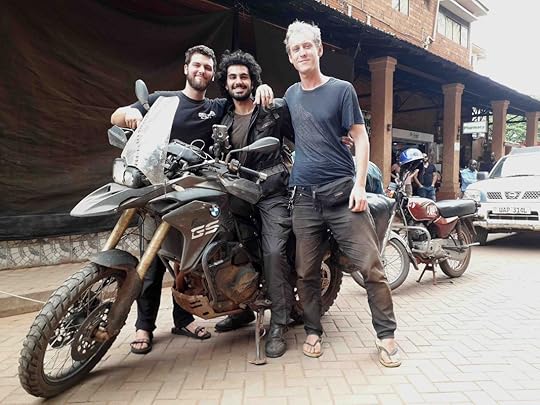 Left to right: Roy, Shahar, Braden.
Left to right: Roy, Shahar, Braden. 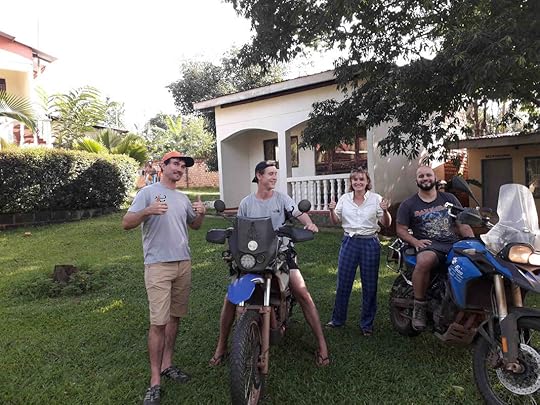 Tim, Braden, Lucy, Leo It didn't take long for the city to go under lockdown and for commercial flights to stop. All vehicles on the road were banned (only walking) and there were strict curfews. Masks became mandatory in all public areas. And because of these tight measures, I believe Uganda did an excellent job of slowing the spread of the virus.
Tim, Braden, Lucy, Leo It didn't take long for the city to go under lockdown and for commercial flights to stop. All vehicles on the road were banned (only walking) and there were strict curfews. Masks became mandatory in all public areas. And because of these tight measures, I believe Uganda did an excellent job of slowing the spread of the virus.
But we were officially stuck, and were hoping it was going to be more of a perfect-vacation-type-of-stuck than a Hotel-Rwanda-type-of-stuck. Thankfully, it was more of the former, because even though the world around us was coming undone, our little group of traveling friends living in a hotel together made it feel like home.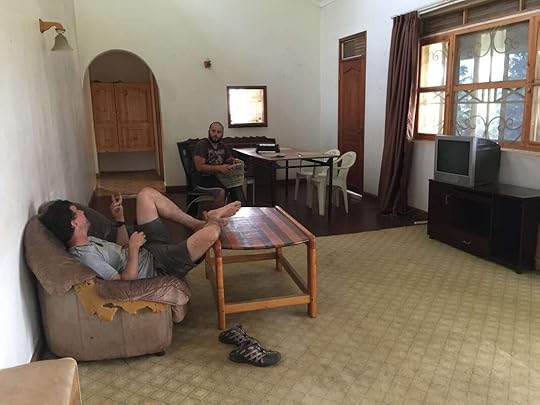 This was the house we rented. The couch and TV were a little dated, but we loved the place. Tim and Braden had "slow races" on their bikes (Braden kept winning), and since the hotel had a restaurant (with a wood-fire oven for homemade pizzas), a bar, and a pool hall, there wasn't ever a shortage of things to do. And we didn't feel stuck in a small space under lockdown.
This was the house we rented. The couch and TV were a little dated, but we loved the place. Tim and Braden had "slow races" on their bikes (Braden kept winning), and since the hotel had a restaurant (with a wood-fire oven for homemade pizzas), a bar, and a pool hall, there wasn't ever a shortage of things to do. And we didn't feel stuck in a small space under lockdown.
Tim and I rented a house connected to the hotel property, which had its own kitchen, and even had a resident monkey that came by to eat bananas. It was the best situation we could've asked for.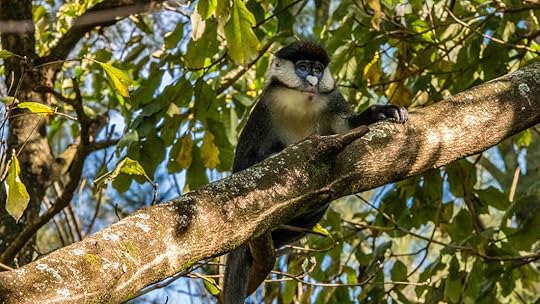 This was our monkey friend, Thomas.
This was our monkey friend, Thomas. 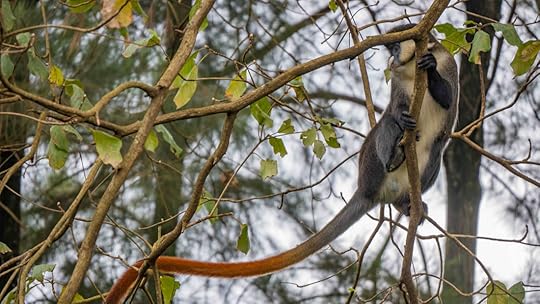 Thomas was a colorful monkey with a long red tail (and blue balls, what???). But it wasn't long before people started taking emergency flights out. First Shahar, then Roy (leaving their bikes), then Lucy. Finally, Leo and Braden left as well, until it was just Tim and I and the hotel staff.
Thomas was a colorful monkey with a long red tail (and blue balls, what???). But it wasn't long before people started taking emergency flights out. First Shahar, then Roy (leaving their bikes), then Lucy. Finally, Leo and Braden left as well, until it was just Tim and I and the hotel staff.
Seven months we stayed at that hotel. Until finally the borders opened again, and because our visa was expired, we moved east to live where we are now in Nanyuki, Kenya. Overall, I'm glad that we were able to make the best out of a terrible situation. Things are certainly far from going back to normal, and our prospects of doing any serious traveling is still very limited. Also, even though the vaccine rollout here in Kenya has begun, considering most wealthy countries have already bought up most of the world's vaccine supply, they are only expected to vaccinate just a third of the population in Kenya by 2023! That is certainly bad news for us.
Overall, I'm glad that we were able to make the best out of a terrible situation. Things are certainly far from going back to normal, and our prospects of doing any serious traveling is still very limited. Also, even though the vaccine rollout here in Kenya has begun, considering most wealthy countries have already bought up most of the world's vaccine supply, they are only expected to vaccinate just a third of the population in Kenya by 2023! That is certainly bad news for us.
So we don't know what lies ahead for us in the future, but looking back, I'm glad to say that so far, we've been very fortunate. And if we had to be locked down somewhere, where we ended up couldn't have been better. Subscribe to Our Blog I'll see you next week when I'll talk about our move from Uganda to Kenya, and what it's like to overland in Africa during a Pandemic.
 Almost exactly one year ago, we had just arrived in Uganda, and Tim and I began to realize that our traveling life as we knew it was going to change - and possibly come to a complete halt. It felt like every time we had access to internet and looked at our phones, the headlines were getting worse and worse. Airports were shutting down, country borders were closing, and cities were going into lockdown.
Almost exactly one year ago, we had just arrived in Uganda, and Tim and I began to realize that our traveling life as we knew it was going to change - and possibly come to a complete halt. It felt like every time we had access to internet and looked at our phones, the headlines were getting worse and worse. Airports were shutting down, country borders were closing, and cities were going into lockdown.But luckily for us, nothing was locked down in Uganda yet, and most people were blissfully unaware of the storm clouds that were brewing on the horizon.
We were traveling with our American friend Leo, and had just spent the night in a hotel from hell (if you missed that story, check out last week's blog here). Needless to say, we hadn't gotten very much sleep, and had woken up early because we had a long day ahead of us - a ride through Queen Elizabeth National Park.
 Uganda is very special in that motorcycles are allowed in all of its National Parks. Normally in Africa, this is not the case because... well, lions like to chase motorcycles. But somehow, the lions in Uganda are very shy. They are a unique type of lion locally known as "tree-dwelling lions" because they do like to spend a lot of time in trees.
Uganda is very special in that motorcycles are allowed in all of its National Parks. Normally in Africa, this is not the case because... well, lions like to chase motorcycles. But somehow, the lions in Uganda are very shy. They are a unique type of lion locally known as "tree-dwelling lions" because they do like to spend a lot of time in trees.With the hopes of possibly seeing one of these lions, we entered Queen Elizabeth from the south, stopped for lunch at Lake Edward, and pretty much rode all the way through the park. And although we didn't see any lions, it was a gorgeous ride. We saw lots of monkeys, and we even caught sight of Uganda's national bird (it's on Uganda's flag) - the Grey Crowned Crane.
 These are Grey Crowned Cranes. Beautiful.
These are Grey Crowned Cranes. Beautiful.  Queen Elizabeth NP is like a picture-perfect African savannah.
Queen Elizabeth NP is like a picture-perfect African savannah.  Some of the roads in Queen Elizabeth were pretty bad. Unfortunately, the previous night's lack of sleep was really taking a toll on Tim. The sun, the heat, the rutted, dusty roads, it was all causing him to feel light-headed and nauseous. So by the time we reached the equator line, he couldn't even pose for pictures. I knew we needed to get to a hotel (a NICE hotel), and we needed to get there fast.
Some of the roads in Queen Elizabeth were pretty bad. Unfortunately, the previous night's lack of sleep was really taking a toll on Tim. The sun, the heat, the rutted, dusty roads, it was all causing him to feel light-headed and nauseous. So by the time we reached the equator line, he couldn't even pose for pictures. I knew we needed to get to a hotel (a NICE hotel), and we needed to get there fast.  This is me at the equator line in front of a poster of the equator monument that is somewhere else entirely. This is like the "poor man's equatorial photo op". We found a place to stay that night in the town of Kasese, and after some water, food, and rest, Tim felt much better. But the news on our phones was getting worse. Countries all around us were reporting cases of Coronavirus, and borders were shutting down. We started to feel like we were being caged in, and there might not be any way out.
This is me at the equator line in front of a poster of the equator monument that is somewhere else entirely. This is like the "poor man's equatorial photo op". We found a place to stay that night in the town of Kasese, and after some water, food, and rest, Tim felt much better. But the news on our phones was getting worse. Countries all around us were reporting cases of Coronavirus, and borders were shutting down. We started to feel like we were being caged in, and there might not be any way out. We knew that if we were going to get stuck somewhere, it should be in a city with amenities, close to airports for an emergency exit, and near to hospital care if need be.
So the next day, we headed off to Uganda's capital city, Kampala.
 This is your typical view of Kampala - hilly, green, and always pleasant weather after the rains. We stayed at a hotel that was right next to "the best motorcycle mechanic in Uganda", according to the iOverlander app (it's true, Ibra is awesome!). And it was just by this strange coincidence that we ended up at the hotel that would become our home for the next seven months.
This is your typical view of Kampala - hilly, green, and always pleasant weather after the rains. We stayed at a hotel that was right next to "the best motorcycle mechanic in Uganda", according to the iOverlander app (it's true, Ibra is awesome!). And it was just by this strange coincidence that we ended up at the hotel that would become our home for the next seven months.There were plenty of other international guests staying there, and some of them were even motorcycle travelers - Braden from Canada, and his Israeli companions Roy and Shahar. Actually, Tim ran into them at the mechanic shop, and since they didn't have plans on where to stay that night, he convinced them to lodge at the hotel with us. So with the addition of Lucy from the UK, that is how we all became a group of friends that we like to call the "Mother-Stuckers".
 Left to right: Roy, Shahar, Braden.
Left to right: Roy, Shahar, Braden.  Tim, Braden, Lucy, Leo It didn't take long for the city to go under lockdown and for commercial flights to stop. All vehicles on the road were banned (only walking) and there were strict curfews. Masks became mandatory in all public areas. And because of these tight measures, I believe Uganda did an excellent job of slowing the spread of the virus.
Tim, Braden, Lucy, Leo It didn't take long for the city to go under lockdown and for commercial flights to stop. All vehicles on the road were banned (only walking) and there were strict curfews. Masks became mandatory in all public areas. And because of these tight measures, I believe Uganda did an excellent job of slowing the spread of the virus.But we were officially stuck, and were hoping it was going to be more of a perfect-vacation-type-of-stuck than a Hotel-Rwanda-type-of-stuck. Thankfully, it was more of the former, because even though the world around us was coming undone, our little group of traveling friends living in a hotel together made it feel like home.
 This was the house we rented. The couch and TV were a little dated, but we loved the place. Tim and Braden had "slow races" on their bikes (Braden kept winning), and since the hotel had a restaurant (with a wood-fire oven for homemade pizzas), a bar, and a pool hall, there wasn't ever a shortage of things to do. And we didn't feel stuck in a small space under lockdown.
This was the house we rented. The couch and TV were a little dated, but we loved the place. Tim and Braden had "slow races" on their bikes (Braden kept winning), and since the hotel had a restaurant (with a wood-fire oven for homemade pizzas), a bar, and a pool hall, there wasn't ever a shortage of things to do. And we didn't feel stuck in a small space under lockdown.Tim and I rented a house connected to the hotel property, which had its own kitchen, and even had a resident monkey that came by to eat bananas. It was the best situation we could've asked for.
 This was our monkey friend, Thomas.
This was our monkey friend, Thomas.  Thomas was a colorful monkey with a long red tail (and blue balls, what???). But it wasn't long before people started taking emergency flights out. First Shahar, then Roy (leaving their bikes), then Lucy. Finally, Leo and Braden left as well, until it was just Tim and I and the hotel staff.
Thomas was a colorful monkey with a long red tail (and blue balls, what???). But it wasn't long before people started taking emergency flights out. First Shahar, then Roy (leaving their bikes), then Lucy. Finally, Leo and Braden left as well, until it was just Tim and I and the hotel staff. Seven months we stayed at that hotel. Until finally the borders opened again, and because our visa was expired, we moved east to live where we are now in Nanyuki, Kenya.
 Overall, I'm glad that we were able to make the best out of a terrible situation. Things are certainly far from going back to normal, and our prospects of doing any serious traveling is still very limited. Also, even though the vaccine rollout here in Kenya has begun, considering most wealthy countries have already bought up most of the world's vaccine supply, they are only expected to vaccinate just a third of the population in Kenya by 2023! That is certainly bad news for us.
Overall, I'm glad that we were able to make the best out of a terrible situation. Things are certainly far from going back to normal, and our prospects of doing any serious traveling is still very limited. Also, even though the vaccine rollout here in Kenya has begun, considering most wealthy countries have already bought up most of the world's vaccine supply, they are only expected to vaccinate just a third of the population in Kenya by 2023! That is certainly bad news for us.So we don't know what lies ahead for us in the future, but looking back, I'm glad to say that so far, we've been very fortunate. And if we had to be locked down somewhere, where we ended up couldn't have been better. Subscribe to Our Blog I'll see you next week when I'll talk about our move from Uganda to Kenya, and what it's like to overland in Africa during a Pandemic.
Published on March 13, 2021 22:49
March 7, 2021
Entering Uganda - The Impenetrable Forest
By Marisa Notier The Notier Notes Our Sunday Scoop 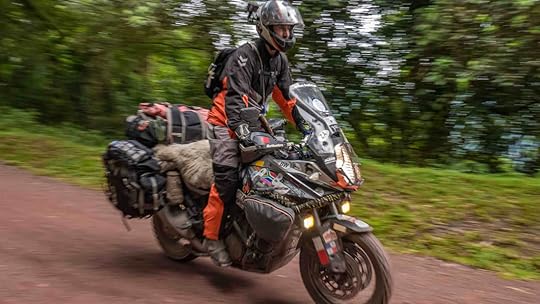 This week I'm taking us back into the past - to March 12, 2020 to be exact. It was one of the last days that borders were still open in Africa, but we didn't know it at the time. We were blissfully ignorant of what was to come.
This week I'm taking us back into the past - to March 12, 2020 to be exact. It was one of the last days that borders were still open in Africa, but we didn't know it at the time. We were blissfully ignorant of what was to come.
Tim and I were in Rwanda, planning to head north into Uganda the next day, and we were traveling with our American friend Leo (for a recap of what we did in Rwanda, check out this blog post).
We stayed the night in a bar called One Degree South on the shores of Lake Kivu. We hadn't originally planned on staying in a bar overnight, and had just stopped there for lunch, but after meeting Hicham, the charismatic restaurant owner who was Lebanese/American and grew up in the Central African Republic, we didn't want to leave. Hicham and his wife were fascinating people. She was from Michigan and did charity work every day across the border in the DRC, and so we spent the night entranced by all their incredible stories.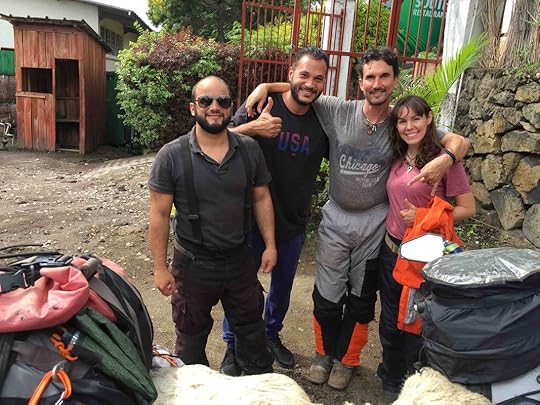 Leo, Hicham, Tim, and me (Marisa) The next day, we said our goodbyes and headed off to the border of Uganda. We passed by Volcanoes National Park, which is very aptly named due to its massive, conical volcanoes. And even though we got a little lost on a few backroads around the park, you really can't complain when you're lost in a place that has a backdrop like that.
Leo, Hicham, Tim, and me (Marisa) The next day, we said our goodbyes and headed off to the border of Uganda. We passed by Volcanoes National Park, which is very aptly named due to its massive, conical volcanoes. And even though we got a little lost on a few backroads around the park, you really can't complain when you're lost in a place that has a backdrop like that. 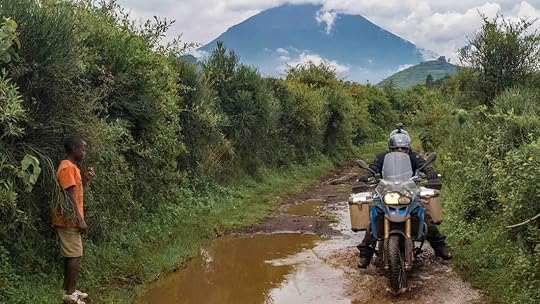 Leo getting through the mud near Volcanoes National Park, Rwanda. At the border, we got a text message from Hicham. He said that his wife had been told that her work would be suspended because the DRC had closed all its borders overnight after discovering a coronavirus case in Kinshasa.
Leo getting through the mud near Volcanoes National Park, Rwanda. At the border, we got a text message from Hicham. He said that his wife had been told that her work would be suspended because the DRC had closed all its borders overnight after discovering a coronavirus case in Kinshasa.
When we got this message, it was distressing to say the least. What was next? Closed airports, restaurants, businesses? Complete lock-downs? This was just the second case discovered in Sub-Saharan Africa, but I feared that if more countries got the virus, travel would be restricted, flights would be suspended, and the borders were going to close around us. And that was exactly what happened.
But at that moment, we were still in adventure-mode, and the virus still felt very far away. So as we made it across the border and into Uganda, we looked at the map, and noticed a nearby national park called Bwindi Impenetrable Forest. And we knew that we simply had to penetrate it. I mean, come on, you can't name a forest like that and expect us to stay away.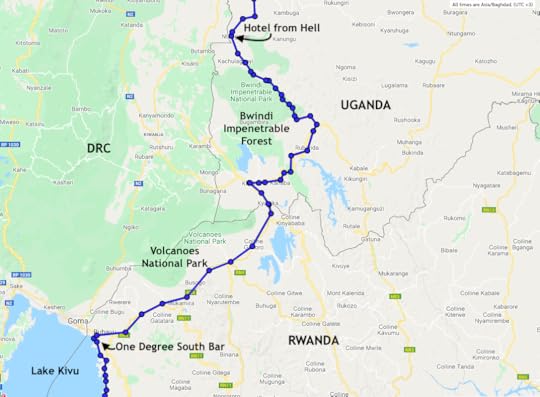 As we approached the turnoff to the one road that went through the forest, the dark clouds of a massive thunderstorm hovered over the jungle ahead of us like an ominous warning. In the other direction, the main road led to sunshine and green pastures. Why were we going into the Impenetrable Forest again?
As we approached the turnoff to the one road that went through the forest, the dark clouds of a massive thunderstorm hovered over the jungle ahead of us like an ominous warning. In the other direction, the main road led to sunshine and green pastures. Why were we going into the Impenetrable Forest again?
Of course, we took the little dirt road to Bwindi.
The wind picked up, the people in the villages started rushing home and heading for shelter, and I could feel the chills creep across my skin like I was entering Mordor from the Hobbit (or better yet, Mirkwood for all you Middle-Earth fans). Certainly, an evil sorcerer lived in these woods.
Maybe it was called the Impenetrable Forest for a reason.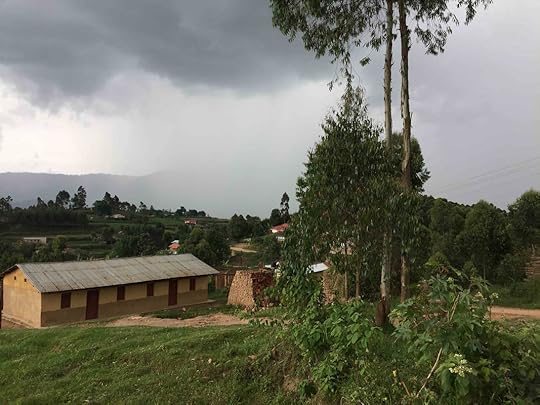 This was the beginning of the madness that engulfed the Impenetrable Forest ahead. The moment we entered the jungle, the rain started. Thunder roiled above us, darkness drenched the trees into shadows, and mist hung around us like spirits suspended in the air. The road hugged the mountains, and we twisted along it as we dodged puddles, rocks, and ravines of rushing water. It felt terrifying, and magical.
This was the beginning of the madness that engulfed the Impenetrable Forest ahead. The moment we entered the jungle, the rain started. Thunder roiled above us, darkness drenched the trees into shadows, and mist hung around us like spirits suspended in the air. The road hugged the mountains, and we twisted along it as we dodged puddles, rocks, and ravines of rushing water. It felt terrifying, and magical.
Actually, there are mysterious and ancient beasts that live in this forest. They're large, highly-intelligent, and powerful creatures that are the stuff of myths and legends - gorillas. Bwindi is one of the few places on earth that still support wild populations of gorillas, and although we didn't see any on our ride through, I thought I could feel their mighty presence like they were watching us through the trees.
That ride through the Impenetrable Forest was one that will always stay with me.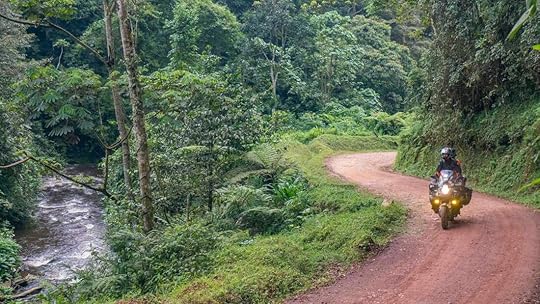 Once we got to the other side and left the forest behind, the sun came out, and rainbows arched over the hills in the distance. We had survived the forest's sorcery.
Once we got to the other side and left the forest behind, the sun came out, and rainbows arched over the hills in the distance. We had survived the forest's sorcery.
But because we had taken a road that no one really ever takes, we now found ourselves in an area of Uganda that never sees tourists. And there wasn't really a good town to stay at for the night. The only "hotel" we could find looked more a brothel, but we were so beat by the day's journey, that we were willing to take anything.
That may have been a bad choice.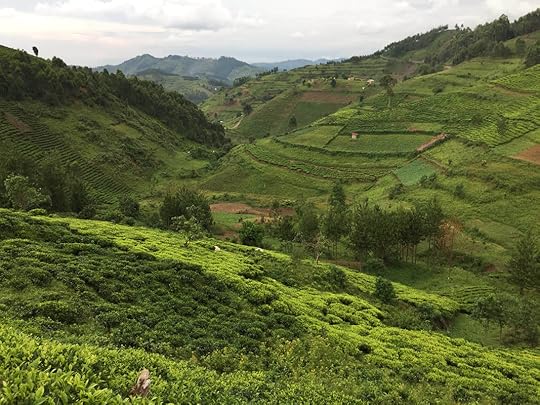 This was the view once we got out of the forest. The hotel room cost us $2 a night (probably twice the going rate for locals). We kept triple-checking this because we just couldn't believe it, but apparently, you get what you pay for. Not only was the damp, moldy, concrete room and spider-covered bed with no sheets pretty gross, but there was no running water in the place either. So the communal "bathroom" was just a couple of concrete stalls with holes in the ground that were covered in feces. The electricity was out that night (of course), and I remember going in with my headlamp to use the bathroom, and seeing such big cockroaches scuttling all over the place, that I simply decided to hold it.
This was the view once we got out of the forest. The hotel room cost us $2 a night (probably twice the going rate for locals). We kept triple-checking this because we just couldn't believe it, but apparently, you get what you pay for. Not only was the damp, moldy, concrete room and spider-covered bed with no sheets pretty gross, but there was no running water in the place either. So the communal "bathroom" was just a couple of concrete stalls with holes in the ground that were covered in feces. The electricity was out that night (of course), and I remember going in with my headlamp to use the bathroom, and seeing such big cockroaches scuttling all over the place, that I simply decided to hold it.
Gross.
And then the hotel bar had people shouting and partying to loud music all night... pretty terrible. But it didn't take long for us to realize that parts Uganda had a level of poverty that we hadn't seen in Rwanda. These people were working with what they had, and I was grateful that I could help support their business, even if it only was a few dollars. But most of all, I was also glad to get out of there.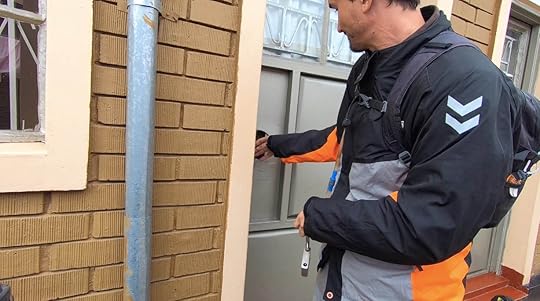 This hotel had one of the first "hole in the wall" doors we came across in Africa. The next morning, the three of us had to have a tough conversation - where do we go from here? And most importantly, if every country starts locking down around us, where do we want to get stuck? Do we want to fly home while we still can? Or stick it out? And if we do stick it out, do we want to stay in the countryside where we might have less exposure to the virus, or do we want the amenities of a big city?
This hotel had one of the first "hole in the wall" doors we came across in Africa. The next morning, the three of us had to have a tough conversation - where do we go from here? And most importantly, if every country starts locking down around us, where do we want to get stuck? Do we want to fly home while we still can? Or stick it out? And if we do stick it out, do we want to stay in the countryside where we might have less exposure to the virus, or do we want the amenities of a big city?
Obviously, we chose to stay in Africa, which turned out to be a decision that we haven't regretted at all. But it was not an easy one to make, and it would take us a couple more weeks before we had any real idea of how things were going to turn out for us.
Before all that, we made sure to get in one last adventure - a ride through Queen Elizabeth National Park in Uganda: the land of tree-dwelling lions. But that will be for next week's blog. Subscribe to Our Blog Stay safe everyone, and I hope to see you again next Sunday!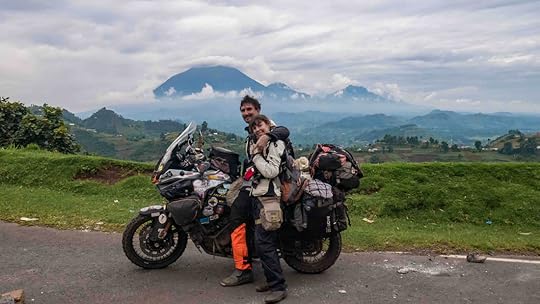 Tim and I outside of Volcanoes National Park.
Tim and I outside of Volcanoes National Park.
 This week I'm taking us back into the past - to March 12, 2020 to be exact. It was one of the last days that borders were still open in Africa, but we didn't know it at the time. We were blissfully ignorant of what was to come.
This week I'm taking us back into the past - to March 12, 2020 to be exact. It was one of the last days that borders were still open in Africa, but we didn't know it at the time. We were blissfully ignorant of what was to come.Tim and I were in Rwanda, planning to head north into Uganda the next day, and we were traveling with our American friend Leo (for a recap of what we did in Rwanda, check out this blog post).
We stayed the night in a bar called One Degree South on the shores of Lake Kivu. We hadn't originally planned on staying in a bar overnight, and had just stopped there for lunch, but after meeting Hicham, the charismatic restaurant owner who was Lebanese/American and grew up in the Central African Republic, we didn't want to leave. Hicham and his wife were fascinating people. She was from Michigan and did charity work every day across the border in the DRC, and so we spent the night entranced by all their incredible stories.
 Leo, Hicham, Tim, and me (Marisa) The next day, we said our goodbyes and headed off to the border of Uganda. We passed by Volcanoes National Park, which is very aptly named due to its massive, conical volcanoes. And even though we got a little lost on a few backroads around the park, you really can't complain when you're lost in a place that has a backdrop like that.
Leo, Hicham, Tim, and me (Marisa) The next day, we said our goodbyes and headed off to the border of Uganda. We passed by Volcanoes National Park, which is very aptly named due to its massive, conical volcanoes. And even though we got a little lost on a few backroads around the park, you really can't complain when you're lost in a place that has a backdrop like that.  Leo getting through the mud near Volcanoes National Park, Rwanda. At the border, we got a text message from Hicham. He said that his wife had been told that her work would be suspended because the DRC had closed all its borders overnight after discovering a coronavirus case in Kinshasa.
Leo getting through the mud near Volcanoes National Park, Rwanda. At the border, we got a text message from Hicham. He said that his wife had been told that her work would be suspended because the DRC had closed all its borders overnight after discovering a coronavirus case in Kinshasa.When we got this message, it was distressing to say the least. What was next? Closed airports, restaurants, businesses? Complete lock-downs? This was just the second case discovered in Sub-Saharan Africa, but I feared that if more countries got the virus, travel would be restricted, flights would be suspended, and the borders were going to close around us. And that was exactly what happened.
But at that moment, we were still in adventure-mode, and the virus still felt very far away. So as we made it across the border and into Uganda, we looked at the map, and noticed a nearby national park called Bwindi Impenetrable Forest. And we knew that we simply had to penetrate it. I mean, come on, you can't name a forest like that and expect us to stay away.
 As we approached the turnoff to the one road that went through the forest, the dark clouds of a massive thunderstorm hovered over the jungle ahead of us like an ominous warning. In the other direction, the main road led to sunshine and green pastures. Why were we going into the Impenetrable Forest again?
As we approached the turnoff to the one road that went through the forest, the dark clouds of a massive thunderstorm hovered over the jungle ahead of us like an ominous warning. In the other direction, the main road led to sunshine and green pastures. Why were we going into the Impenetrable Forest again?Of course, we took the little dirt road to Bwindi.
The wind picked up, the people in the villages started rushing home and heading for shelter, and I could feel the chills creep across my skin like I was entering Mordor from the Hobbit (or better yet, Mirkwood for all you Middle-Earth fans). Certainly, an evil sorcerer lived in these woods.
Maybe it was called the Impenetrable Forest for a reason.
 This was the beginning of the madness that engulfed the Impenetrable Forest ahead. The moment we entered the jungle, the rain started. Thunder roiled above us, darkness drenched the trees into shadows, and mist hung around us like spirits suspended in the air. The road hugged the mountains, and we twisted along it as we dodged puddles, rocks, and ravines of rushing water. It felt terrifying, and magical.
This was the beginning of the madness that engulfed the Impenetrable Forest ahead. The moment we entered the jungle, the rain started. Thunder roiled above us, darkness drenched the trees into shadows, and mist hung around us like spirits suspended in the air. The road hugged the mountains, and we twisted along it as we dodged puddles, rocks, and ravines of rushing water. It felt terrifying, and magical.Actually, there are mysterious and ancient beasts that live in this forest. They're large, highly-intelligent, and powerful creatures that are the stuff of myths and legends - gorillas. Bwindi is one of the few places on earth that still support wild populations of gorillas, and although we didn't see any on our ride through, I thought I could feel their mighty presence like they were watching us through the trees.
That ride through the Impenetrable Forest was one that will always stay with me.
 Once we got to the other side and left the forest behind, the sun came out, and rainbows arched over the hills in the distance. We had survived the forest's sorcery.
Once we got to the other side and left the forest behind, the sun came out, and rainbows arched over the hills in the distance. We had survived the forest's sorcery.But because we had taken a road that no one really ever takes, we now found ourselves in an area of Uganda that never sees tourists. And there wasn't really a good town to stay at for the night. The only "hotel" we could find looked more a brothel, but we were so beat by the day's journey, that we were willing to take anything.
That may have been a bad choice.
 This was the view once we got out of the forest. The hotel room cost us $2 a night (probably twice the going rate for locals). We kept triple-checking this because we just couldn't believe it, but apparently, you get what you pay for. Not only was the damp, moldy, concrete room and spider-covered bed with no sheets pretty gross, but there was no running water in the place either. So the communal "bathroom" was just a couple of concrete stalls with holes in the ground that were covered in feces. The electricity was out that night (of course), and I remember going in with my headlamp to use the bathroom, and seeing such big cockroaches scuttling all over the place, that I simply decided to hold it.
This was the view once we got out of the forest. The hotel room cost us $2 a night (probably twice the going rate for locals). We kept triple-checking this because we just couldn't believe it, but apparently, you get what you pay for. Not only was the damp, moldy, concrete room and spider-covered bed with no sheets pretty gross, but there was no running water in the place either. So the communal "bathroom" was just a couple of concrete stalls with holes in the ground that were covered in feces. The electricity was out that night (of course), and I remember going in with my headlamp to use the bathroom, and seeing such big cockroaches scuttling all over the place, that I simply decided to hold it.Gross.
And then the hotel bar had people shouting and partying to loud music all night... pretty terrible. But it didn't take long for us to realize that parts Uganda had a level of poverty that we hadn't seen in Rwanda. These people were working with what they had, and I was grateful that I could help support their business, even if it only was a few dollars. But most of all, I was also glad to get out of there.
 This hotel had one of the first "hole in the wall" doors we came across in Africa. The next morning, the three of us had to have a tough conversation - where do we go from here? And most importantly, if every country starts locking down around us, where do we want to get stuck? Do we want to fly home while we still can? Or stick it out? And if we do stick it out, do we want to stay in the countryside where we might have less exposure to the virus, or do we want the amenities of a big city?
This hotel had one of the first "hole in the wall" doors we came across in Africa. The next morning, the three of us had to have a tough conversation - where do we go from here? And most importantly, if every country starts locking down around us, where do we want to get stuck? Do we want to fly home while we still can? Or stick it out? And if we do stick it out, do we want to stay in the countryside where we might have less exposure to the virus, or do we want the amenities of a big city?Obviously, we chose to stay in Africa, which turned out to be a decision that we haven't regretted at all. But it was not an easy one to make, and it would take us a couple more weeks before we had any real idea of how things were going to turn out for us.
Before all that, we made sure to get in one last adventure - a ride through Queen Elizabeth National Park in Uganda: the land of tree-dwelling lions. But that will be for next week's blog. Subscribe to Our Blog Stay safe everyone, and I hope to see you again next Sunday!
 Tim and I outside of Volcanoes National Park.
Tim and I outside of Volcanoes National Park.
Published on March 07, 2021 02:20



